

Are You In?
Join our mailing list and receive the latest news and travel offers from our team. don’t worry, we hate spam as much as you do.
All About Money in Greece: Credit Cards, Banks, ATMs and Currency
- Last Updated on: Jan 20, 2024
- Read Time 13 mins
- Published: Feb 20, 2022
We Need Your Support!
We want to remind you that Athens by Locals is reader-supported. By booking tours, hotels, tickets, and other travel services through the links on our website, you can help us continue providing valuable content and information. Note that we receive a small commission only if you make a booking using our links at the time of your visit. So, if you're not quite ready to book yet, you can save this post and the links and return to make your booking when the time is right. We genuinely appreciate your support and are thrilled to have you in our travel community. Please don't hesitate to reach out if you have any questions or need assistance. Happy travels!
A basic understanding of how money in Greece works and how you can better handle your budget will inevitably be a crucial part of your trip to Athens.
This article gathers all the useful information you will need in one place for a trip without unpleasant surprises.
Below, you’ll find practical info on the currency of Greece, the use of credit and debit cards and ATMs, and a few tips for exchanging money while traveling to Athens.
Currency in Greece
The official currency of Greece has been the euro (€) since January 1st, 2002 when the country joined the Eurozone.
Thus, Greece shares a common currency with 19 out of 27 European Union member countries, meaning that you can use the same money while traveling throughout most of Europe.
The euro is issued in notes and coins. Specifically: 5, 10, 20, 50, 100, 200, and 500 euro notes (the last one being very rare) and coins of 1 and 2 euros as well as the denominations of 1, 2, 5, 10, 20, and 50 cents. Check the Euro rates here .
Do You Need to Use Cash in Greece?
Although the big cities of Greece are now considered cash-free, you should always have some cash with you in Greece. That’s because there are some cases such as less touristy places or street vendors who are rarely equipped with POS machines and getting paid only in cash.
But let us explain. Until recently, the everyday use of cash in Greece was very common in major cities and the more rural areas. However, in the past few years, this has drastically changed.
Now, the major cities of Greece like Athens and Thessaloniki are cash-free to a great extent, and the use of debit and credit cards is very widespread, especially at younger ages.

Almost all local businesses use point of sale (POS) machines for all kinds of cards – even street kiosks and small shops.
This has made traveling through Greece easier for visitors since you won’t always need to withdraw and carry around large sums of cash.
Still, there are a few reasons why we’d recommend having some cash with you.
Firstly, if you plan to visit less touristy places like the countryside or the Greek islands – on a one-day trip from Athens for example .
Secondly, you might want to visit a flea market or buy something from a street vendor downtown.
Street stalls are rarely equipped with POS machines. Plus, paying a street vendor with a card automatically means that you won’t be able to bargain for the price.
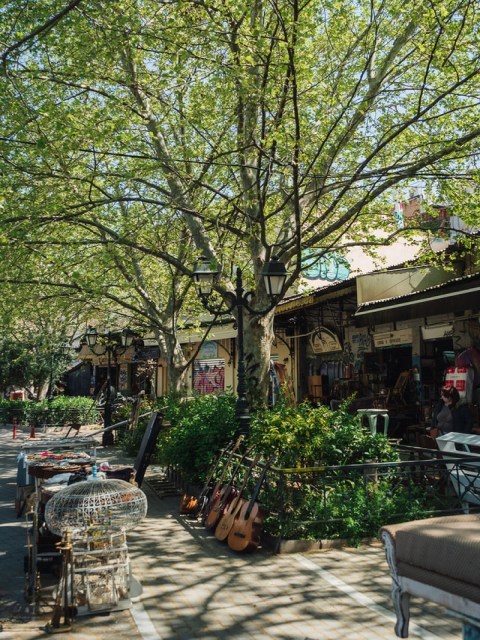
It’s also important to note that sometimes hotels will ask for payment in cash even though you have paid for an advance with a credit card online.
To avoid such misunderstandings, we recommend booking your stay through booking.com and have complete peace of mind.
Can you use US dollars in Greece?
No, you can’t use US dollars in Greece – or any other foreign currency. You must exchange your money for euros, withdraw some euros from an ATM, or use a credit or debit card. On the other hand, you can use Wise.com and enjoy the freedom of spending in local currency, saving on unnecessary charges that often accompany international transactions. Visit Wise.com now , and thank us later.
Currency Exchange in Greece
You can exchange foreign currency at all the Greek and foreign banks and at currency exchange bureaus, which you can find at the Athens International Airport , the port of Piraeus , and in the most popular areas downtown like Syntagma and Omonoia.
Keep in mind that you will need a passport to exchange cash and that the process may take longer than you would think if you choose to go to a local bank for the exchange.

Also, we suggest you ask for notes up to 50 euros as larger notes will be tough to use out on the street, especially at small shops.
Apart from banks and currency exchange bureaus, you can withdraw some money from any ATM and receive euros. This is probably the easiest and least expensive option.
You can find more information on using ATMs in Greece below.
Here are some other tips for exchanging currency in Greece:
- Make sure you know the average exchange rate before exchanging money. That way, you’ll always have a feel of your money’s worth and be able to immediately tell whether the rate you are getting is good without calculating fees.
- Avoid changing currency at airports, ports and major tourist areas. It’s a known fact that the rates at exchange desks in airports and tourist areas are often higher than the rates you can get through any of the other options mentioned above.
- When using an ATM to withdraw euros in Greece, always choose the options to be charged in the local currency. If you choose to pay the fee in a foreign currency, you’ll also pay an extra conversion fee at the local bank.
Use Wise.com : Wise is a money transfer company based in London that allows you to easily make international transfers and transactions at the international mid-market rate. No more financial surprises when you travel to Greece. Wise.com offers transparency and savings , making your trip a smooth and economical experience.
Where can you exchange currency in Athens?
If, for whatever reason, you would prefer to go to a local bank or currency exchange bureau to get cash rather than withdraw from an ATM, you’ll have plenty of options in the city center of Athens . Here are a few of them:
- Central Bank of Greece
- Address: 21 Panepistimiou Avenue, Syntagma, Athens, 10250
- Phone: 210 32 01 111
- National Bank of Greece
- Address: 2 Karageorgi Servias, Syntagma, Athens, 10562
- Phone: 210 33 48 015
OneExchange
- Address: 4 Karageorgi Servias, Syntagma, Athens, Attica, 10562
- Phone: 210 32 20 005
- Opening hours: 8 am to 9.30 pm weekdays, 9 am to 9.30 pm weekends
Argo Exchange
- Address: 10 Karageorgi Servias, Syntagma, Athens, Attica, 10562
- Phone: 210 32 39 659
- Opening hours: 8 am to 9 pm on weekdays, 9 am to 4 pm on Saturdays, closed on Sundays
Using ATMs to Withdraw Money in Greece
Using an ATM is probably the best way to get some cash in euros while traveling in Greece.
You will have no trouble finding an ATM in all of the popular neighborhoods of Athens in the city center and the suburbs.
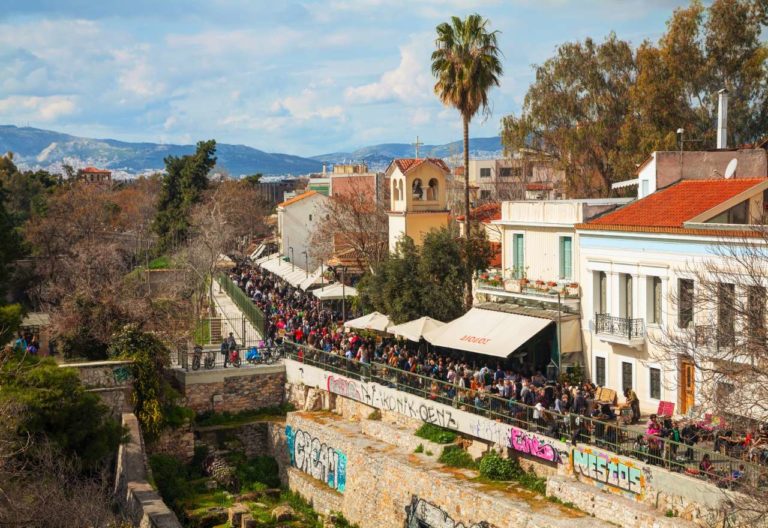
The Most Popular Neighborhoods to Visit in Athens [Greece]
A few typical places where you will spot ATMs are large squares, metro stations, supermarkets, shopping streets, and, of course, the airport and all the major ports of Athens.
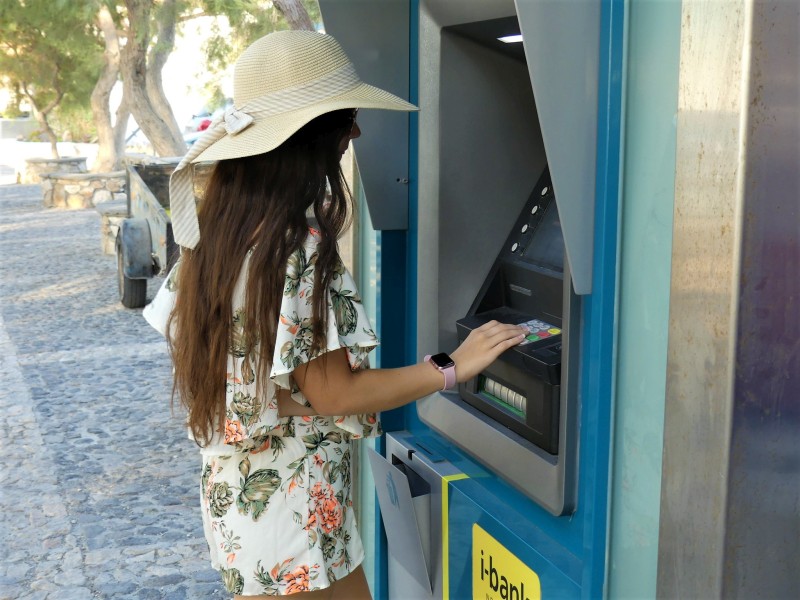
List with things you should know before using ATMs in Greece:
- In some cases, ATMs in Greece have a daily withdrawal limit (usually €600). This daily limit might also result from your bank’s regulations. It’s always a good idea to inform your bank back home that you are traveling before the trip.
- You will be required to pay a flat fee for using a foreign card unrelated to exchange rate fees. This fee typically ranges from 2 to 4 euros.
- You may notice two different exchange rates while using an ATM, depending on whether you want to pay fees in local or foreign currency. The former is, in most cases, the cheaper option.
- If you are traveling to a smaller town or island, make sure to carry some cash with you. ATMs in smaller places tend to run out of cash from time to time.
- Some ATMs won’t allow you to choose between a savings and a checking account. Make sure there is some money in both.
- ATMs in Greece only recognize PIN codes with up to 4 digits. Also, letters in PIN codes are not recognized at all. If your PIN code has letters or more than 4 digits, make sure to change it before leaving home.
- Most ATMs accept a wide range of cards, but it’s not uncommon for smaller places to only have one ATM – which might not accept yours if you’re unlucky. VISA and Mastercard are accepted at all ATMs, but you must check beforehand for American Express.
- In some tourist areas, you might notice ATMs that do not belong to any of the local banks. They are usually smaller than normal and are called “tourist ATMs”. These have significantly higher fees and worse exchange rates.
Wise is an international account for over 40 currencies, with instant, super-cheap money transfer, a card to spend in any currency, and bank details to get paid in 9 different currencies. Find out how to save some money
Using Credit Cards and Debit Cards in Greece
As mentioned above, using credit and debit cards is quickly becoming the norm in Greece. You’ll have no problem using a foreign card at hotels, shops, and supermarkets nationwide.
Yet, when it comes to small cafes and tavernas (especially in small places), you’ll need to ask beforehand if their POS is working and if they accept payment by card.
The most widely accepted cards are MasterCard and VISA.
You might have some trouble using a Diners Club or American Express credit card in certain places, as these mean a higher commission for local businesses.

According to local legislation, to use a credit card, you’ll have to have a chip-and-PIN card. If you don’t have one, you can request a PIN code from your bank a few weeks before leaving home.
When using a credit card, you can expect to pay a fee of about 3% (*read below) for every transaction to cover currency exchange.
In general, we’d suggest using a credit card for any purchases and payments and using a debit card for withdrawing cash – the credit card payments are not processed immediately, giving you time to dispute a transaction if needed.
We also strongly recommend getting in touch with your bank before leaving to inform them that you are traveling and to learn about their transaction and currency exchange fees and withdrawal limits to avoid having to worry about hidden fees while traveling.
Here’s what is happening with foreign transactions and why we strongly recommend you to use Wise.com : Traditional banks profit significantly from foreign transactions through hidden fees, currency exchange, and commission fees, totaling an extra 3, 4% or 5%. These fees are often undisclosed, masking the actual cost. Wise breaks away from this pattern. They don’t impose currency exchange fees or take a commission from currency exchanges. Instead, they only charge a nominal fee, usually just a few cents, to process the transaction. This means significant savings for you, whether conducting transactions overseas or depositing funds directly into foreign bank accounts. Visit Wise.com now and say goodbye to hidden fees, and hello to transparent, real exchange rates.
Contactless Payments
If you are using a contactless card, you will have no problem making contactless transactions throughout Greece.
Keep in mind, however, that there is a daily limit of €50 for contactless transactions. If you exceed this limit, you must insert your card into a POS and provide your PIN number.
Banks in Greece
There are several major banks in Greece. Most notably:
- Piraeus Bank
You can find branches of these banks in the city centers of all major cities. In Athens, you will find both bank branches and ATMs all over the city center in all the popular areas.
Banks are open from 8 am to 2 pm Monday to Friday, except on public holidays.
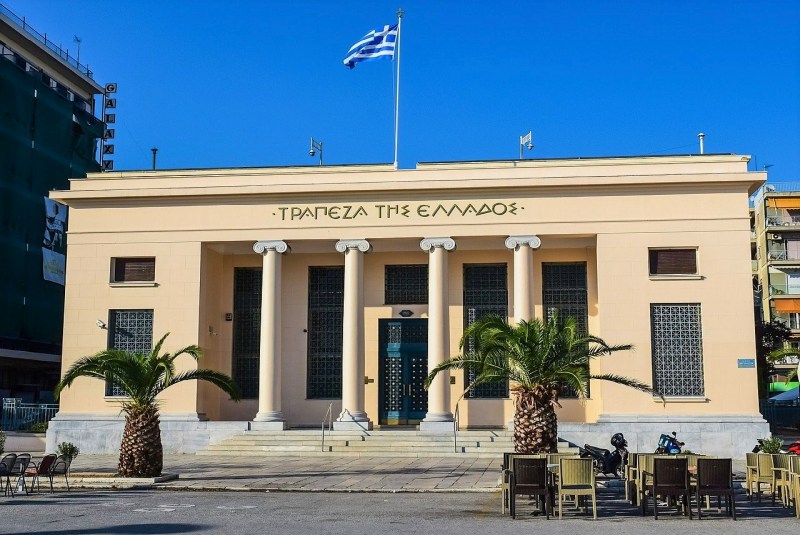
Can you open a bank account in Greece?
If you plan to visit Greece for a short vacation, you won’t be able -and definitely won’t need- to open a local bank account.
On the other hand, if you plan to spend a long time in Greece as a staycation or as a digital nomad, setting up a bank account might be preferable.
Using Traveler’s Checks (or Traveler’s Cheques)
Even though using credit and debit cards is quickly becoming the standard way of paying for international travel, some people still prefer using traveler’s checks.
Keep in mind that you will probably be able to use these checks in the tourist areas of Athens but if you try using one in an area that is not frequented by tourists or any place other than Athens you will find that most locals have no idea what they are.
If you are carrying traveler’s checks on your trip, we strongly advise that you exchange them for cash at a local bank. If you eventually use one, ensure you have your passport with you.
With Wise.com , there are no surprises in your financial itinerary. Navigate the charming streets of Athens without worrying about hidden charges – every euro stays where it belongs – in your pocket.
Using Personal Checks
Nowadays, the use of personal checks is very rare in Greece. You won’t be able to use personal checks at restaurants , hotels , or shops (except for rare occasions) or even exchange them for cash at a local bank.
Cost of Living
For you to be able to manage your budget for a trip to Athens or Greece, in general, more efficiently (and to have an idea of how much cash you’ll need to be carrying around with you), it’s essential that you have a general feel of how much things cost .
Below, you’ll find some indicative prices for everyday products and services.
- Single ticket for public transport (valid for all public means of transportation): €1.20
- Coffee at a cafe: €3.5- €5
- Souvlaki from €2.50
- Sandwich from €3.50
- Cinema tickets: €7-€10
- Theatre tickets: €25-€50
- 1/5 litre bottle of water: €0.50
- Beer at a bar: €3.50-€5
- Drink at a bar: €6-9
- Three-course meal at a mid-range restaurant: €25- €45
Frequently Asked Questions Regarding Money in Greece
Does greece still use euros.
Yes. Greece has been using the euro since 2002 as the official currency.
Did Greece almost leave the Euro?
Although heated debates regarding leaving the Eurozone took place in 2015, Greece never actually left the Eurozone.
What ATM to use in Greece for UK cards?
Your UK bank cards will work on all ATMs in Greece.
What is the best currency to use in Greece?
In Greece, you won’t be able to use any currency other than the euro.
Do Greeks prefer to use cash or cards?
Greeks prefer to use cash even though businesses are now required to accept cards.
Is Greece cheap or expensive?
Greece is still relatively cheap for international visitors. You’ll find that everyday life is quite inexpensive, especially food and transportation. Plus, if you book your hotel well in advance, you’ll be able to book your stay at a bargain.
How safe are ATMs in Greece?
ATMs in Greece are very safe and trustworthy. Still, we suggest you prefer to use ATMs that are adjacent to a bank and not standalone ATMs.
We hope that this guide has provided all you need to know about money in Greece and that you will have no trouble managing your budget while traveling throughout the country.
Make sure that you prepare accordingly before leaving home and rest assured that there will be no unpleasant surprises waiting for you on your trip.
A Quick Reminder:
Remember that Athens By Locals is here to guide you with planning the perfect trip to Athens and help you every step along the way. If you didn’t found what you’re looking for, or need any recommendations about your trip to Athens, feel free to contact us and we will do our best to help you. Please be as more detailed as possible regarding your subject so as to help you better.
If you like what you read please scroll down at the end of this page and subscribe to Athens By Locals so next time to receive more articles like this straight forward to your email. Join us on Facebook for comments, photos, and other fun stuff. If you enjoy this article please share it with your friends on Facebook.
Athens By Locals
THIS ARTICLE WAS WRITTEN/EDITED BY A TEAM MEMBER OF ATHENS BY LOCALS
Related Posts

Combined Ticket for the Acropolis & all the Archaeological Sites in Athens [Skip the Line with a Single Ticket]
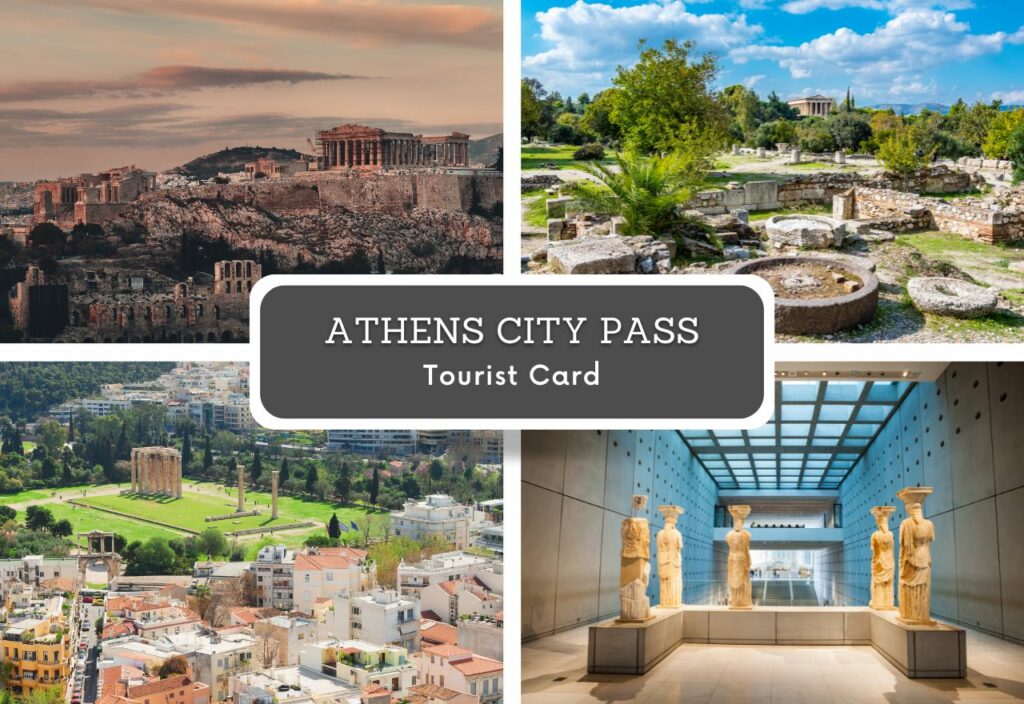
Athens Pass Tourist Card: Skip-the-Line Tickets for All the Must-See Attractions in Athens

Buying a SIM Card in Greece: Prepaid SIM Cards – Prices – Coverage – eSims and the Best Providers
Copyright © 2024 Athens By Locals © All rights reserved. No part of this site may be reproduced without our written permission. Images owned by Athens By Locals. Image Banks or Companies promoted.
- Destinations
- Travel Guides

Money in Greece: A traveller’s guide
)
Jo Williams
- Money in Greece
Greek currency: euros
Currency code: EUR
Greece used to be one of the most affordable destinations in Europe, but its popularity has seen prices rise in recent years. Tourist areas are now more comparable to countries like Italy or France than neighbouring Albania .
While things like food and transport remain affordable, accommodation and shopping can become expensive. In the summer months, deals are especially hard to come by, but there are still some easy ways to save money on a trip to Greece .
The best ways to pay in Greece
Cash is king in Greece, and it’s best to always have some Euros on you. On the mainland, paying with a card usually isn’t a problem, but on the islands you will often encounter issues with POS signal or ATM closures.
Greek businesses are technically required by law to have POS machines, but in reality, it's best to always to have cash as a backup.
ATMs and exchanging money in Greece
Exchanging money in greece.
As with anywhere in the world, airports offer the least favourable rate when changing money in Greece. But the exchange kiosks in Syntagma Square in Athens aren’t much better, stick to exchanging money in banks where possible.
Larger islands like Crete , Corfu, and Rhodes have multiple places to exchange money, but many smaller islands don't.
ATMs in Greece
It’s safer to withdraw money from inside a bank. The main providers in Greece are the National Bank of Greece, Eurobank, Piraeus Bank, and Alpha Bank. Avoid Euronet cash machines at all costs - they always have extortionate withdrawal fees.
It’s important to never accept the ATM’s exchange rate, always select “withdraw in local currency” to avoid high exchange rates. You can use a travel card, like Wise , to avoid high exchange rates from your own bank back home.
How to save money in Greece
While you can fly directly to islands with international airports, such as Crete , Mykonos, Rhodes and Santorini , one of the cheapest ways to get around Greece is by ferry. Island hopping by boat is a great way to save money on flights, but ferry prices can vary hugely depending on the speed. Book in advance and take a slower boat to save big - use Ferryhopper to compare all of the options.
Buying a filtered water bottle will save you money and reduce your impact on the environment as it replaces the need to buy plastic bottles of water. Grab lunch from one of Greece’s wonderful bakeries instead of going for a sit-down meal at a tourist restaurant to save even further. A visit to a traditional local bakery is an almost daily habit for every Greek, so it’s a good way to get to know the locals too.
Alcohol can be a big cost in Greece, especially on the islands. While you can get a carafe of wine in a restaurant in Poros for next to nothing, buying one drink in Mykonos could cost the whole day's budget. Bars on the busier islands overcharge for drinks, and bigger nightclubs have extortionate entry fees. When looking to save money in Greece, a soft drink or two can really tip the scales.
How to avoid common scams in Greece
While Greece is generally a safe country to visit, pickpocketing is an issue in Athens . Be especially vigilant at the airport, on the metro and on public buses, and around the Acropolis .
It’s common for restaurants in Greece to put bread on your table without it being ordered, but it isn’t generally free and is sometimes overpriced. Simply say no thanks, and they will take it back without charging you.
In some touristy areas, street sellers will approach restaurant tables with toys or other items - know that if you touch it you buy it. A firm no will be fine, and the restaurant staff are usually helpful in deterring sellers.
Taxis can be a source of overspending in many parts of the world, but they don’t have to be. In Greece, every taxi should have a metre. Ask if the metre is on and how long it will take, that way you can check on Google Maps and work out the price. When the driver sees this, it’s less likely that they will try to rip you off.
- VAT and tax refunds
The standard VAT rate is 24% in line with the EU. Greece has a great tax refund rate of up to 16.7% of the purchase amount (50 EUR minimum per receipt).
To get the refund, visit any Global Blue Refund Office in Greece. You will need to be a non-EU resident, be over 18 and have a validated Tax Free Form to get your refund.
- Helpful phrases
Poso (πόσο) – How much?
Den katalavaino (δεν καταλαβαίνω) – I do not understand
Voitheia (Βοήθεια) - Help!
Opa (Ωπα) - Oops!
Typical prices in Greece
A pre-booked ferry ticket between the islands - €20.
A ticket on the Athens metro - €1.20 or €4.50 for 24 hours.
A Greek coffee - €2.
A local beer - €4.
A gyros for lunch - €5.
An evening meal for two - €40.
Renting a beach lounger for the day - €10.
Planning a trip to Greece? Read our Greece travel guides
- Introduction
- Paying in Greece
- ATMs and exchanging money
- How to save money
- Avoiding common scams
- Typical prices
Share this article
)
Author - Jo Williams
Jo Williams is a freelance writer with 10 years' experience working in travel and tourism. A Brit who got fed up with the 9 to 5 corporate life, she sold everything to become a full-time wanderer.
Jo has travelled to over 70 countries and worked throughout Europe for a major tour operator. She hopes to inspire you to work less and travel more.
Last Updated 3 January 2024

Money in Greece: ATMs, Credit Card Payments, Cash

Key Takeaways
- Money in Greece is a significant factor you should consider when visiting the country.
- Greece uses the euro as its currency , and businesses only accept Euros for payment.
- It's a good idea to carry some Greece currency for cash transactions, especially in remote areas.
- The best way to get euros in Greece is via an ATM or to exchange American dollars for euros before arriving.
- Credit and debit cards are widely accepted in Greece , but it's important to be cautious of bank fees and to confirm that a business accepts cards before ordering.
Wherever you travel, you need money. When planning a trip to explore multiple islands and archaeological treasures or soak up the sun on a Mediterranean beach, you need to think about how you'll manage your money in Greece.
Our practical guide provides everything you need to know about money in Greece, so you can enjoy Greek culture without worrying about finances and focus on the many reasons to visit Greece , which are more than you'd expect.
Understanding Currency in Greece

Greece is a member of the European Union and thus uses the euro as currency . Euros come in both coins and paper currency, including:
- 1, 2, 5, 10, 20, and 50-cent Euro coins
- 5, 10, 20, 50, 100, and 200 Euro bills

Greek businesses only accept Euros for payment and will decline any foreign currency due to the foreign transaction fees. The law requires that businesses offer a point-of-sale device for cashless transactions, but the machines aren't always reliable in many areas (especially remote or rural spots). So it's a good idea to carry about 100 Euros of Greece currency to pay for a souvenir or a delicious Greek meal if need be.

The exchange rates for Greek currency constantly fluctuate, so check the rate before you withdraw money from your bank account and exchange currency.
The place where you exchange your own currency for Euros matters too. Please keep in mind that money exchanges in the airports, hotels, and exchange bureaus in tourist areas almost always have less favorable rates than ATMs, Greek banks, credit cards, or your national bank.
As a result, your bank account can potentially have a dent in it that won't be from your spending habits during your greek vacation but from Greece currency rate and bank fees.
Why You Should Avoid Exchanging Money in Greece

The best way to get Euros in Greece is via an ATM or to exchange American dollars for Euros before you arrive. The exchange rate is more favorable, and the process is more convenient.
It can take up to an hour or longer to exchange money at a Greek bank — time you would much rather spend exploring the Acropolis or taking a cultural tour.
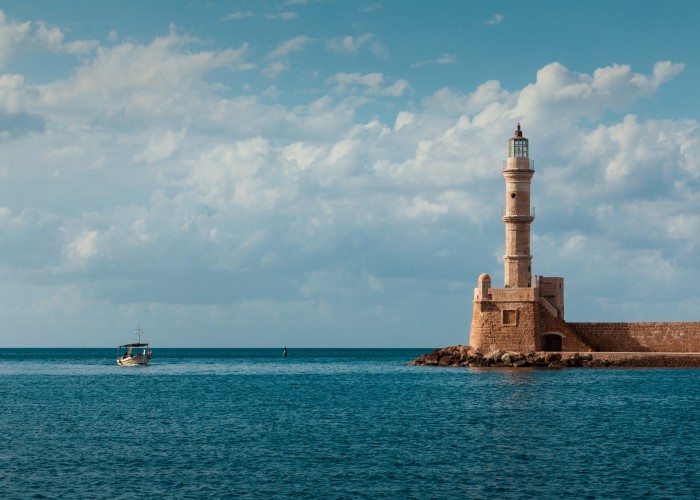
If you use currency exchanges in Greece, avoid accepting bills larger than 50 Euros. You may encounter hassles when using larger bills; some businesses cannot (or will not) provide change for large bills.
Paying With Credit or Debit Cards in Greece
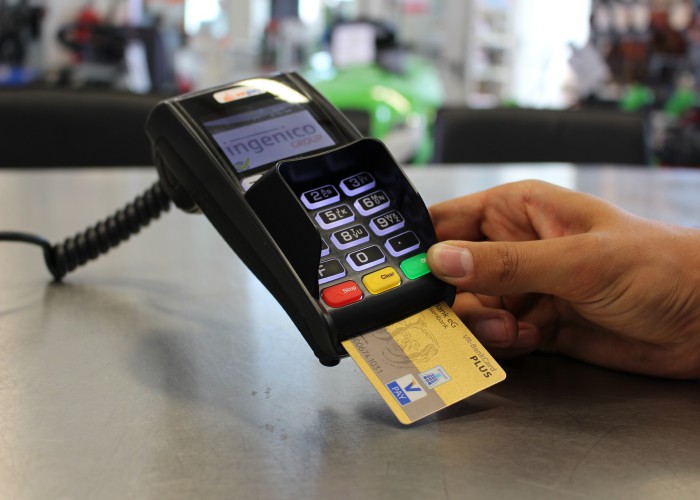
Many visitors opt to use a credit or debit card for travel money in Greece. In the past, finding businesses that accept credit cards was challenging, but the Greek government actively encouraged businesses to accept cards, so you no longer need to withdraw money. That, however, doesn't mean you shouldn't be cautious of bank fees.

You can expect most hotels, fuel stations, chain stores, and small businesses in cities to have a credit card machine and accept MasterCard and Visa.
Having a credit card machine does not mean a business will always use it, though. If you plan to use a card to pay for a meal in a bar or taverna, confirm they can take the card before you order. Broken or faulty machines are common in many places.

A credit card is a convenient way to make purchases without worrying about exchanging or withdrawing money, worrying about currency conversion fees, and carrying euro banknotes on you . The card issuer automatically converts the charge to American dollars, plus an exchange fee of up to 3%.
Some companies also charge a foreign transaction fee; consider using a credit card with travel benefits like no transaction fees, lower exchange rates, and travel assistance to save money and headaches.
How to Safely Use Credit Cards for Travel Money in Greece

Greek credit card machines use a chip and PIN system, like the rest of the EU. This means you must input a four-digit PIN to make a credit card purchase. If you don't have, or don't know, your credit card PIN, contact your card issuer before leaving for your trip and spending money.
It's a good idea to let your credit card company know about your travel plans before you leave the country. This way, you can avoid having transactions flagged for fraud or having your card frozen while you're away.
You can also get the most up-to-date information about transaction fees, currency exchange fees, and withdrawal limits.
Using ATMs in Greece
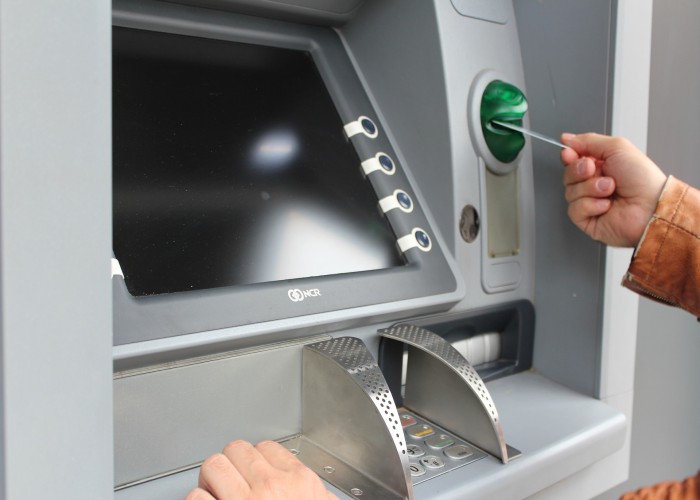
Using ATMs to withdraw Euros is another way to avoid the exorbitant currency exchange fees of many currency exchange offices, while there won't be any hidden credit card fees that will stop you from spending money to your heart's content.
Greek banks charge a transaction fee of a few Euros to use a foreign ATM card, but the cost is still less than a money exchange.
It's usually easy to find ATMs in Greece. Every populated area, especially tourist areas, has an ATM. You can typically find them in the following locations:
- Supermarkets
- Ferry stations
- Greek banks
- Metro stations
- Major tourist attractions

ATMs are the easiest way to get money in Greece, but keep these six tips in mind when using them:
- When you can pay the transaction fee in local or foreign currency, choose the local currency option, as this will be less expensive.
- Know your bank's withdrawal limits, so you do not try to take out more cash than allowed.
- Withdraw a few hundred Euros at a time to avoid paying too many transaction fees. Carry only what you need, and store the rest securely.
- Expect ATMs in remote areas like Peloponnese to run out of cash; make sure to have plenty of Euros on you when you visit.
- Check your bank account frequently. Greece is a safe country, but tourists can become fraud victims due to compromised ATMs. Call your bank to report any strange activity.
- Carry a backup card in case of a lost, stolen, or compromised card.
Making Cash Payments in Greece

Major tourist areas in Greece, like Athens and Thessaloniki, are mostly cash-free and will accept credit and debit cards and contactless payments. Plastic money is widely accepted in Greece, and the exchange rates are rather favorable.
Still, it would be best if you carried some cash, as many street vendors, artists, and small cafes only accept cash, while also cash is the preferred method of tipping in Greece .
You will also need cash if you're taking a tour of the Greek countryside or one of the more remote islands, which may not have ATMs or credit card point-of-sale machines.
Final Thoughts
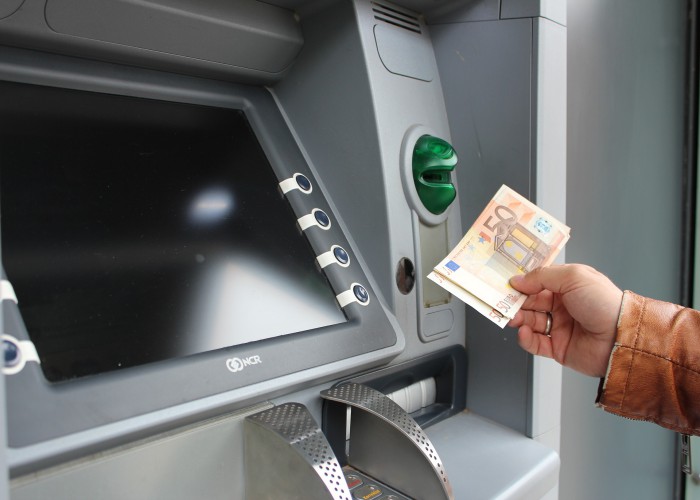
Greece is an incredible place to explore. Preparing yourself with multiple forms of travel money in Greece , both cash and credit and debit cards, ensures you can cover your excursions, meals, and purchases without hassles.
For more help planning an exciting Greek vacation , check out our Greece itineraries , or contact the travel professionals of Greeking.me at (518) 406-8975 for more information about unique tours, excursions, and experiences in the Greek Isles .
Frequently Asked Questions
What currency is used in greece.
Greece uses the Euro (€) as its official currency. It is advisable to exchange currency in advance or withdraw cash from ATMs, as credit cards are widely accepted in urban areas.
Are credit cards widely accepted in Greece?
Yes, credit and debit cards are commonly accepted in most urban areas, hotels, restaurants, and larger establishments. However, it's recommended to carry some cash for smaller establishments or in more remote areas.
Are there ATMs readily available in Greece?
Yes, ATMs are widely available in cities and popular tourist destinations. It's convenient to withdraw cash in Euros from ATMs, but it's advisable to check with your bank about international transaction fees.
What is the tipping etiquette in Greece?
Tipping is a common practice in Greece. In restaurants, leaving a tip of around 5-10% is appreciated, and rounding up the bill is customary. Tipping for good service is also common in cafes and bars and for taxi drivers.
Is bargaining acceptable in Greece?
Bargaining is not a common practice in most retail stores; however, it may be acceptable in markets and smaller shops. In tourist areas, prices are usually fixed, but a polite inquiry about discounts is generally fine.

- Argentina
- Australia
- Deutschland
- Magyarország
- Nederland
- New Zealand
- Österreich
- Singapore
- United Kingdom
- United States
- 繁體中文 (香港)
Currency in Greece - A Full Guide 2024

Planning a trip to Greece? Whether you’re heading there for work or pleasure, you’ll need to know how to pay your way as you travel.
This guide covers all you’ll need to know about the official currency in Greece, where to get it and how to keep your costs down during your trip.
What is the currency in Greece?
The official currency in Greece is the Euro, which is issued and overseen by the Bank of Greece. If you’re buying your travel money online you may also see the official code being shown - EUR. In stores and restaurants, Euro prices are likely to use the currency symbol €.
Once you’re in Greece you’ll see costs of items shown in EUR and you’ll need to start paying for things in local coins and notes which are often found in the following denominations:
banknotes - 5, 10, 20, 50, 100, 200, 500 EUR and coins - 1, 2, 5, 10, 20, 50 cents; 1, 2 EUR.
Can you officially pay in CAD when you are in Greece?
You’re unlikely to be able to officially transact in CAD in Greece, which is why it’s time to start getting used to EUR and learning more about the currency exchange rates so you’ll know what you’re spending on your trip.
This guide will walk through all you need to know, including Canadian dollar/Euro rates and where best to get your travel money from.
EUR coins and banknotes
Here’s a full rundown of the EUR coins and banknotes you’ll need to be familiar with when you’re in Greece.
History of Euro currency
The Euro (EUR) is the official currency of the Eurozone, which consists of 19 of the 27 European Union countries. It was introduced in 1999 as an accounting currency and launched as physical coins and banknotes in 2002. The euro is the second-most traded currency in the world and provides the benefits of removing exchange rate risk in the Eurozone.
Is CAD accepted in Greece?
As we’ve seen, the official currency in Greece is EUR. If you carry CAD with you on your trip, you’ll probably need to exchange it before you can spend.
Sometimes when you’re away on a trip abroad you’ll find that merchants will take payments in a selection of major foreign currencies. However, the chances are that where this is offered, you won’t get a good exchange rate for your CAD. Planning smart and convenient ways to spend in EUR when you’re away is likely to mean you save on costs in the end.
Usually, having a few different ways to pay and get cash is the best option for travelers and tourists. That’s because you’ll have a back up plan in case one payment method isn’t accepted for any reason, and you can pick the method that’s best suited to the specific transaction. Having a multi-currency card from a provider like Wise , plus your normal bank debit card, and some local cash in EUR should mean you’ve always got options. You can use your cash for small purchases and tipping, and make low cost payments and cash withdrawals with your multi-currency card, while keeping your bank card in reserve for emergencies.
Use a travel card on your next trip to Greece
Using a travel debit card in Greece is usually cheap, safe and convenient. A few providers in the UK offer multi-currency cards which come with a linked payment account that lets you convert, hold and spend in EUR. That allows you to add a balance in CAD and switch over to EUR to lock in the exchange rate and set your travel budget.
Once you have EUR in your account there are no extra fees to make payments, and you’ll not have foreign transaction charges to worry about, either.
Here’s a quick overview of a couple of handy travel debit cards you may want to order and use in Greece.
Wise travel card
Order a Wise travel card online or in the Wise app, to hold and exchange 40+ currencies and manage your money from your phone. You’ll be able to spend conveniently in EUR - and all currency exchange uses the mid-market rate with no markup.
Card holders get some free ATM withdrawals available every month, and there’s no annual or monthly fees to pay, and no minimum balance requirement.
Read a full Wise review here

What is the currency exchange rate for £ 1 CAD/EUR?
It’s helpful to get to know the live CAD/EUR rate so you can easily calculate how much things are costing you while you’re on your trip abroad. The rate you need to focus on is the mid market rate, which is the one banks and major currency services get when buying and selling currencies. This rate isn’t always passed on to customers. Instead you may find that the CAD/EUR rate you get when exchanging travel cash includes a markup - an extra fee.
Find the CAD/EUR mid-market rate from a currency conversion site or a website like this, so you can keep an eye on the market and compare the rates you’re offered as you travel against the mid-market rate easily.
Should I exchange CAD to EUR before traveling to Greece?
Because Greece sees many tourists from the UK every year you might find you’re better off if you exchange your currency when you get to Greece rather than worrying about getting your cash sorted out before you leave.
Get familiar with the exchange rates offered locally to you, and online, so you can decide whether it’s worth switching some funds in advance of travel, using a card to pay while you’re away, or converting cash on arrival. Both in the UK and in Greece, steer clear of exchanging currency at the airport. A captive market means that CAD/EUR rates are often worse in the airport than in city centers.
Tips for exchanging money in Greece
Cards are widely accepted in Greece, but you’ll still need to watch the exchange rate given when making a transaction from CAD to EUR. Some merchants offer to let you pay in CAD instead of EUR, but this will usually mean paying more because of dynamic currency conversion costs.
Best place to exchange currency in Greece
You can get your EUR in Greece in a couple of ways.
You’ll be able to use a travel debit card from a provider like [wise-affiliate-name-links] to make convenient payments and cash withdrawals and to convert funds online.
Or if you prefer an offline solution you can carry some cash in CAD to exchange when you arrive. Currency exchange providers are often in airports and hotels, although the exchange shops in a city center are likely to be cheaper overall.
How to pay in Greece?
You’ll need to have EUR to spend in Greece. However, generally having a few different payment methods is a good plan. That means that if a merchant won't accept one, you’ve got a back up. It’s also reassuring to know you have a different way to pay if you were unlucky enough to have a card or some travel cash stolen. Here are your key payment options in Greece.
1. Debit or credit card
Card payments can be helpful in shops, restaurants and hotels but there will be places where cash is also important. Order a travel card from a provider like Wise for cheap and fast transactions, including card payments and cash withdrawals as and when you need travel money in EUR.
2. EUR cash
Cash is widely used in Greece, so it’s worth having some with you at all times. You may want to exchange money to EUR before you leave, but it’s also usually convenient to make ATM withdrawals locally once you arrive in Greece.
You’ll usually find you can use a card to make payments in Greece, but carrying some cash in EUR is also reassuring. It’s often easier for tipping and making smaller purchases, plus you’ve got a nice backup if your card is ever out of action for some reason.
It’s a smart idea to have both a card and some cash in EUR when you’re in Greece. Some merchants will prefer cash, but having a card for higher value payments and in busier more tourist places is also convenient. Consider using a travel card from a provider like Wise alongside your cash for flexibility.
Paying for the trip in CAD
If you’re paying for things in Greece with a CAD bank card you might find a foreign transaction fee is added. This pushes up your costs when you spend in a foreign currency, and can be tricky to calculate.
Travel debit cards don’t always work this way. When you make purchases in Greece using the [wise-affiliate-name-links] card you can either choose to convert your account balance to EUR in advance in the Wise app, or just leave your balance in CAD and let the card handle the transaction when you pay. You’ll always get the lowest available fee and there are no extra foreign transaction charges.
Conclusion - Currency in Greece
You won’t be able to pay in CAD when you visit Greece - so learning about the currency you need is essential. Whether you decide to use a travel debit card from a service like [wise-affiliate-name-links], or stock up on EUR in cash in advance, knowing the mid-market exchange rate can help you get the best available deal. Use this guide to learn all you need to know about the options, rates and fees for exchanging CAD to EUR, and make your money go further while you’re away.
The official currency in Greece is EUR. You can’t usually pay in CAD in Greece, so you’ll need to plan in advance to get your travel money sorted. Consider ordering a travel debit card from a service like Wise, for low cost conversions to EUR and convenient spending and withdrawals - and remember that knowing the CAD to EUR mid-market exchange rate is essential to check you’re getting a fair deal on currency exchange.
FAQ - Currency in Greece
What is the currency in greece called.
The official currency in Greece is the Euro. You may also see the code EUR and the currency symbol €.
What's the currency in Athens?
The official currency in Athens is the Euro. You’ll only be able to spend in EUR while you’re there.
What is the old Greece currency?
Today the currency in Greece is the Euro. If you’re worried about currencies changing, why not get a travel debit card from a service like [wise-affiliate-name-links] which will automatically pick the currency needed in your destination when making a payment - with no penalties or inflated fees.
What is the best currency to take to Greece?
You’ll only be able to spend in EUR while you’re in Greece. Carrying some money in cash and using a travel debit card from a service like [wise-affiliate-name-links] is usually the best way to spend while you’re away from home.
Discover other currencies around the world
Nomadic Matt's Travel Site
Travel Better, Cheaper, Longer
Greece Travel Guide
Last Updated: March 12, 2024

It’s also super affordable.
You can travel around Greece for a fraction of what you’d spend in Western Europe, which is just one of the many reasons why I absolutely love visiting Greece.
I’ve been to Greece four times and have spent months exploring this country. I cannot say enough good things about it.
Visiting Greece is always the highlight of my summer European travels. There’s just something magical about this country. There’s an energy in the air and you can’t help but think, “Maybe I should never leave?” It sucks you in.
And, while the Greek islands get the most attention, the interior of the country — with its small towns, historic ruins, and mountain hikes — is too often overlooked and underappreciated.
So, while you may have a strong desire to stick to the islands, try to get to some of the places in the interior if you can. You won’t regret it.
This Greece travel guide combines all my knowledge and experience to help you plan an epic, affordable trip!
Table of Contents
- Things to See and Do
- Typical Costs
- Suggested Budget
- Money-Saving Tips
- Where to Stay
- How to Get Around
- How to Stay Safe
- Best Places to Book Your Trip
- Related Blogs on Greece
Click Here for Island and City Guides
Top 5 things to see and do in greece.

1. Visit the Acropolis
Located in Athens , this magnificent hilltop complex from the 5th century BCE includes ancient buildings and ruins like the temple to Athena and the famous Parthenon. A UNESCO World Heritage Site, this is an excellent place to learn about the city’s history. You’ll also get to enjoy an expansive view of the skyline and the nearby ruins. During the summer, it’s swarming with tourists so get there early. Admission is 20 EUR, or for 30 EUR you can get a 5-day combined ticket that includes many other archaeological sites in Athens. For a guided tour, Athens Walking Tours runs guided tours for around 50 EUR (including admission) that skip the line.
2. Discover historic Crete
Crete has a long, long history. It was once home to the ancient Minoan civilization (which predated Greek civilization), and you can still visit the Bronze Age ruins of Knossos, the ancient capital of the Minoan empire (also considered the oldest city in Europe). The island is the largest in all of Greece and has beautiful beaches (including a beach with pink sand), plentiful hiking, quaint towns, and delicious food and wine. It’s affordable and because of the island’s size, you can still escape the summer crowds. Don’t skip this island!
3. Hike up Mount Olympus
Mount Olympus is the legendary home of the Greek gods. Any climb to Mount Olympus starts from the town of Litochoro, 150 kilometers (93 miles) south of Thessaloniki. At 2,917 meters (9,570 feet) high, it’s the tallest mountain in Greece. The hike up is both strenuous and mystical. As you climb, it becomes abundantly clear why Greeks thought it was this mountain from which the gods ruled!
4. See Meteora’s monasteries
Meteora is famous for its monasteries that sit atop sheer rock mountains . They are a stunning sight to see and worth the steep trek up to the top. The monasteries date back to the 9th-10th centuries when Orthodox Christian hermit monks isolated themselves on the cliffs and in the many caves in the area. In the 12th century, the monastic community became more organized and in the 14th century the Great Meteoron Monastery was constructed (one of the ones that you can visit today). Although more than twenty monasteries used to perch on these sandstone cliffs, only six remain today. They are still active, with around 50 nuns and 17 monks living here. It’s a 3 EUR entrance fee per monastery.
5. Explore the islands
Other things to see and do in greece, 1. learn some history.
Greece is where western civilization began and everywhere you turn you’ll find ruins that are thousands of years old. Start in Athens with the museums, the Acropolis and surrounding ruins in the Agora, and then set off to explore the ruins of Delphi, Sparta , Corinth, and Crete . There are also great archaeological museums everywhere to see artifacts up close and learn even more. This country is a history lover’s dream!
2. Explore Sparta
Sparta was the ancient rival of Athens and known for its fierce warriors (the entertaining but historically-inaccurate film 300 was based on the Spartans). The city has a long history and plenty of ruins to explore. There is no shortage of things to do , museums to visit, excursions to take, and places to eat when you visit the city. It’s an often-overlooked city even though it’s only a 2.5-hour drive southwest of Athens. It’s a great place to learn some history without the crowds.
3. Attend the Athens Epidaurus Festival
Every summer, the Athens Epidaurus Festival hosts concerts and performance theater, including reenactments of famous Greek plays. Started in 1955, it’s one of the country’s top cultural events and runs for the whole summer (May-October). If it coincides with your visit, you’ll see just how proud the Greeks are of their past. Tickets for each performance cost as little as 10 EUR.
4. Soak up the sun in Corfu
The Cyclades Islands may get all the press but sunny Corfu on Greece’s west coast is also a good place to enjoy the beach too. It’s a popular destination for young backpackers, but once you get out of the main town, you can avoid them and their partying ways and get the island to yourself! There are plenty of quiet beaches, ancient ruins, and beautiful villages to explore. You’re just a stone’s throw away from Albania too.
5. Explore the Delphi Ruins
Delphi was a place of spiritual significance to the ancient Greeks. Located around 2.5 hours northwest of Athens, this UNESCO World Heritage Site is where the omniscient Oracle would contact the god Apollo and give his advice to those seeking good fortune. Although the eternal flame no longer burns inside the temple, a visit to the Temple of Apollo is obligatory if you’re nearby. Admission is 12 EUR and includes entry to the museum as well as the archaeological site itself (which includes far more than just the Temple of Apollo).
6. Explore Melissani Cave
This otherworldly cave grotto can be accessed by a short yet postcard-worthy boat tour. Located on the island of Kefalonia on the western side of Greece, here you can admire the seemingly magical ultramarine waters and the monumental walls that envelope you as you make your way through this hidden underground landscape. Admission is 8 EUR and includes the boat ride.
7. Hike the Samaria Gorge
Samaria Gorge in beautiful Crete is one of Greece’s National Parks and a UNESCO World Biosphere Reserve. For outdoor enthusiasts, this is considered one of the best hikes in Greece. While it isn’t the shortest or easiest trek (it’s 16 kilometers/10 miles), the gorge does promise beautiful landscapes, fantastic photo opportunities, and a great workout. Make sure you bring water, sunscreen, and a hat as the heat can be overwhelming. The views are worth it though!
8. Experience the Patras Carnival
Every year in mid-January, the city of Patras (located 2.5 hours west of Athens) hosts what is basically a month-and-a-half-long party that starts on January 17th and runs to the beginning of Lent. There’s a slew of events both major and minor, increasingly crazy weekends, treasure hunts, and various costume parades (which even feature floats). It’s a lively time and as the largest such festival in Greece, attracting tons of revelers. If you want to attend, it’s a good idea to make hotel reservations well in advance as things fill up.
9. Tour the Archaeological Museum of Heraklion
The number one attraction in Crete , this museum also happens to be Greece’s second-largest archaeological museum (the museum in Athens is the largest). There is a stunning collection here that highlights the Cretan civilization (dating back from Neolithic times through to the Roman empire), with ancient pottery, jewelry, sarcophagi, colorful frescoes from Knossos, and more. Its Minoan collection is the most extensive in the world. You could easily spend hours here — especially if you love history like me. Admission is 12 EUR in the summer and 6 EUR in the winter.
10. Party on Ios
Ios has the wildest nightlife out of all the Greek islands. It is the summer party island where days are spent hungover on the beach and the nights are spent eating cheap food and drinking. If you don’t want to do that but still want to see Ios, it’s best to go to the eastern part of the island where it’s quieter. Don’t let Ios’ party reputation deter you from visiting though, it’s a beautiful, rugged island (and home to the grave of Homer, who wrote The Iliad and The Odyssey). It’s only busy from June-August so you can visit in the shoulder season to escape the party crowd.
11. Visit Thessaloniki
With more than 1 million inhabitants, Thessaloniki is Greece’s second-largest city after Athens. Although it dates back to 315 BCE, a lot of the city was destroyed by fire in 1917 and then by bombing during World War II. The result is a combination of more modern European city urban planning alongside Early Christian, Roman, and Byzantine monuments. In fact, Thessaloniki has more UNESCO World Heritage Sites (15!) than any other city in Europe. Be sure to visit the White Tower, the Rotunda, the Arch of Galerius, and Galerius Palace as well as the many churches (such as the Hagia Sofia and Hagios Demetrios). There are also several great museums here, including the Archaeological Museum, the Museum of Byzantine Culture, the Jewish Museum, and the Olympic Museum.
12. Go to Zakynthos
Just south of Kefalonia in the Ionian Sea is Zakynthos , one of Greece’s most popular islands. With its soft, sandy beaches and charming villages, it’s easy to see why this island is a fan favorite. It can be busy, particularly in the summer, so head away from the main tourist area (go north, west or inland) or visit in the off-season to escape the crowds. Zakynthos is also a breeding area for loggerhead turtles and you can see them on Lagana Beach or on Turtle Island but take care to do so responsibly. Other activities include seeing the Blue Caves, Marathonisi Islet, and Shipwreck Beach (you’ll need to take a boat tour to get there). There are also tons of churches, monasteries, and ruins to check out too.
13. Visit Monemvasia
Monemvasia is a medieval castle town in Laconia, around 90 kilometers (56 miles) southeast of Sparta . It’s a spectacular island to visit as it is built into the side of a huge rock! Monemvasia’s a quiet town perfect for relaxing on the beach before dining under the stars at seaside taverns or on cobbled streets in the town. If you’re into hiking, there are some trails that will take you past chapels and settlements up to hilltops to admire the view or down to secluded beaches.
14. Explore Ioannina
Next to Lake Pamvotida in northwestern Greece, Ioannina is a castle town that is bursting with museums. Don’t miss the Byzantine Museum, the Ethnographic Museum, the Archaeological Museum, and the Silversmithing Museum (the area is well-known for its beautiful jewelry). Head to the castle at sunset for a peaceful end to your day. You can use the town as a base for exploring the nearby Pindus National Park, the Tzoumerka mountain chain, the Cave of Perama, and the Byzantine town of Arta as well. You won’t need more than a couple of days here but it is well worth stopping if you are passing through.
15. Go wine tasting
While Greece isn’t as internationally renowned for wine as other European countries such as France or Spain, it should be. The Greek wine-making tradition goes back at least 6,500 years and is still going strong. Wine regions are spread across the country, but Crete has one of the oldest wine-making traditions (and over 30 wineries to visit around the island), while the wineries of Santorini make for an interesting tour due to the way that grape vines must be grown here (to protect against harsh winds). Wine tours generally are around 85-125 EUR for a full-day tour.
16. Take a cooking class
Greek food is legendary. If you’re a foodie like me and want to learn more about the cuisine and culture behind it, try a cooking class . Bring a taste of your trip home by learning how to make some traditional recipes (including favorites like tzatziki and moussaka) while learning about the importance of each dish directly from a local chef. Cooking classes generally last 3-4 hours and cost 90-120 EUR.
17. Take a boat tour
A boat tour is one of the best ways to see the islands, especially as some beaches are only accessible by water. Most tours also have stops for snorkeling and lounging on the beach, and many include drinks and lunch. Half-day tours start at 50 EUR, while full-day tours are around 100 EUR.
18. Go diving
Diving has become increasingly popular in the Greek Islands. On Mykonos , Paradise Reef has a large variety of marine life, including sponges, barracuda, octopus, and starfish. Ios is popular with beginners due to its crystal-clear waters and relatively calm waves. On the other hand, Santorini has less marine life but tons of shipwrecks. Shore dives are generally 40-50 EUR, while a two-tank dive on a boat is 90-120 EUR. You can also take a beginner discovery course for 55 EUR or a variety of PADI courses starting at 280 EUR.
19. Tour an olive oil farm
For more information on specific destinations in Greece, check out these guides:
- Athens Travel Guide
- Corfu Travel Guide
- Crete Travel Guide
- Ios Travel Guide
- Mykonos Travel Guide
- Naxos Travel Guide
- Santorini Travel Guide
- Sparta Travel Guide
Greece Travel Costs
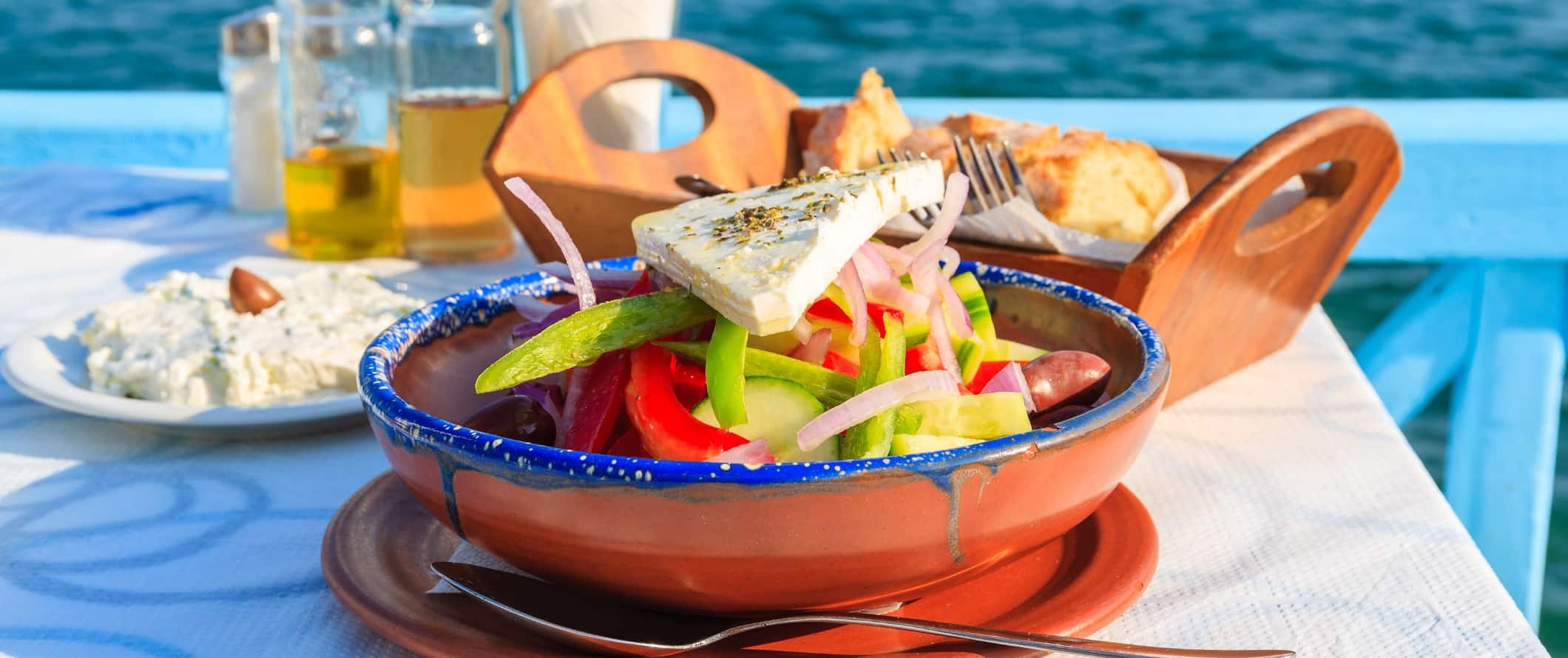
A room in a budget hotel that sleeps two can be found for 40-60 EUR (expect much higher prices — up to 50% higher — during the summer). Amenities at these hotels typically include free Wi-Fi, TV, a private bathroom, AC, and sometimes breakfast as well.
On Airbnb, you can find private rooms for 25-45 EUR in many cities and entire homes (including studio apartments) start at around 70 EUR per night.
Food – Greece is known for its food. Think seasonal vegetables (like olives), seafood, grilled meats, bread, feta cheese, and yogurt — all the staples of a fresh Mediterranean diet. To eat cheap, stick with eating gyros, souvlaki, and kebabs. These cost 2-5 EUR and easily fill you up. If you’re on a budget, you can live off these for as little as 10 EUR per day.
At a casual restaurant that serves traditional cuisine, expect to pay around 8-12 EUR for a main dish like moussaka and about 2-4 EUR for a glass of wine. A Greek salad costs between 6-8 EUR. Fish is more expensive, costing around 17-22 EUR for the catch-of-the-day.
Most restaurants charge for bread. The price is between .50-1.50 EUR. A bottle of water is about 2 EUR.
Fast food (think McDonald’s) costs around 7 EUR for a combo meal. A large pizza costs 8-10 EUR while Indian/Middle Eastern/Chinese food can be found for around 6 EUR for a main dish.
If you’re going out for dinner at a traditional taverna, expect to spend between 12-20 EUR depending on how much food you get. After that, the prices go up depending on how fancy the restaurant is!
Beer is 2-4 EUR while a latte/cappuccino is 3-4 EUR. Bottled water from the supermarket is 0.50 EUR.
If you cook your meals, expect to pay 30-50 EUR per week for groceries including pasta, vegetables, chicken, and other basic staples. It’s easy to eat on the cheap in Greece.
Backpacking Greece Suggested Budgets
If you’re backpacking Greece, my suggested budget is 40-60 EUR per day. This assumes you’re staying in a hostel, eating cheap food, cooking some of your meals, doing only free activities like hiking and relaxing on the beach, limiting your drinking, and using local transportation to get around. If you’re visiting the Greek islands or traveling during peak season, expect to spend on the higher amount of that. If you plan on drinking, add 5-15 EUR per day to your budget.
On a mid-range budget of 100-130 EUR per day, you can visit some museums and ruins, stay at a private hostel room or Airbnb, eat out more, enjoy some drinks, take the occasional taxi, and rent a bike or scooter to get around.
If you keep your drinking and costly activities down, you can easily do this closer to 100 EUR per day. On the other hand, if you’re staying on one of the more expensive islands like Mykonos or Santorini and drinking a lot, expect to spend closer to 150-180 EUR.
On a “luxury” budget of 235 EUR or more per day, you can stay in a hotel, eat out anywhere you want, drink as much as you want, do paid tours and more expensive activities (like diving), rent a car to get around, and generally enjoy the finer things in life! This is just the ground floor for luxury though. Expect to pay upwards of 50 EUR more per day on the islands.
You can use the chart below to get some idea of how much you need to budget daily, depending on your travel style. Keep in mind these are daily averages – some days you’ll spend more, some days you’ll spend less (you might spend less every day). We just want to give you a general idea of how to make your budget. Prices are in EUR.
Greece Travel Guide: Money-Saving Tips
Greece is affordable. Sure, islands like Santorini and Mykonos are expensive but, for the most part, if you are “keeping it local” you aren’t going to spend a lot of money here. Here are my favorite ways to save money when you travel to Greece:
- Use the Greek salad/bread rule – If the bread cover is .50 EUR or a Greek salad is less than 7 EUR, the restaurant is cheap. If the cover is around 1 EUR and a salad is 7-8.50 EUR, the prices are average. Anything more than that and the place is expensive. use this rule to figure out how to eat at cheap restaurants.
- Eat super cheap – Gyros and other street snacks only cost a few euros and can keep you full for 10 EUR per day if you’re on a tight budget.
- Rent a moped – It’s cheaper than a car and a fun way to see the various towns and cities — especially on the islands. You can usually rent a moped for around 15 EUR per day. Just drive carefully as Greek drivers tend to be aggressive.
- Get off the beaten path – Greece is a cheap country and even cheaper when you get away from the touristy islands or popular destinations. Head off the beaten path and you usually see prices drop by 30% or more.
- Book overnight ferries – Greece’s inter-island ferries can get expensive if you are visiting a lot of islands. Taking the overnight ferries can save you up to half off the normal price. Plus, it saves you a night of accommodation. Moreover, if you book the ferries around two months in advance, you can save up to 25% off the cost of your ticket.
- Get a ferry pass – Eurail has a ferry pass that has 4- and 6-trip options. The only caveat is that you can only take Blue Star and Hellenic Seaways ferries. Those tend to be the larger, slower ferries and, depending on the islands, might require you to connect somewhere. You’ll need to research routes in advance to see if the pass is worth it. I would search routes on FerryHopper to see if it works for you. You can purchase your pass on Eurail (non-EU residents) or Interrail (EU residents).
- Take public transportation – Buses, while sometimes running on inconvenient schedules, are the best way to get around Greece. Taxis are very expensive so minimize their use whenever you can and stick with the buses.
- Visit in the off-season – July and August are the most expensive months, so skip the middle of summer if you’re on a budget. Prices will be significantly cheaper.
- Stay with a local – Couchsurfing is a great way to get a free place to stay and meet locals. There are a ton of hosts throughout the country (I stayed with one in Athens) and it’s my favorite way to get to know the “real” Greece.
- Buy wine at the store – You can buy a great bottle of wine for around 4 EUR at the store. It’s a lot cheaper than drinking at the bar.
- Have an ISIC Card – To save on the cost of admission to museums and other tourist attractions, be sure to present a valid student card. The ISIC is typically accepted in places where a foreign student ID is not.
- Go to museums on their free admission days – Most museums have some days when admission is free. Check the Odysseus Culture website for details as they vary from museum to museum.
- Get combined tickets – Historical attractions in Greece are often priced so that it’s always a better deal to buy a combined ticket. If the sites you are going to offer one, buy it. It will save you money.
- Use points if you can – If you have points that can be used for cash, using them to book accommodation can save you a ton of money. This post has more information on how to start collecting and using points and miles
- Rent a car – Car rentals can be incredibly cheap in Greece. Prices start at just 20 EUR per day when booked in advance. Drivers need to be at least 21 and have had their license for one year. An International Driving Permit is also required.
- Bring a water bottle – The tap water here is generally safe to drink so bring a reusable water bottle to save money and reduce your plastic use. LifeStraw is my go-to brand as their bottles have built-in filters to ensure your water is always clean and safe.
Where to Stay in Greece
Greece has something for everything and you can often find small family-run operations on the islands. It’s not hard to even find budget accommodations with nice extra like pools either! Here are my suggested places to stay in Greece:
- Selina (Athens)
- Athens Hawks Hostel (Athens)
- BedBox (Athens)
- Athens Hub (Athens)
- Studio Eleni (Mykonos)
- Caveland (Santorini)
- Fira’s Backpacker Place (Santorini)
- Bedspot Hostel (Santorini)
- Asterolithos Hotel (Santorini)
- Youth Hostel Plakias (Crete)
- Rethymno Youth Hostel (Crete)
- Cocoon City (Crete)
- Intra Muros (Crete)
- The Pink Palace (Corfu)
- Angelica’s Backpacker’s Hostel (Corfu)
- Francesco’s (Ios)
- FarOut Beach Club (Ios)
- FarOut Camping (Ios)
- Castle View Camping and Bungalows (Sparta)
- Lakonia Hotel (Sparta)
How to Get Around Greece
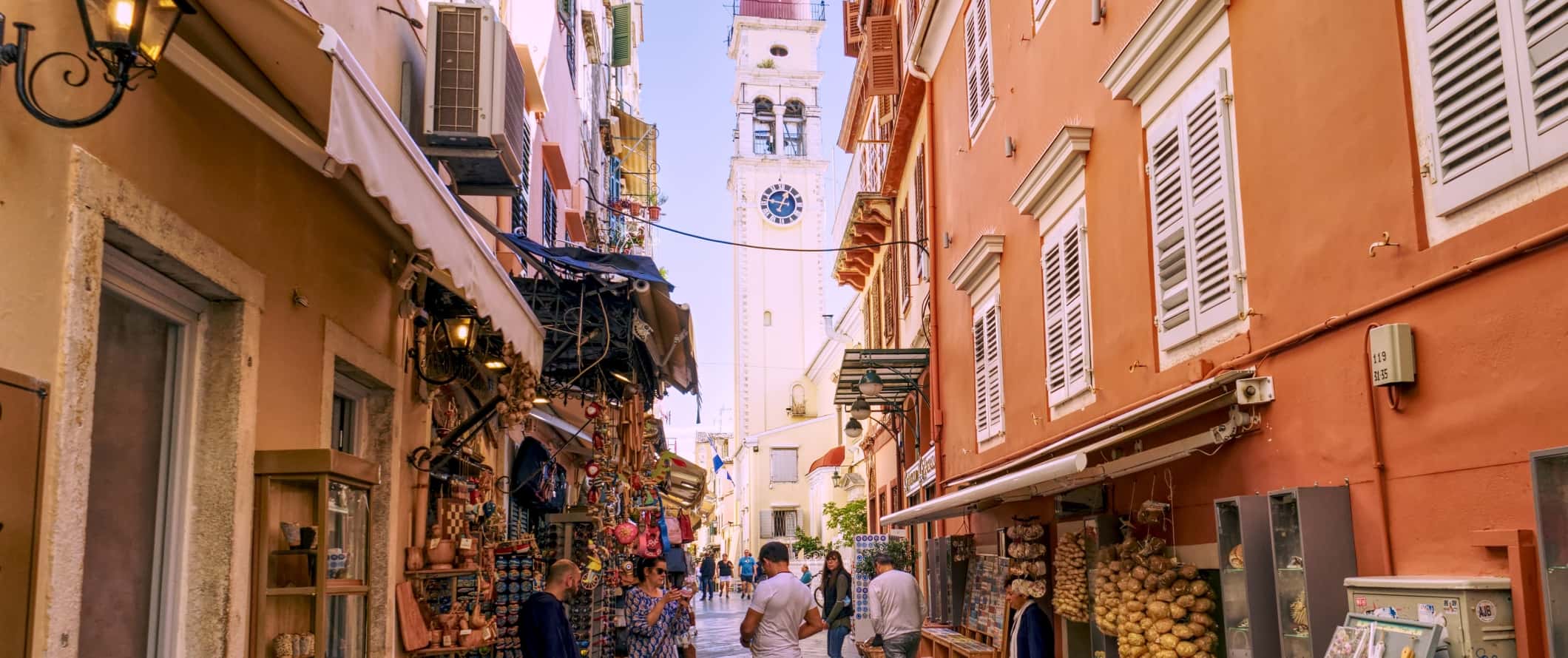
Buses – KTEL is the main bus operator in Greece. You can look up schedules and prices online, but their website is pretty outdated and you’re better off booking tickets at the actual bus station. Getting from Athens to Sparta takes around 3.5 hours and costs around 20 EUR, while Athens to Thessaloniki takes around 5.5 hours and costs around 35 EUR. Thessaloniki to Ioannina takes 3.5 hours and is just 13 EUR.
Trains – Train travel in Greece isn’t great. Trains are unreliable and slow and there are only a few routes in the country between Athens and other major cities, like Thessaloniki and Patras. You’re better off driving or taking the bus. However, if you do get the train, a trip from Athens to Thessaloniki takes about 4.5 hours and costs at least 20 EUR.
Ferries – Because Greece has a lot of islands, you have to deal with taking ferries to get around. Expect to spend an average of 35 EUR per trip, though you could spend as little as 12 EUR if the islands are really close together. From Athens, most ferries to the Cyclades cost around 70 EUR.
Taking the overnight ferries can save you up to half off the normal price plus save you a night of accommodation so if you’re not in a rush, book those!
There are many different ferry companies, and most are created equal. High speed ferries or catamarans cost a lot more (book in advance). You can research routes and ticket prices using FerryHopper and gtp.gr .
If you’re ok traveling on the slower ferries and your routes match the available routes, the Eurail/Interrail ferry pass is worth considering as you’ll get discounts with this pass. Search routes on FerryHopper to see if it works for you.
Flying – Flying is a quick and affordable way to get around Greece and between islands (though not all islands have airports). A one-way flight from Athens to Santorini or Mykonos takes less than one hour and costs around 25-35 EUR. Flights can dip to as little as 10 EUR when booked in advance.
Scooter/Quad rentals – Renting a scooter or ATV is a really popular way to discover many parts of Greece, particularly the islands. It lets you explore at your own pace and is quite affordable. Scooter rentals cost between 15-25 EUR per day depending on the location and if it is peak season or off-season. ATVs cost around 30-45 EUR per day.
Car rental – Car rentals here are super affordable, starting at just 20 EUR per day for a multi-day rental. Expect manual transmissions. Drivers need an International Driving Permit before renting as well and need to be at least 21 years old. For the best rental car deals, use Discover Cars
When to Go to Greece
Peak season in Greece is from June-August. Temperatures hover around 33°C (92°F) and popular destinations like Santorini and Mykonos experience a huge influx of visitors. Prices increase during this time as well. But the overall atmosphere and weather are great during this time, so it’s still worth visiting during peak season.
Personally, I think the best time to visit Greece is shoulder season (March-May and September-October). It’s still warm during these times but there aren’t as many crowds and prices are cheaper. It’s also easier to meet locals during this time. Overall, it’s a particularly great time to hang out in the Mediterranean.
Winter is from November to February. It gets cold and tourist crowds thin out considerably. Temperatures vary quite a bit from north to south, with it sometimes dropping to 11°C (52°F) in some places (Athens sometimes gets snow). Many of the islands — particularly Santorini and Mykonos — almost shut down entirely during the off-season. In short, I’d skip a winter visit unless you’re only planning to visit museums.
How to Stay Safe in Greece
Greece is very safe for backpacking and solo travel. Violent attacks are uncommon. Petty crime is about the worst that could happen to you, specifically pickpocketing in Athens, where it is prevalent. Fortunately, Greek police have really cracked down on perpetrators. Nevertheless, be aware of your surroundings and keep your valuables out of sight when you’re in markets, on busy streets, or when using public transportation.
Solo female travelers should generally feel safe here, however, the standard precautions apply (never leave your drink unattended at the bar, never walk home alone intoxicated, etc.).
You won’t find a lot of travel scams in the country but read this article on common travel scams to avoid if you’re worried about getting ripped off.
If you go out hiking, always check the weather first. Bring sunscreen, water, and a hat. It can get incredibly hot here!
Be careful when driving as Greek drivers tend to be on the aggressive side and some of the roads aren’t very well maintained.
If you experience an emergency, dial 112 for assistance.
Always trust your gut instinct. Make copies of your personal documents, including your passport and ID. Forward your itinerary along to loved ones so they know where you are.
The most important piece of advice I can offer is to purchase good travel insurance. Travel insurance protects you against illness, injury, theft, and cancellations. It’s comprehensive protection in case anything goes wrong. I never go on a trip without it as I’ve had to use it many times in the past. You can use the widget below to find the policy right for you:
Greece Travel Guide: The Best Booking Resources
These are my favorite companies to use when I travel. They consistently have the best deals, offer world-class customer service and great value, and overall, are better than their competitors. They are the companies I use the most and are always the starting point in my search for travel deals.
- Skyscanner – Skyscanner is my favorite flight search engine. They search small websites and budget airlines that larger search sites tend to miss. They are hands down the number one place to start.
- Hostelworld – This is the best hostel accommodation site out there with the largest inventory, best search interface, and widest availability.
- Booking.com – The best all around booking site that constantly provides the cheapest and lowest rates. They have the widest selection of budget accommodation. In all my tests, they’ve always had the cheapest rates out of all the booking websites.
- HostelPass – This new card gives you up to 20% off hostels throughout Europe. It’s a great way to save money. They’re constantly adding new hostels too. I’ve always wanted something like this and glad it finallt exists.
- Get Your Guide – Get Your Guide is a huge online marketplace for tours and excursions. They have tons of tour options available in cities all around the world, including everything from cooking classes, walking tours, street art lessons, and more!
- The Man in Seat 61 – This website is the ultimate guide to train travel anywhere in the world. They have the most comprehensive information on routes, times, prices, and train conditions. If you are planning a long train journey or some epic train trip, consult this site.
- Rome2Rio – This website allows you to see how to get from point A to point B the best and cheapest way possible. It will give you all the bus, train, plane, or boat routes that can get you there as well as how much they cost.
- FlixBus – Flixbus has routes between 20 European countries with prices starting as low 5 EUR! Their buses include WiFi, electrical outlets, a free checked bag.
- SafetyWing – Safety Wing offers convenient and affordable plans tailored to digital nomads and long-term travelers. They have cheap monthly plans, great customer service, and an easy-to-use claims process that makes it perfect for those on the road.
- LifeStraw – My go-to company for reusable water bottles with built-in filters so you can ensure your drinking water is always clean and safe.
- Unbound Merino – They make lightweight, durable, easy-to-clean travel clothing.
- Top Travel Credit Cards – Points are the best way to cut down travel expenses. Here’s my favorite point earning credit cards so you can get free travel!
- Ferry Hopper – If you’re looking to book your ferries, this website is an easy way to search the various companies, piece together routes, and book your tickets.
- Take Walks – This walking tour company provides inside access to attractions and places you can’t get elsewhere. Their guides rock and they have some of the best and most insightful tours in all of Greece.
Greece Travel Guide: Related Articles
Want more info? Check out all the articles I’ve written on Greece travel and continue planning your trip:

The 6 Best Hotels in Athens

The 6 Best Hostels in Athens

Where to Stay in Athens: The Best Neighborhoods for Your Visit

The Best Walking Tours in Athens

Traveling Greece: How Much Does It Cost?
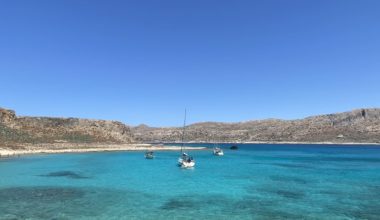
Fulfilling Childhood Dreams in Crete
Get my best stuff sent straight to you, pin it on pinterest.
- Where To Stay
- Transportation
- Booking Resources
- Related Blogs
- Travel Planning Guide
Greece Travel Budget - Visit Greece on a Budget or Travel in Style
- Greece Costs

- Is Greece Expensive?
- How much does a trip to Greece cost?
- How to book Greek Island Ferries
- Mainland Greece
- Greek Islands
- Greece Hotel Prices
- Greece Cities: Hotel Prices by City
- Best Beach Hotels in Greece
- Best Party Hotels in Greece
- Best Hotels for One Week in Greece
- Best Romantic Hotels for Couples in Greece
- Best Hotels for One Night in Greece
- Best Hotels for First Time Visitors in Greece
- Best Luxury Hotels in Greece
- Best Family-Friendly Hotels in Greece
- Best Cheap Hotels in Greece
- Best Hotels for Scuba Diving in Greece
- Best Pet-Friendly Hotels in Greece
- Best Hotels for a Weekend Getaway in Greece
- Best Adults Only Hotels in Greece
- Best Business Hotels in Greece
- Best Hotels for Skiing in Greece
- Hostel Prices & Reviews
- Greece Activities
- Greece Tour Prices
- The Best Family-Friendly Tours to Greece
- The Best Hiking & Trekking Tours in Greece
- The Best Historical Tours in Greece
- The Best 10-Day Tours in Greece
- The Best One Week (7-Day) Tours in Greece
- The Best 3-Day Tours in Greece
- The Best 2-Week Tours in Greece
- The Best Bicycle Tours in Greece
- Tours for Outdoor and Nature Lovers in Greece
- The Best Christmas & New Years Tours in Greece
- The Best Coach Bus Tours in Greece
- The Best Adventure Tours to Greece
- The Best Eco Tours in Greece
- The Best Cruise Tours and Packages in Greece
- The Best Sightseeing Tours in Greece
- The Best Cultural Tours in Greece
- The Best Vineyard & Wine Tours in Greece
- The Best Food and Culinary Tours in Greece
- The Best Romantic Tours for Couples in Greece
- The Best Self Drive Tours in Greece
- The Best Walking Tours in Greece
- The Best Honeymoon Tours in Greece
- The Best Tours Under $1000 in Greece
- The Best Luxury Tours to Greece
- The Best Budget Tours to Greece
- The Best Tours for Seniors to Greece
- The Best Contiki Tours to Greece
- The Best G Adventures Tours to Greece
- Thessaloniki
- How much does it cost to travel to Greece? (Average Daily Cost)
- Greece trip costs: one week, two weeks, one month
How much do package tours cost in Greece?
Is greece expensive to visit.
- How much do I need for a trip to Greece?
- Accommodation, Food, Entertainment, and Transportation Costs
- Travel Guide
How much does it cost to travel to Greece?
Past travelers have spent, on average for one day:
All of these average travel prices have been collected from other travelers to help you plan your own travel budget.
- Travel Style: All Budget (Cheap) Mid-Range Luxury (High-End)
Are You an Experienced Traveler?
Help other travelers! Answer a quick question about your past travels. Click here: let's do it!
How much does a one week, two week, or one month trip to Greece cost?
A one week trip to Greece usually costs around $0.00 (€0.00) for one person and $0.00 (€0.00) for two people. This includes accommodation, food, local transportation, and sightseeing.
A two week trip to Greece on average costs around $0.00 (€0.00) for one person and $0.00 (€0.00) for two people. This cost includes accommodation, food, local transportation, and sightseeing.
Please note, prices can vary based on your travel style, speed, and other variables. If you're traveling as a family of three or four people, the price per person often goes down because kid's tickets are cheaper and hotel rooms can be shared. If you travel slower over a longer period of time then your daily budget will also go down. Two people traveling together for one month in Greece will often have a lower daily budget per person than one person traveling alone for one week.
A one month trip to Greece on average costs around $0.00 (€0.00) for one person and $0.00 (€0.00) for two people. The more places you visit, the higher the daily price will become due to increased transportation costs.
Organized tours are usually more expensive than independent travel, but offer convenience and peace of mind that your trip has been planned by a travel expert.
The average price for an organized tour package in Greece is $257 per day. While every tour varies by total price, length, number of destinations, and quality, this is the daily average price based on our analysis of available guided tours.
- Sailing Greece - Santorini to Athens 15 Days - 15 Destinations $ 2,609
- Grand Classical Tour Of Greece plus Mani and Monemvasia (Small group -… 10 Days - 32 Destinations $ 2,775
Independent Travel
Traveling Independently has many benefits including affordabilty, freedom, flexibility, and the opportunity to control your own experiences.
All of the travel costs below are based on the experiences of other independent travelers.
Greece is a very affordable destination to visit. It is in the top 10% of countries in the world for its affordability . Many budget travelers enjoy spending long periods of time exploring this country in depth.
Within Europe, which is known to be an expensive region, Greece is very affordable compared to the other countries. It is in the top 10% of countries in Europe for its affordability . Very few countries in the region are as affordable as Greece.
For more details, see Is Greece Expensive?
How much money do I need for a trip to Greece?
The average Greece trip cost is broken down by category here for independent travelers. All of these Greece travel prices are calculated from the budgets of real travelers.
Alcohol Budget in Greece
Average daily costs.
Calculated from travelers like you
The average person spends about $21 (€19) on alcoholic beverages in Greece per day. The more you spend on alcohol, the more fun you might be having despite your higher budget.
- Alcohol 2 Drinks for one day $ 21 € 19
Recommended
- Best of Santorini Private Tour & Wine Tasting 6H Viator $ 273
- Heraklion SUV Private Guided Wine Tour with Lunch Viator $ 216
Water Budget in Greece
On average, people spend $3.84 (€3.58) on bottled water in Greece per day. The public water in Greece is considered safe to drink.
- Water 2 Bottled water for one day $ 3.84 € 3.58
Related Articles
Greece on a budget.

At A Glance
- Greece is one of the twenty most touristy countries in thew world and is visited by about 17 million people every year, most of whom come from Europe. It's also most visited during the high season which is between April and October. To avoid these crowds consider coming during the winter months when costs are lower and crowds are thinner.
- When this page was last updated all of Greece's international trains had been suspended due to the country's deteriorating economic situation. Check for updated information on government websites to confirm the situation before you begin your trip.
- Greece is well connected to its nearby neighbors by a system of international ferries . Some of the most popular ports include Venice, Marmaris, Haifa, and Alexandria. This is a fun, but expensive way to explore the region. Compare prices as there are several different companies that run some of the routes. Consider the speed of travel and the class of ticket before making a purchase to make sure you get the most bang for your buck. Most people end up flying or taking the bus because sometimes the ferries can be expensive. However, once in the country of Greece , the ferries can be a great way to get around the islands fairly inexpensively.
- Many people put a lot of thought into whether they should rent a car. It is advantageous if you're hoping to visit a large number of rural towns that are served by only one or two buses a day. If you are staying in more frequented areas, then a car is more of a disadvantage as it can be expensive, is a hassle, and traffic accidents are not uncommon. (The best car rental rates can be found here .)
- Taxis can be difficult to hail, particularly in Athens during rush hour. If you're getting desperate, a good option is to walk to the nearest hotel and have them flag down a taxi for you. This will help ensure you get a driver who is willing to go to your chosen destination.
- For information on what to bring to Greece, check out this great Europe Packing List .
Top Tourist Attractions
Popular foods, more related articles.
We've been gathering travel costs from tens of thousands of actual travelers since 2010, and we use the data to calculate average daily travel costs for destinations around the world. We also systematically analyze the prices of hotels, hostels, and tours from travel providers such as Kayak, HostelWorld, TourRadar, Viator, and others. This combination of expenses from actual travelers, combined with pricing data from major travel companies, gives us a uniqe insight into the overall cost of travel for thousands of cities in countries around the world. You can see more here: How it Works .
Subscribe to our Newsletter
By signing up for our email newsletter, you will receive occasional updates from us with sales and discounts from major travel companies , plus tips and advice from experienced budget travelers!

Search for Travel Costs
Some of the links on this website are sponsored or affiliate links which help to financially support this site. By clicking the link and making a purchase, we may receive a small commission, but this does not affect the price of your purchase.
Travel Cost Data
You are welcome to reference or display our travel costs on your website as long as you provide a link back to this page .
A Simple Link
For a basic link, you can copy and paste the HTML link code or this page's address.
Travel Cost Widget
To display all of the data, copy and paste the code below to display our travel cost widget . Make sure that you keep the link back to our website intact.
- Privacy / Terms of Use
- Activities, Day Trips, Things To Do, and Excursions

Travel Guide
- Things to Do
- Regions in Brief
- Suggested Itineraries
- Entry Requirements & Customs
- Getting Around
- Visitor Information
- Tips on Accommodations
- Special-Interest Vacations
- Calendar of Events
- Sustainable Travel & Ecotourism
- Getting There
- Health & Safety
- Tips for Families
- Tips for Gay and Lesbian Travelers
- Tips for Senior Travelers
- Tips for Single Travelers
- Tips for Student Travelers
- Tips for Travelers with Disabilities
- Tips for Women Travelers
- Tips for Black Travelers
- Staying Connected
- Organized Tours
- Active Pursuits
Money in Greece
Frommer's lists exact prices in the local currency (the euro). However, rates fluctuate, so before you leave, check a website like www.oanda.com/currency/converter online for the latest rates The currency in Greece is the euro (pronounced evro in Greek), abbreviated "eu" and symbolized by €. (If you still own the old drachmas, it is no longer possible to exchange them.)
The euro comes in seven paper notes and eight coins. The notes are in different sizes and colors. They are in the following denominations: 5, 10, 20, 50, 100, 200, and 500. (Considering that each euro is worth over $1, those last bills are quite pricey!) Six of the coins are officially "cents" -- but in Greece they have become referred to as lepta, the old Greek name for sums smaller than the drachma. They come in different sizes and their value is 1, 2, 5, 10, 20, and 50. There are also 1€ and 2€ coins. Although one side of the coins differs in each of the member E.U. nations, all coins and bills are legal tender in all countries using the euro.
Warning: The 1€ and 2€ coins look similar to a 1 lira Turkish coin -- worth less than half the 1€, so count your change carefully.
It's a good idea to exchange at least some money -- enough to cover airport incidentals and transportation to your hotel -- before you leave, so you can avoid lines at airport ATMs. You can exchange money at your local American Express or Thomas Cook office or at some banks.
For many decades after World War II, Greece was one of the great bargain destinations for tourists. But since the 1990s, it can no longer be described this way. It may not be in the category of London or New York or Paris or Tokyo, but in the major cities and hot spots, hotels are no longer bargains and the upscale restaurants are comparable to restaurants in most other developed countries. Admission to major museums and archaeological sites is comparable to fees in other major cities. Flights within Greece are expensive, as are car rentals -- especially in high season. But it is still possible to have a reasonably modest holiday in Greece. You can start by visiting outside the high season -- July and August. Pick midprice hotels and restaurants -- and make sure breakfast is included in your hotel price. Look for deals on car rentals. Fly off-peak hours, and avoid expensive services such as spas or purchases such as jewelry. As noted frequently throughout this guide, the current economic flux in Greece may lead to discounted rates at hotels and restaurants -- it's always worth asking.
For help with conversions, tip calculations, and more, download Frommer's Travel Tools app for your mobile device. Go to www.frommers.com/go/mobile and click on the Travel Tools icon.
In commercial centers, airports, all cities and larger towns, and most tourist centers, you will find at least a couple of machines accepting a wide range of cards. Smaller towns will often have only one ATM -- and it may not accept your card. Commercial Bank (Emboriki Trapeza) services PLUS and Visa; Credit Bank (Trapeza Pisteos) and AlphaBank accept Visa and American Express; National Bank (Ethiniki Trapeza) takes Cirrus and MasterCard/Access.
But for all the prevalence of ATMs, you should keep at least some actual cash on you for those occasions when all the ATMs you can locate are out of order or out of cash. Keep enough euros or your own currency to get you through at least 24 hours.
Note: Greek ATMs accept only a four-digit PIN -- you must change yours before you go. And since Greek ATMs use only numeric PINs (personal identification numbers), before you set off for Greece be sure you know how to convert letters to numerals as the alphabet will be in Greek.
Credit Cards
In Greece, Visa and MasterCard are the most widely accepted cards. Diners Club is less widely accepted. And American Express is still less frequently accepted because it charges a higher commission and is more protective of the cardholder in disagreements.
Three Warnings about Debit & Credit Cards -- As part of banks' and credit card companies' increasing concern about fraud, it is our experience that they are apt to deny your cards if you go to use them too far out of your normal circuit of use. It's a wise idea to contact your cards' customer service department by phone and inform them of your travel plans.
Meanwhile, perhaps you have been reading about the new Chip-and-PIN (aka "Smart Cards") credit cards that are being introduced throughout much of the world. Unlike the long-standard credit cards that have only a magnetic strip, these have a small chip embedded in them and then require the user to enter a PIN. The European Union has required all its member nations to introduce these, but as of this writing, most American issuers of credit cards have not adopted them. This means that Americans abroad may face a problem when presenting their standard magnetic strip cards: some places may claim that they are no longer acceptable. In fact, they are: If the individual rejecting your card doesn't know this, he must punch in your card number manually -- and you must provide them with that card's PIN. So, if you do not know your card's PIN, you must call your card issuer and obtain one (for MasterCard, call tel. 800/622-7747; for Visa, tel. 800/857-2911 ). Allow some time for this as it may involve sending mail from and back to the issuer. Note: This problem does not arise if you are using a card as a debit card, which already requires its PIN.
Credit cards are accepted throughout Greece in the better hotels and at most shops. But even many of the better restaurants in major cities do not accept credit cards, and certainly most restaurants and many smaller hotels in Greece do not. Some hotels that require a credit card number when you make advance reservations will demand payment in cash; inquire beforehand if this will be the case.
Beware of hidden credit card fees while traveling. Check with your credit or debit card issuer to see what fees, if any, will be charged for overseas transactions. Recent reform legislation in the U.S., for example, has curbed some exploitative lending practices. But many banks have responded by increasing fees in other areas, including fees for customers who use their cards while out of the country. Fees can amount to 3% or more of the purchase price. Check with your bank to avoid any surprise charges on your statement.
What Things Cost in Athens
Taxi from the airport to downtown Athens 35-50€
Double room, moderate 90-110€
Double room, inexpensive 65-85€
Three-course dinner for one without wine, moderate 12-20€
Bottle of beer 2.50-4€
Cup of coffee 1.50-3.50€
1 gallon/1 liter of gas 6.70/1.75€
Admission to museums and archaeological sites 2-12€
Note : This information was accurate when it was published, but can change without notice. Please be sure to confirm all rates and details directly with the companies in question before planning your trip.

- All Regions
- Australia & South Pacific
- Caribbean & Atlantic
- Central & South America
- Middle East & Africa
- North America
- Washington, D.C.
- San Francisco
- New York City
- Los Angeles
- Arts & Culture
- Beach & Water Sports
- Local Experiences
- Food & Drink
- Outdoor & Adventure
- National Parks
- Winter Sports
- Travelers with Disabilities
- Family & Kids
- All Slideshows
- Hotel Deals
- Car Rentals
- Flight Alerts
- Credit Cards & Loyalty Points
- Cruise News
- Entry Requirements & Customs
- Car, Bus, Rail News
- Money & Fees
- Health, Insurance, Security
- Packing & Luggage
- -Arthur Frommer Online
- -Passportable
- Road Trip Guides
- Alaska Made Easy
- Great Vacation Ideas in the U.S.A.
- Best of the Caribbean
- Best of Mexico
- Cruise Inspiration
- Best Places to Go 2024

The Cost of Travel in Greece: My 2024 Budget Breakdown

After 12 years of travel and over 90 countries, I have come to the conclusion that Greece is one of the greatest countries in the world.
I love it so much, in fact, that I make the effort to visit at least once every couple of years. And every time I do? I always ensure I visit at least one new part of the country while I’m there.
And so, I’ve spent a significant part of the last decade exploring the beautiful Greek islands.
What is it that pulls me to return to Greece over and over again?
Quite simply, I fell in love with Greek food. If you think you’ve had Greek food before but have yet to travel to Greece: you have the most incredible treat awaiting your arrival. Greek food is divine — it’s so fresh, healthy, and delicious, with the sweetest-tasting tomatoes and the creamiest slabs of feta. I deal with a bunch of health conditions and typically have to stick to a strict diet in order to control them, but for some reason, none of that applies in Greece! I can eat whatever I want there and feel as though I’m thriving . I guess it’s that wonderful Mediterranean diet coming into play.
I could write a love letter to Greek food with just a moment’s notice, but even I can admit the country has so much more to offer than it’s incredible cuisine.

Athens is a wonderful, world-class city full of the most impressive ruins and architecture — ignore the people who say it’s dirty and gritty, as it’s absolutely not and is well-worth visiting. You’ve got dozens upon dozens of islands to explore, from the iconic Santorini and Mykonos to the laidback Ithaca and Kefalonia. The other-worldly Meteora is well-worth a visit, and have you seen the famous shipwreck cove in Zakynthos (pictured below)?
It’s hard to believe one country can offer up so much.
I’ve been fortunate to have spent four months travelling across Greece, and over that time, I’ve been to Athens, Mykonos, Santorini, Crete, Corfu, Kalamos, Kefalonia, Lefkada, Meganisi, and Ithaca. Every September, I charter a yacht with a group of friends and spend a couple of weeks sailing through the Ionian islands, falling more in love with this part of the world after every visit.
Hopefully my passion for Greece shines through my words, and I can inspire you to visit this amazing country, too. Because the good news is that Greece is relatively inexpensive. And the even-better news is that I can tell you exactly how much it costs to travel there.
I’ve been recording every single cent I spend in the countries I visit from day one of my travels because I want to prove that seeing the world is inexpensive and achievable. I want to be able to give a realistic and accurate look at how much you can expect to spend in each country you visit.
Today, it’s Greece’s turn.
Here’s how much you can expect to spend on a trip to Greece in 2024.
How to Save Money on Flights to/From Greece
My European readers won’t have to worry too much about the cost of flights to Greece, as the wide range of budget airlines means finding something affordable is never too much of a problem. As always, I recommend heading to Skyscanner to snag yourself a bargain.
If you’re flexible with dates and itinerary, you’ll find the best deals by searching to flights to “Greece” rather than an individual city, as you may find it’s far cheaper to fly into Corfu over Athens, for example. It’s also worth setting your flight departure date to be across an entire month, which you can do with Skyscanner . This will show you the cheapest dates to fly and ensure you have the very best deal possible.
In general, you’ll find that it’s cheapest to fly to Greece outside of high season, which coincides with typical European summer vacation dates (late-June to late-August). May and September are the shoulder season months, and October to March is the official low season, where you’ll find the lowest prices. If you do have the freedom to visit during shoulder season, I highly recommend it, as it’ll mean spending less on flights and accommodation while having to deal with fewer tourists. Shoulder season is my favourite time of year to travel, and it’s worth making the effort to do so in Greece.
What if you’re based in North America?
Fortunately, there are quite a few direct flights running between North America and Greece — while Newark is the only North American airport that offers direct flights year-round, from shoulder-season onwards, you’ll be able to catch flights from/to JFK, Toronto, Montreal, Chicago, Philadelphia, Atlanta, Washington DC, and Boston.

How to Save Money on Accommodation in Greece
As always with travel, it’s possible to cut your accommodation costs down to zero if you have the time and patience to seek out an offer.
Couchsurfing exists in Greece , and allows you to stay with a local for free, sleeping on their sofa and enjoying a local’s insight into life in their country. It’s not the most comfortable of living situations, but if your budget is tight, it’s worth sending out a few requests to hosts to see if anything comes of it.
Housesitting is another option. This is where you’ll take care of somebody’s house for free while they’re away, and usually look after their pets, too. It’s best for long-term travellers or retirees as you can’t pick and choose dates and destinations, so you need to have a lot of flexibility as to where you go and at what time of year. If you do have that freedom, it’s a wonderful way to cut down your travel expenses, soak up some home comforts, and live like a local for a while. Trusted Housesitters is one of the best sites for getting started with housesitting.
And finally, if you’re travelling long-term and don’t mind getting your fingers dirty, you could look at WWOOFing or WorkAway as a way to cut down your costs while working on a farm in exchange for accommodation and food. It’s not the most glamorous of experiences, but getting to live for free in a foreign country is an incredible experience, so if you’re backpacking around Europe, this may be the way forward for you.
I’m suspecting, though, that for most of you, you’re not interested in the free accommodation and just want somewhere clean, safe, and affordable to rest your head each night. If that’s the case, there are several options available for you.
The first of these are hostels . In Greece, you’ll come across hostels all over the country, finding them on tiny islands, in large cities, and even in the national parks. They’re one of your best options for saving money.
Hostels in Greece are slightly cheaper than equivalents in Western Europe, with the big exception being Mykonos and Santorini over the summer, both of which are eye-wateringly expensive (I once paid €72 a night for an 4-bed dorm in Santorini in July!) You can expect to spend around €10-15 for a dorm bed in most spots in Greece, with the price increasing to slightly about €15 a night on the popular islands, national parks, and more tourist-filled areas.
When it comes to private rooms in hostels, you can expect to spend around €25 a night for a clean, basic room in a good location, so if you’re travelling with friends or with your partner, you may find it cheaper to grab some privacy over settling for two beds in a dorm room.
If you’re an older traveller and put off by the thought of nights spent in hostels, you shouldn’t be! Private rooms are usually very quiet and clean, and most hostels are modern, safe, and centrally located. They tend to have a little more personality than generic hotels, and the staff are fantastic at offering kickass travel advice. As long as you check the reviews of any hostel before booking it to make sure nobody refers to it as a party hostel, you’re all good to make a booking there.
I use HostelWorld to find the cheapest hostels, as they tend to have the greatest number of listings at the lowest prices.
And, of course, there are always hotels, which will usually start at around €50-€150 a night for a decent, clean, mid-range property in a central location. I always use Booking , as they have the most accommodation options for the cheapest prices.
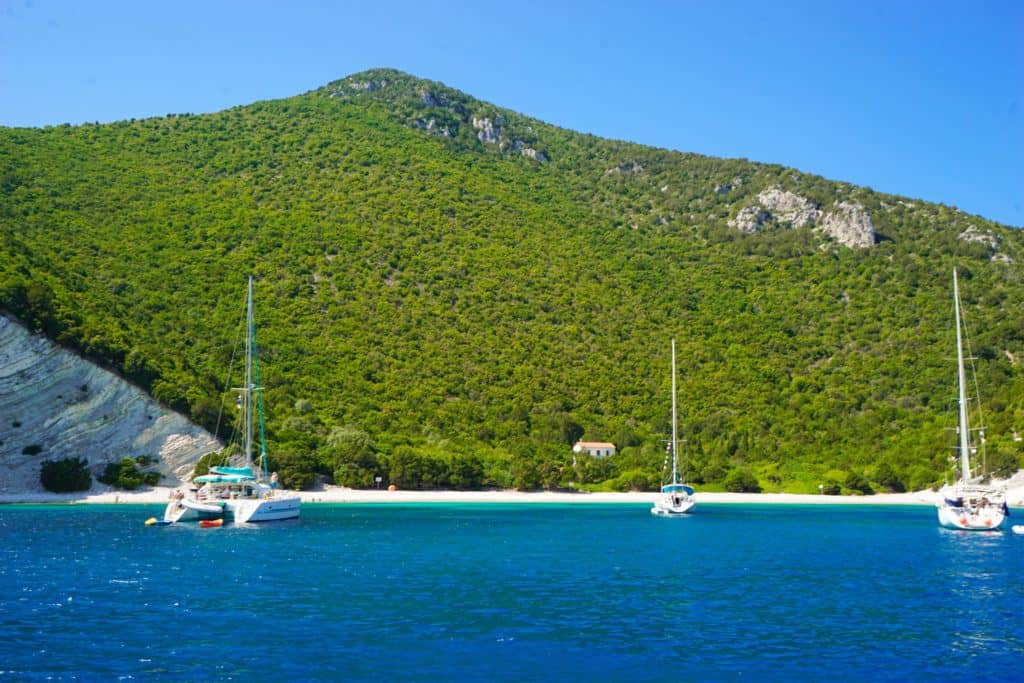
The Best Hostels and Guesthouses in Greece
I’ve visited Greece during various stages of my travel career, from a solo backpacker who was travelling on a shoestring budget to part of a couple that was looking for all things private and mid-range. I’ve even travelled on a luxury budget for an anniversary celebration with my partner. In other words, I learned a lot about how to travel affordably through this country in the process.
I always like to share which accommodation I stayed in on my travels, as well as recommend alternatives when mine sucked. Here’s my list of my favourite accommodation options in Greece, listed in Euros:
Athens: €72 a night
You’re not going to find a better hotel in Athens for this low of a price! The Hellenic Hospitality House receives an average rating of 9.8 on Booking from over 1,500 reviews. It’s all of those glowing reviews that led to me booking a stay there. And it was simply phenomenal! It’s located right in the heart of Athens, within walking distance to all of the main attractions. And the staff were amazing, giving restaurant tips, advice on how to make the most of our stay, and even treating us to a coffee on one occasion!
Santorini: €132 a night
Santorini sure is a pricey destination, but that doesn’t mean that you have to obliterate your travel budget in order to visit. I loved my stay at La Belle Vie , and was amazed that you could still land yourself a pool at a property this affordable. Here, it’s all about the central location, the beautiful rooms, the refreshing swimming pool, and the epic sea views. Throw in some wonderful owners and you’ve got yourself a perfect stay in Santorini!
Mykonos: €170 a night
The best properties in Mykonos tend to come in between €150 and €200 a night, and With-Inn fits nicely in the middle of this price range. And just wait until you see the photos of the breakfasts! This property is Greek-owned and run, and the mother puts on a delicious spread of fresh and organic local eats every morning. So good! On top of that, you’ve got a free pick-up and drop-off from the airport and port, excellent views, and such a comfortable bed! This is a great place to stay.
Corfu: €86 a night
I love staying in Sidari in Corfu, and recommend Sidari Beach Hotel while you’re in town. It offers such good value for money for what you get. You’ll be greeted by the most welcoming staff ever who simply cannot do enough for you. The swimming pool is excellent, the breakfast delicious, and you’re located on a quiet beach that, most of the time, you’ll have all to yourselves. What a little slice of paradise.
Crete: €91 a night
If you love your hotels to be quirky, original, and photogenic, you must stay at Pavo Art Hotel in Heraklion Town. I’ve never stayed in such a fun, beautiful property before! The hotel is brand-new and so clean that you’ll feel as though you’re the first guests in the property. It’s also in a great location for exploring Heraklion’s historical attractions. The staff are kind and helpful, and there’s even a free shuttle to the city centre, although I preferred to walk along the waterfront into town each day. All in all, a great place to stay!
Rhodes: €64 a night
If you’re going to be staying in the lovely Rhodes Town, I can’t recommend Hotel Anastasia highly enough. It’s an adorable, family-run guesthouse in the heart of all the action while still remaining quiet. The included breakfast is great, the staff are particularly helpful if you’re keen to book day trips across the island, and the property’s gardens are so beautiful! Rooms are cleaned everyday and overall, it’s great value for money!
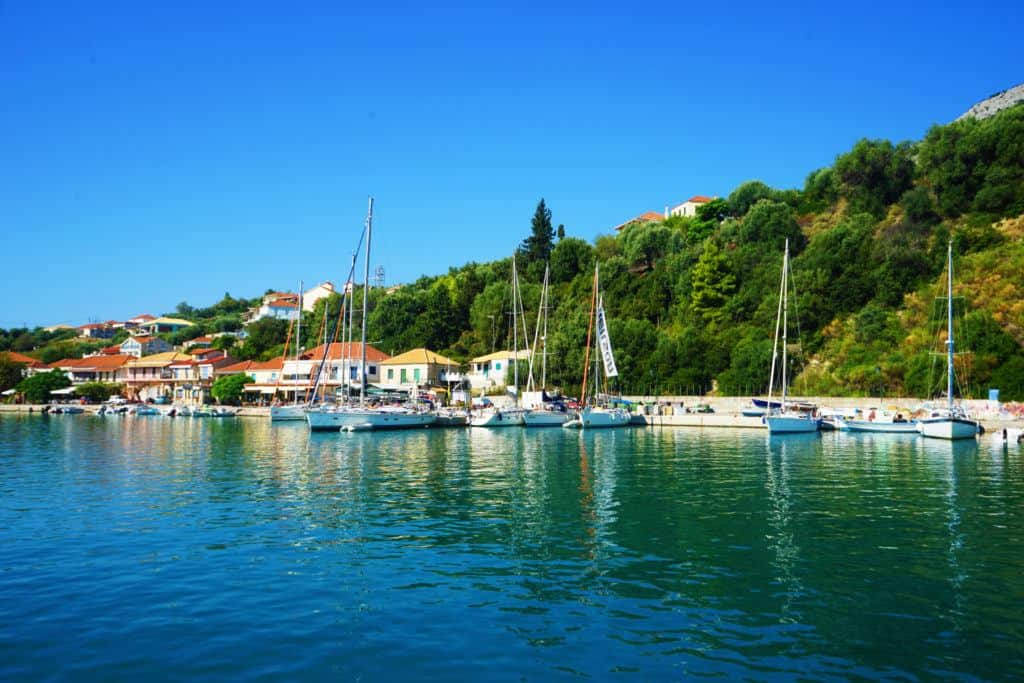
How to Save Money on Transportation in Greece
Transportation is fairly inexpensive in Greece, so you won’t need to worry about it upping your travel budget by too much. The best, easiest, and cheapest way to travel around the country is by bus or by ferry.
Athens is home to an impressive metro system, and while the city is pretty walkable, you’ll still probably utilise it every now and then. It’s inexpensive to ride, costing €1.40 for a 90-minute ride, €4.50 for 24 hours of unlimited use, and €9 for a five-day ticket.
If you’re planning on travelling across the mainland, the domestic bus network — KTEL — will take you anywhere you need to go. And I’ll be honest here: while I’d love to tell you that taking the bus in Greece is super-simple, but it’s actually kind of complicated and annoying.
KTEL buses are run by dozens of individual bus companies, and each company has their own website. And so, to travel from town to town, you can’t simply head to a main KTEL website. Instead, you’ll need to find the specific KTEL website for the province you’ll be travelling from.
If you love trains, like I do, you’re not going to be impressed with the rail infrastructure in Greece. Travel between Athens and Thessalonki on a train but that’s about it. You can book a ride through TrainOSE .
If you’re anything like me, though, you can’t imagine visiting Greece and not spending time on some of its gorgeous islands. In this case, you’re going to want to hop from the mainland to paradise. Many of the popular Greek islands are home to an airport, which makes travel particularly easy. You’ll be able to jet straight into Santorini, Mykonos, Corfu, Kefalonia, Lefkada, Zakynthos, Rhodes, Kos, Karpathos, Skiathos, Lesvos, Lemnos, Samos, and Crete! Phew! That’s quite the list of destinations!
If you’re on a tight budget, however, you’ll most likely opt to travel by ferry. Ferries leave from Piraeus, in Athens, and typically cost around €40, regardless of where you’ll be travelling to. I use Ferry Hopper to book my ferries in Greece.
When it comes to hiring a car to drive around Greece, I’d recommend against doing so. Roads are poor quality, local drivers can be chaotic, and on-street parking is tough to find. If you’re still keen, though, I hired my car out of Preveza Airport through my favourite RentalCars .com , a comparison search engine that brings up the best deals from all the popular providers.
You can also hire scooters in Greece, so if you’re competent on two wheels, you may want to opt for this instead! I’ve done this throughout the Ionian, as well as in Crete, and had so much fun! You don’t typically need to have a motorbike license to hire a scooter (although keep in mind that this means your travel insurance won’t cover you if you wreck the bike or injure yourself!)
Here are some of the typical transportation costs you can expect to run into while in Greece:
- Train from Athens to Thessaloniki: €52.50
- Ferry from Athens to Mykonos: €36
- Ferry from Athens to Santorini: €40
- Ferry from Athens to Chania (Crete): €40
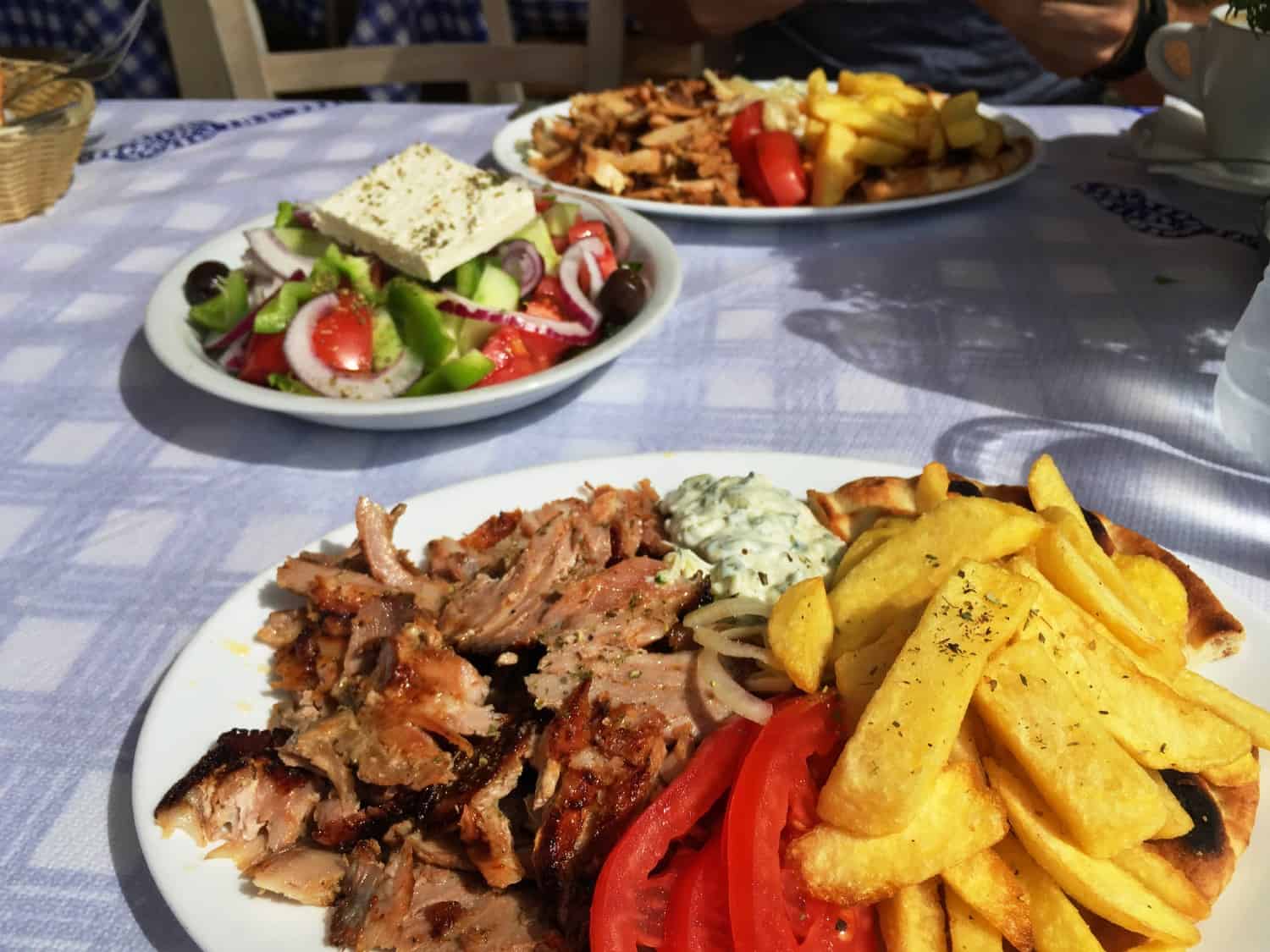
How to Save Money on Food in Greece
You’ve already seen me spiral off into a soliloquy on the merits of Greek food, so I’m excited to dive into one of my favourite subjects in even more depth.
The first thing to know is that food is inexpensive in Greece, and I rarely spend more than €10 a meal. Still, there are plenty of opportunities for cutting costs as you travel around this wonderful country.
Cooking is always going to be more affordable than eating out, so if you’re willing to sacrifice some meals on your vacation, this is a great way to keep on track with your budget. Hostels will usually give you access to a shared kitchen, and if you’re opting to stay in an Airbnb, you can check that it allows you access to the kitchen. If that’s the case, you can head to a local market (a great cultural experience) and stock up on fish, vegetables, and gigantic slabs of feta fruits, and spend far less on your meals than you would at a restaurant.
Many accommodation providers will offer free breakfasts within their room rate, so if that’s the case, I always recommend opting for it, unless it reveals itself to be terrible on your first morning’s breakfast. In general, though, the food is so delicious in Greece that I’ve yet to stumble upon a bad hotel breakfast.
You’re also going to want to opt for a larger lunch and a smaller dinner. Most restaurants charge less for their lunch menus, even though they’re serving the exact same meal for lunch and dinner. If you can eat a bigger meal for lunch, you can then get by with a much smaller one for dinner and save money through doing so.
In general, you should expect to spend the following on each meal:
Breakfast: €5 each for a local breakfast; €10 each for something in a hipster cafe.
What can you expect from breakfasts in Greece? Often, the first meal of the day is the simplest, and you can expect to delight in fresh breads, olive oils, tangy cheeses, pastries, and plenty of coffee. Greek yoghurt is famous, so you can definitely expected to be presented with some for breakfast, usually drizzled with beautiful Greek honey — the sweetness balances out the tanginess of the dairy.
In cafes, you might want to order a spinach pie, or spanakopita, which comprises a crispy casing that encases spinach, feta, and plenty of local herbs.
If you require something a little more filling, try strapatsada or kagiana s (the dish has two names). It’s a plate of scrambled eggs, with fresh tomatoes, feta, and herbs folded in. It’s simple yet delicious.
Lunch: €6 for a Greek salad; €10 for a souvlaki meal
Lunches in Greece are — you guessed it! — delicious. Personally, I aim to eat either a Greek salad or souvlaki for lunches — both of which are super-affordable and filling.
Dinner: €10 each if you’re on a budget, €18 each for a mid-range restaurant, €35 each for something higher-end.
What about tipping? In most restaurants you’ll frequent, tipping will be welcome but not in any way expected. So don’t panic — it isn’t seen as offensive if you don’t tip! And likewise, it won’t be viewed as offensive if you do. Expect to pay 10-15% in any fancy restaurants you head to, but anything laidback and local won’t require you to pay extra.
I don’t often have much success with this suggestion, but I do recommend keeping an eye on your drink consumption while travelling in Greece. Alcohol is obviously a big budget buster on the road, so if you’re happy to substitute the sodas, juices, and booze for bottled water, you’ll save a ton of money.
If you’re determined to jump headfirst into the Greek food scene and don’t want to spend your vacation cooking, you should look to eat at the tavernas as opposed to the fancier restaurants. Tavernas are small family-run restaurants that offer big dishes and low prices, and they’re just as tasty as the more expensive options.
You can always ask the locals for food recommendations, too! Ask at your accommodation for recommendations on the best budget eats, or simply walk around and see which restaurants are full of locals.
Here are some typical prices of food and drink in Greece to help you budget better:
- Pint of draught beer: €2.00
- A bottle of house wine in a restaurant: €10
- A slice of pizza: €2.50
- Sandwich from a deli for lunch: €4
- A 30 cm pizza for dinner: €11.00
- Seafood dish in a fancy restaurant: €20.00
- Cappuccino in an expat area of town: €1.50
- Litre of milk: €0.75
- A loaf of bread: €0.80
- A dozen eggs: €1.80
- 1 kilogram of tomatoes: €1.40
- 1 kilogram of potatoes: €0.80
- A 1.5l bottle of water: €0.90
- A risotto for lunch: €10.50
- A steak dinner: €17.50

How to Save Money on Activities in Greece
We’ve covered accommodation, transportation, and food, but let’s face it: you’re not going to have the trip of a lifetime if you skip out on entrance fees and activities! Here’s a detailed breakdown of some of the costs you’re likely to encounter while travelling around Greece:
- Athens: Acropolis and 6 Archaeological Sites Combo Ticket : €35
- Athens: Full-Day Meteora Trip by Train : €98
- Athens: Delphi Guided Day Trip with Pickup & Optional Lunch : €87
- Santorini: Volcanic Islands Cruise with Hot Springs Visit : €26
- Santorini: Guided Wine Tasting Tour with Pickup : €140
- Santorini: Catamaran Cruise with Lunch & Open Bar : €100
- Zakynthos Island: Navagio Shipwreck Beach & Blue Caves Tour : €45
- Mykonos Cooking Class : €140
- From Thessaloniki: Day Trip to Dion and Mount Olympus : €55
Miscellaneous Items to Buy for a Trip to Greece
A Greece guidebook : A guidebook will give you an in-depth look into Greece’s culture, suggest the perfect itineraries for the amount of time you have, and offer recommendations for where to eat and what’s worth doing. I like Lonely Planet guidebooks, and their Greek offering receives great reviews . Readers of Never Ending Footsteps receive a 10% discount on Lonely Planet purchases by buying through the above link.
A dry bag : Greece is all about the water, so I highly recommend packing a dry bag to take with you. A dry bag has saved me while travelling on so many occasions:
- On a kayaking trip from Koh Yao Noi to Koh Nok, a freak wave splashed over me, as well as my camera and phone. Had I not had them in a dry bag, the water damage would have likely destroyed them.
- On a ferry ride in Thailand, the boat sprung a leak and began to sink. I was able to put my laptop, camera, hard drive, passport, and money in my dry bag, seal it up, and know that they’d stay safe and dry if the worst were to happen.
- I chartered a yacht in Greece and relied heavily on my dry bag while I was there. When mooring in tiny bays, I was able to fill my dry bag with my camera, towel, and sunscreen, jump in the sea, and swim to the nearest empty beach without worrying about keeping my belongings dry.
- I also think dry bags are fantastic for solo travellers on beach days. It’s tough going to the beach when you’re travelling alone because you’ll need to bring nothing with you, risk getting robbed while you’re in the ocean, or stay on the sand at all times. If you have a dry bag, you can fill it up with your valuables and take it for a swim with you, rather than leaving them on your towel and hoping nobody will grab them.
I love all things Sea to Summit, and after trying several of their dry bags out, my champion is the Ultra-Sil 8L — it’s durable, thin, lightweight, and has never let me down.
Travel insurance : If you’ve read any other posts on Never Ending Footsteps, you’ll know that I’m a great believer in travelling with travel insurance. I’ve seen far too many Go Fund Me campaigns from destitute backpackers that are unexpectedly stranded in a foreign country after a scooter accident/being attacked/breaking a leg with no way of getting home or paying for their healthcare. In short, if you can’t afford travel insurance, you can’t afford to travel.
Travel insurance will cover you if your flight is cancelled and you need to book a new one, if your luggage gets lost and you need to replace your belongings, if you suddenly get struck down by kidney stones and have to be hospitalised, or discover a family member has died while you’re overseas and now you need to get home immediately. If you fall seriously ill, your insurance will cover the costs to fly you home to receive medical treatment.
I use and recommend SafetyWing for travel throughout Greece. They’re one of the few companies out there who will actually cover you if you contract COVID-19. On top of that, they provide worldwide coverage, don’t require you to have a return ticket, and even allow you to buy coverage after you’ve left home. Finally, they have a clear, easy-to-understand pricing structure, which is always a bonus.
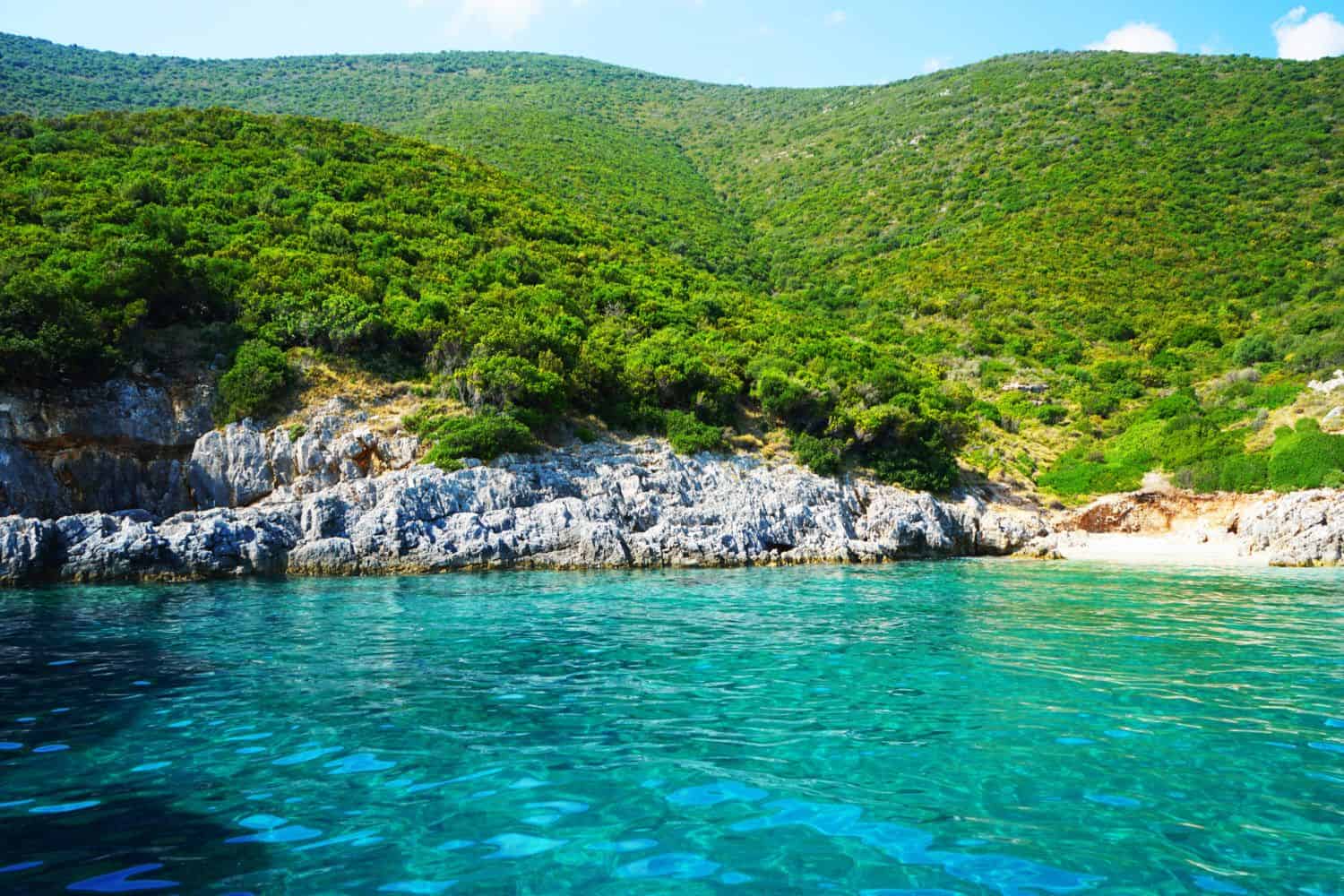
How Much it Costs to Travel in Greece
I always like to share my own personal expenses when travelling in a country, as I think it helps you figure out what you should be expecting to pay each day while you’re there. A list of expenses is great and helpful, of course, but putting them all together in order to come up with a reasonable estimate can be trickier.
Here’s what I’ve spent on average over my many months in Greece:
Accommodation: €45 per day Transportation: €7 per day Food: €23 per day Activities: €2 per day
My average daily cost of travel in Greece is therefore: €77 per day . Not bad at all!
Related Articles on Greece 3️⃣ How to Spend Three Days in Athens, Greece 🇬🇷 11 Highlights From My First Trip to Greece 🧳 A Carry-On Packing List for Sailing in the Greek Islands ⛵️ Conquering My Fear of Sailing in Greece
Lauren Juliff
Lauren Juliff is a published author and travel expert who founded Never Ending Footsteps in 2011. She has spent over 12 years travelling the world, sharing in-depth advice from more than 100 countries across six continents. Lauren's travel advice has been featured in publications like the BBC, Wall Street Journal, USA Today, and Cosmopolitan, and her work is read by 200,000 readers each month. Her travel memoir can be found in bookstores across the planet.
Related Posts

The Cost of Travel in Mauritius: My Detailed Budget Breakdown

The Cost of Travel in Thailand: My Detailed Budget Breakdown

2023: My Travels in Review

The Cost of Travel in South Korea: My 2024 Budget Breakdown

What’s it Like to Travel in Liechtenstein?


What to Take On the Camino Primitivo: My Detailed Packing List
Thanks for sharing your Greece trip. If I have only 2 weeks, which islands do I go and your suggested itinerary.
Thanks and happy travelling!
Leave a reply Cancel reply
Your email address will not be published. Required fields are marked *
Meet Lauren Juliff
Budget Greece Travel Guide 8 Ways to Save More Money
- Pinterest 216
The Budget Greece Travel Guide includes 18 Important Travel Planning Tips that will allow you to see and do more on your budget. Learn how you can benefit.
Table of Contents
Welcome to the Greece Travel Guide! For many decades Greece has been towards the top – if not even crowning the pinnacle – of many travelers’ dream destination list. Basking in almost year-round sunshine, packed full of one-of-a-kind sites, incredibly welcoming and also consistently affordable on a budget, Greece is simply a wonderful place to visit.
The beauty of Greece is well known as it was popular with visitors (not always welcome!) thousands of years ago. Today tourism accounts for nearly 20% of the country’s total GDP and has decades of experience catering for visitors with any kind of budget. Make no mistake you can spend a long time in Greece without much money – and this Greece Travel Guide will spend plenty of time explaining how!
What Are the Best Places to Visit in Greece?
You really cannot go far wrong when it comes to planning where to visit. If anything, visitors are spoiled for choice. One of the amazing aspects of visiting Greece is you can easily hop between islands providing you take the time to plan a little in advance. Each island really deserves plenty of time to explore its own unique heritage – for instance, you could easily take a week to explore each of Corfu, Crete, and Santorini in full.
Take it from the team at the Greece Travel Guide that this is a country best not rushed and quite possibly the best in Europe for those with time to burn!
Let’s begin our fantasy tour with a few days in Athens. While it may not be quite as ‘splendid’ as thousands of years ago, it is the closest to a really ‘big city’ that you will find in the country. In peak summer it can be tough going and pretty stressful at first, but give it a little time to acclimatize and you’ll quickly realize that this is a seriously buzzing city. It ought to go without saying that you’ll find plenty to see in Athens.
Be sure to spend longer around the Acropolis and surrounding Agora than you may expect, oh and the nightlife is pretty spectacular around the Psirri district too! Check out the Plaka market district (be prepared to barter) for an endless procession of gorgeous goods.
After perhaps three/four days in Athens chances are you’ll be in the mood for something a little more sedate. Where you decide to head from here depends entirely on your personal preferences, just be sure to understand that while the Greek transit infrastructure is complicated/efficient (depending on your point of view) it is impossible to cram ‘Greece’ into a couple of weeks alone.
Even the most picturesque ferry routes can become a little tiresome after eight hours! While still in the Athens area you should take the time to visit Delphi – an accessible and short day trip from the capital. As with many of the antiquity sites, it is good practice to read up a little before you arrive so you can appreciate the wonders of the Temple of Apollo.
Santorini is the most logical next step from the mainland and for many people on a shorter break provides a picture-postcard Greek island experience. It is breathtakingly beautiful, with a rugged landscape caused by a volcanic explosion 3500 years ago, and surrounded by crystal clear water dotted with dark volcanic lava pools.
Take the time to explore this majestic island as far as your budget will allow. It is popular with well-heeled visitors but those of us on a budget can easily get by with a cycle hire and a packed lunch.
Crete is the largest Greek island and offers something for everyone. Despite being a very popular ‘package’ vacation destination that attracts millions of visitors each year, the island has plenty more to offer than crowded beaches and cheap beer (time and a place for everything!). Go searching for Zeus around the Ideon Cave, enjoy the finest Greek cuisine, take in the gorgeous natural fauna, and basically just enjoy exploring this tremendous destination.
You may be sharing the island with countless other visitors but it is reassuringly easy to find yourself in perfect peace and tranquility on Crete. Be sure to check out the Heraklion archeological museums, Knossos, Samaria Gorge, Balos Lagoon and many other key sites.
Corfu is similar to Crete in style but quite different in appearance. It is considerably ‘greener’ and more mountainous, arguably offering better overall views and more precise regions worth exploring/hiking/cycling. Once again it is popular with visitors but most will stay around the coastal resorts and rarely venture inland.
The team at the Greece Travel Guide highly recommends you get out of the resorts as soon as possible to find your very own perfect beach. Corfu is a sunbather’s paradise and you’ll find far better options away from the most popular.
But what about the other famed Greek Islands? Surely Kos, Skiathos, Mykonos, Paros and dozens of others demand special attention? Well, you’d be absolutely correct in saying so. As mentioned previously every Greek island has something special to offer the visitor – be it sheer natural beauty, world-class culture, sumptuous beaches or more often than not, a mixture of everything.

check out our video
What are the best things to do in greece.
Where you decide to visit will play a major role in what you end up doing. If you are in Athens then it makes sense to spend the majority of your time visiting the key museums and archeological sites.
It is not really the kind of city that easily lends itself to relaxing! On the absolute opposite side of the coin if you are spending time in Skiathos (a tiny island with only a single ring road around the coast) you will be spending many hours on the beach. Crete, Corfu and most others offer a balance of the two that can be skewed either towards either exploring the culture or simple relaxation depending on your mood that morning.
Assuming that you may get tired of trekking through endless archeological sites in the summer heat, some of the best experiences in Greece are handily those that don’t cost a lot – if any – money. Camping is fantastic providing you are willing to ‘rough it’ a little – do not expect the kind of resort-style campsites that are found throughout much of the rest of Europe.
Rules and regulations vary depending on which island you visit, but generally speaking there is nothing stopping you camping responsibly on quiet beaches and secluded meadows.
Cycling is an excellent way of getting around the smaller islands and not only reduces your carbon footprint a little but allows for casual detours where and when you wish.
You’ll notice endless promotions for guided tours/excursions and sometimes these are worth considering – especially if you want to understand ancient sites instead of just look at them – but as a general rule cycling is an excellent alternative. You might want to hire a moped – do so at your own risk and be sure to wear a helmet, please.
In the mood to let your hair down a little and dust away some archeological spider webs? The Greek party scene is quite rightly regarded as one of the best in the world – just be sure to recognize that what you’ll find on Kavos is very different from elegant Santorini! There are festivals dotted throughout the year and many tend to celebrate local cuisine/harvests.
No visit to anywhere in Greece is complete without eating superbly and affordably pretty much anywhere you go. Authentic Greek cuisine can be tricky to find in the resort destinations but you’ll find it everywhere if you look hard enough. Expect the finest seafood in the whole of the Mediterranian.
Last but not least – watersports and especially diving are accessible, easy and stunning in many parts of Greece. You’ll find no end of options when it comes to diving and it can be far cheaper than what you’d be charged in many other countries.
Just be sure to opt for one of the operators who are signed up to the local waters protection/sealife protection organizations. They may be a little pricier but that’s the responsible thing to do.
When is The Best Time to Visit Greece?
Peak seasons run from June through to the end of August and you can expect Greece to be busy no matter where you go. Everything is more expensive and popular hostels/hotels will likely be booked out a few months in advance.
Archeological sites and museums will be extremely busy and can be uncomfortable over the warmest weeks. This being said, it is the ideal time to visit if you are planning on spending plenty of time relaxing on the beach or walking/camping. Ferry services are almost around the clock with several services a day throughout the main routes.
Shoulder Season (April-May & September-October) tends to be a little more ambiguous compared to other European countries. Expect temperatures to be no more than 20% lower than peak summer – meaning still very nice indeed for most people – but there are years where it is a fair amount cooler than usual.
It is a great time to visit providing you can handle the occasional cooler spell and a higher risk of rainfall. Museums are far quieter, accommodation is about 25% cheaper, and pretty much everything will be open.
Off-season really does mean ‘off’ in Greece. Many businesses, hotels, and smaller attractions will be closed between November and March with temperatures ranging from mildish throughout the islands to quite cold on the mainland. Snow is possible. Budget-conscious visitors can realistically slash their costs by 50% if they visit during this period, and needless to say, that makes this time of year the Greece Travel Guide’s favorite!
If you follow in our footsteps then expect to deal with slight logistical hurdles (many closed hostels, barely any ferries on some routes).
Do I Need A Tourist Visa in Greece?
Greece welcomes visitors from across the planet and you should not encounter any problems gaining entry. EU citizens can travel in Greece with just their EU ID card (UK visitors will need their passports). Visitors from the USA, Canada, Australia, New Zealand, Japan, Switzerland, and a few others will not require any official visa documentation providing they stay for no more than 90 days over 180 consecutive.
Visitors expecting to conduct business or work have to apply for special visas. These are quite straightforward for EU citizens but can be awkward for those arriving from elsewhere.
Should you be a citizen of a country outside of the Greek approved list then you will require a visa. These can take a while to process so be sure to get your entry documentation fixed well before you travel. Do not expect to arrive and be allowed entry without valid visas (many people try every year after hearing how Greek customs can be a little laissez-faire – be assured that is no longer the case!).
Do U.S. Citizens Need A Visa for Greece
U.S. citizens do not need a visa to enter Greece, which simplifies entry into the country; however, a passport valid for at least six months past the planned date of departure is required.
What Currency Is Used in Greece?
Greece uses the Euro (€) that currently exchanges for about €1 = $1.11. Thanks to the well-established tourist industry you will have no problems changing money throughout Greece. You’ll generally get better value avoiding Change Desks and instead by using either local banks (opening hours vary considerably) or ATMs.
Most ATMs will feature an English language option and should work with any card issued by Visa or Mastercard. Remember that you will need a four-digit PIN number to use your card during any transaction in Greece. Signatures are rarely accepted as an alternative.
The Greece Travel Guide recommends that visitors use cash to their advantage. You’ll sometimes be able to negotiate better hotel rates/discounts if you pay in cash and ask no questions, especially in smaller hotels during the off-season.
Most places will offer some kind of credit/debit card facility but cash is handy for more remote parts and casual expenses. Do not expect to be able to pay for things like bus tickets or a round of drinks in the taverna by flexing the plastic.
Do I Tip In Greece?
Tipping can be a surprisingly tricky thing to get right during your Greek travels. In restaurants/cafes it is good to leave a token tip – perhaps around 5-10% – but make sure you hand it directly to your server. Plenty of places round-up bills so it is really at your discretion whether or not that is a fair amount to consider a tip, or whether it is actually going to your waiting staff.
Reward good service with a higher tip providing you are comfortable with the situation. 20% should be a maximum ceiling and will be gratefully received (hospitality staff in Greece are paid very low wages).
Something that surprises many people the first time they take a ferry is the ‘Captain’s tip’. This may be included in the ticket price or literally be a captain’s cap passed around the deck! Generally, 5-15% is considered a fair amount.
Another aspect to be aware of is the ‘mandatory’ tip for tour guides (even free ones). A couple of Euros per hour is about right but again it really depends on how satisfied/rich you feel at the time. Tipping for anything in Greece is not legally necessary.
What Kind Of Budget Do I Need In Greece?
Greece is one of those marvelous countries where you can live quite comfortably on a shoestring budget. Alternatively, backpackers may wish to splash out a little compared to other destinations and live well without breaking the bank.
More general visitors will find fair prices for good quality accommodation and meals wherever they visit. Those lucky enough to enjoy a higher budget should be aiming to enjoy the finest delights of the Aegean and still have enough change left for a generous tip or two!
Budget (€50-100/day)
We’ll skip on the technicalities between ‘shoestring’ and budget. For the latter, you should be able to camp/crash in a hostel room for no more than €20/night apart from the most popular locations in peak season. In the former case expect to pay €30-ish for a good quality clean bed, maybe even a private room or domatia (B&B) for a little more.
Where you can make fantastic savings compared to other European countries is on living expenses. You’ll be able to eat well and healthily for very little indeed. Make use of street food/market stalls for most of your meals and supplement this with the occasional restaurant trip.
Something you will discover in Greece is that it really is a country where exploring pays. Eat where the locals hang out and you’ll enjoy far better quality/portions at much lower prices, especially on Crete/Corfu.
Attractions are generally not that expensive although it is always a good idea to look for discount cards. Athens offers a couple of options that can shave a good sum off the individual ticket costs and includes plenty of discounts with local hostels, hotels, and restaurants. Ferry tickets range from quite expensive to staggeringly cheap depending on the route and season – we’ll discuss this further later on.
Mid-Level (€100-150/day)
Expect to find good quality hotels on this budget no matter where you are and whatever the season. You can really enjoy all the attractions and eat out twice a day at decent restaurants, or once a day at a high-end option. It is sensible to try and balance your expenditure between the ‘budget’ advice (discount cards and staying flexible) to help supplement higher-end experiences such as magnificent dining and even private tours of key sites.
The one thing to be aware of is that a person with a mid-level budget is going to face lots of competition from others during peak season. Prices for accommodation rise across the board and you’ll often find a €100/night room in August for €50-70/night come the first week of September. If visiting outside of the peak season you ought to be looking towards higher-end options as a matter of course, especially if you have the freedom to book in advance and are willing to haggle a little.
You may wish to consider hiring a vehicle if staying on one of the larger islands. Ecologically it isn’t the perfect choice but you will enjoy not needing to spend time on long and often crowded bus routes. Cars are quite cheap to hire but do not dream of doing so in Athens unless you enjoy gridlock in stifling temperatures.
High-Level (€200+/day)
You will be able to find high-end accommodation wherever you travel in Greece, and in this bracket, you ought to look for at least four-star options in Athens, Santorini and the smarter parts of Corfu. Throughout the islands, there are plenty of exclusive resorts that often offer spa treatments, private beaches and all kinds of luxurious delights. Be sure to check out some of Greece’s finest Michelin starred eating options too.
You may wish to consider skipping the ferry and instead use either more luxurious chartered services (these can be expensive by the ticket but offer good value for well-heeled groups) or simply fly between them. All of the major Greek islands have high-quality airports with a well develope network of internal routes. So if you are cash-rich but time-poor, this may present a straightforward means of cramming more into a limited period.
While the Greek nightlife scene is often considered ‘cheap and cheerful’ there are plenty of high-end bars and clubs at all of the more discerning resorts. Prices can stretch very high indeed!
When the Greece Travel Guide was discussing how accessible this country is for those with any budget we really were not joking about. While most visitors will not find many discounts during the peak season for any accommodation or experience (it is after all when the Greeks make much of their money) prices are still very reasonable compared to most other countries. Outside of the peak months is a bargain hunter’s paradise and you’ll be amazed at how good the value can be.
What Languages Are Spoken in Greece?
Needless to say, Greeks speak Greek but visitors can expect most people to have at least a basic grasp of English and maybe even Italian or German. English is taught in schools from a young age and it is safe to assume that most people below the age of about forty will grasp at least the basics. People who work in hospitality (and there are a lot of them) will often be near fluent so you should not expect any issues being understood no matter where you go.
Most islands frequented by visitors will have some level of multi-lingual signage at bus stations, ferry terminals, and airports. The same goes for hotels/hostels and pretty much anywhere you are likely to end up. One thing to perhaps be aware of is that not all of the lesser-visited antiquity sites have English interpretations (many will offer pricy English guidebooks instead). For this reason – and plenty of others – English speaking tours are often a decent idea.
What Religions Are Practiced in Greece?
Greek Orthodox Christianity accounts for a staggering 98% of people with the rest divided between Catholicism, Islam and a smattering of others. While the country frequently tops the table when it comes to surveys of the ‘most religious’ countries in Europe, do not expect to have it rammed down your throat. Most Greeks incorporate their religious observance into their daily lifestyles and it is unlikely going to be an issue (or even very noticeable) to the majority of visitors.
Remember that the Greeks were the first to philosophize the idea of Epicureanism (the objective of life is to seek pleasure) and you’ll find many Greeks follow this tenant ahead of anything else.
Practical Tips From The Greece Travel Guide
The team at the Greece Travel Guide has enjoyed many trips throughout this wonderful country. It really is one of those places which rewards those who set away from the beaten path and follow their nose. That being said there are some general essentials that anyone ought to be aware of before their visit.
In this section, we’ll discuss the most important of these but do be aware that all information provided is for guidelines only. Greek travel agencies (both national and private) tend to change their timetables, discounts and so forth by the season.
If we were to give one word of advice to anyone before they visit it would be to read up on the basics of antiquity first. While the actual sites and museums have long improved since our first trip they can still be tricky to get your head around at first.
After all, few countries come close to Greece when it comes to the blend of myth and reality with the two often being almost completely intertwined. Taking the time to have even the vaguest sense of how amazing the Acropolis is – and why – will help make your visit far more rewarding.
What About Health and Safety in Greece, Is It Safe?
Given the recent financial chaos that over a short while made Greece front-page news throughout the world, many people seem to assume that Greece can be on the ‘sketchier’ side when it comes to safety. Throw in the decades of tension with Turkey and the whole Cyprus issue, geographical proximity to Syria, and the Albanian border and you may start to have second thoughts.
But… Greece is extremely safe to visit. We at the Greece Travel Guide would say it is actually safer than Italy or Spain for the general traveler and your chances of coming to serious harm are infinitesimally small.
Tourists do fall victim to petty crime in Greece. Athens is no different from any other big city, and you may have heard of the near-legendary pickpockets and scam-artists. In recent years they have been heavily clamped down on. While there is still the slight risk, especially on public transit and in shadier parts of town, providing you use sensible precautions chances are you’ll be utterly safe.
Most tourists who come to harm in Greece are those who either drink too much and do something stupid, end up in a fight with another visitor, or fall off a moped. You’ll be at a higher risk of violent crime in a party town like Kavos than in big city Athens.
You ought to make sure you have suitable medical insurance when visiting anywhere and Greece is no different. EI citizens should keep their European Health Insurance Card (EHIC) on their person at all times. Visitors from elsewhere need to ensure that their coverage pays for fees/costs upfront and ideally includes flights home should you require repatriation.
Greek medical services are good, well used to patching up visitors, and available on even the smallest islands. Pharmacies are widespread and you will need them for mosquito repellant! They can dispense drugs with a verifiable prescription but most of the time this will need to be signed off by a Greek doctor. Should you need to replace your meds do not necessarily expect the same brand that you are used to.
Emergency ambulances can be called using either 112 or 166 (operators are trained to speak English). Most tap water in Greece is safe to drink but take care in remote areas and the smaller islands. If in doubt it is best not to risk it.
Last but not least, many Greek Islands do not have the plumbing capacity to handle paper waste flushed down the toilet. Use the bin instead or expect to explain why you have flooded your bathroom!
What is the Best Transportation in Greece?
In most European countries the rail network is the visitor’s best way of getting around. In Greece, you should replace that with ferries unless you intend on exploring the mountainous mainland. At first, the network can appear quite confusing especially when timetables are rarely announced very far in advance. Generally, they tend to follow similar patterns year on year and are reliable when actually set into operation.
Services run throughout the year but expect seriously fewer options during the off-season. Just to complicate matters there are at least a dozen main ferry operators and many of these operate throughout the country. Tickets tend not to be transferrable so make sure you get the right ticket for the intended service. Expect the quality of the boats to vary considerably. Often the more obscure routes will double up as cargo ferries and this is not always very clear.
But once you figure out how it works it’s all plain sailing! Joking aside, there are plenty of information desks to help with tickets and routes. You’ll find that the whole thing makes sense and is surprisingly prompt (they do have thousands of years of experience at least).
Back on terra-firma, cycling is a fantastic way of getting about but almost everyone you see on a bike will be a fellow traveler. For some reason, cycling is not very popular in Greece, so be aware that there are next to no cycle lanes and that drivers may not be used to sharing the road. Bike hire is easily available on most islands and offers a cheap and much more interesting way to explore the terrain.
Buses tend to be split between general public services and ‘express’ options that go almost directly to key sites/attractions. On public services, the prices are fixed by the government and really good value. The buses may not be especially comfortable but are fine for shorter journeys. If you take coach excursions (and we actually recommend these for seeing sites on Crete which are quite remote) expect airconditioning and comfy chairs.
As outlined previously you can take flights or hire cars quite easily in Greece. It is really down to you to decide if it is worthwhile.
What Are the Best Accommodations in Greece?
Greece is fantastic for accommodation. Whatever your budget you’ll likely be pleasantly surprised at how far your money can stretch. We at the Greece Travel Guide have enjoyed many nights in smaller, family-run hotels and would gladly recommend them ahead of any international chain.
Expect not only better quality rooms at a fair price, but also plenty of local advice on the best places to go and sites to see. Should you be interested in this route then make the most of the internet and try to politely haggle a little for discounts over longer stays. Nobody will (likely) be offended.
It ought to go without saying that those who book in advance will enjoy the pick of the best accommodation options at the best prices. Even more high-end islands such as Mykonos and Santorini have plenty of affordable options.
During peak season you can (and many do) take the risk of arriving somewhere and finding a place to sleep. You will find somewhere 99% of the time, just be aware that it may not be your first – or tenth – choice. So while there is plenty to be said for taking the plunge when visiting Greece and just seeing where you end up, a little prior planning can make life considerably easier and less stressful.
One word of advice for Greece – make use where you can of social networking sites especially if you are looking for somewhere very cheap (good for camping too). It is far from impossible to find AirBnB rooms for just ten Euros per night especially during the quieter times of the year.
On the other side of the coin, some of the cheapest and most generally reliable accommodation may even be in the mass-market resort towns. Millions of tourists visit the likes of Corfu and Crete every year just to relax in the sun. Their accommodation costs – included in the overall package – are very small. So if you just want somewhere to crash for a night and can put up with the ‘party atmosphere’ then they can be a decent base for exploring more interesting parts of the islands.

How Can I Practice Responsible Tourism in Greece?
Tourism is an essential aspect of the Greek economy but far from a balanced one. A high proportion of the employees who work in the industry are laid off for a few months during the close season, meaning they need to make as much money as possible during peak times. Those tips (as discussed above) may make a huge difference later in the year so make sure any gifted monies go into their pocket.
When exploring the countryside be very careful not to accidentally start any forest fires. These have become a considerable issue in recent years and are almost always caused by human activity. When Greece is hot it is also extremely dry so be sure to take care to obey local regulations.
One aspect of Greece that you may not notice unless traveling more throughout the mainland is that there is considerable worry over the future of traditional customs and lifestyles. While you will be hard-pressed to find any Greek person who is against the tourist trade – it is a lifeblood for the country – it is worth being respectful towards local regions when exploring them.
What Food Should I Try In Greece?
Real Greek food is universally delicious, filling and thankfully pretty healthy. Chances are that you will already be familiar with the more decadent options such as creamy moussaka, handy gyros wraps, and super syrupy baklava – but what about the less familiar options?
Be sure to try pretty much everything you can get your hands on while visiting Greece. Look out for fresh out the oven galaktoboureko, a sumptuous custard and pastry-based dessert/treat that everyone always seems to find the space for. Dolmades are a common accompaniment for any meal, with their tight vine leaves usually filled with steamed vegetables or seasoned ground meat.
The Greece Travel Guide must recommend above all else the classic fasolatha soup. Often the cheapest dish on the menu and packed full of the fresh produce which Greece is legendary for, it is the ideal soup for even the warmest summer day.
What Should I Pack for A Trip to Greece?
The only special items that you may wish to include on your packing list tend to be those for specific activities. If you intend on hiking/walking through the countryside (and you should) then bring some well-worn hiking boots. The terrain is often quite rocky and paths are rarely as well defined as they are in many other countries. The same goes for light and comfortable footwear when exploring ancient sites and museums.
Bugs can be a nuisance in Greece so if you are especially prone to bites it might be worth packing long-sleeved but light fitting garments alongside your usual wear. Remember that it can get cold in winter so bring some warm clothing should you visit between late October and early March.

What Clothes Should You Wear In Greece?
What you wear is largely dependent on where you are. Should you be in a tourist resort then wear whatever you like, but be aware that not many Greeks wear shorts or scruffy clothing in towns and cities. It is generally a good idea to try and look presentable when in these places especially if dining out.
As with many other countries with a considerable tourist trade, trying not to look like a tourist is often appreciated just as much as not behaving like one either. Body language is more important in Greece than what you wear.
What Are Some Interesting & Important Facts About Greece?
That just about wraps up this Greece Travel Guide. We only have the space to cover the raw essentials in this article and hope that you may have found this an enjoyable and informative read. Make no mistake – Greece is a wonderful country that is especially warm when greeting new arrivals. You’ll have a superb experience wherever you go in this entrancing country.
Before we finish this Greece Travel Guide, we’ll throw you a few little facts to help whet your appetite to visit!
▸ 98% of Greek citizens are ‘ethnic Greeks’.
▸ Greece has over 2000 islands but only 170 are currently populated.
▸ 40% of all Greeks live within greater Athens (told you it was busy!).
▸ In most summers tourists outnumber Greeks two to one.
▸ Greece is actually called the Hellenic Republic in diplomatic circles.
▸ Greeks often spit after giving a compliment to ward off the ‘evil eye’.
▸ Namedays are more significant than Birthdays.
▸ Voting is mandatory for all people aged 18 and over.
▸ Waving with an open palm is considered offensive – do so with a clenched fist!
▸ During the original Olympic games (776 B.C) the first sprint was won by a cook.
We hope you enjoyed reading the Budget Greece Travel Guide – and good travels! Contact us with any questions you may have about travel to Greece.
You might also like some of the articles from our website about boondocking and travel.
5 Best Ways to Visit Techatticup Gold Mine In Nevada 12 Super Reasons To Visit Mount Charleston Nevada 10 Great Reasons to Visit The Valley of Fire Park 9 Great Hiking Trails In Red Rock Canyon
For complete photos and videos of our trip visit our photo on our Facebook Page
You May Want to Join Our Boondocking Group on Facebook For More Information
Related posts:
- Budget Bahamas Travel Guide 8 Ways to Save More Money
- Budget Croatia Travel Guide 8 Ways to Save More Money
- Budget Bermuda Travel Guide 8 Ways to Save More Money
- Budget Italy Travel Guide 8 Ways to Save More Money
- Budget Spain Travel Guide 8 Ways to Save More Money
- Budget Austria Travel Guide 8 Ways to Save More Money
- Budget Aruba Travel Guide 8 Ways to Save More Money
- Budget Switzerland Travel Guide 8 Ways to Save More Money
- Budget Finland Travel Guide 8 Ways to Save More Money
- Budget Netherlands Travel Guide 8 Ways to Save More Money
Related Posts

3 Great Tips to Visit the Montserrat Monastery
Run with the bulls and stay alive/our 10 top tips.

Greece Travel Tips: The Ultimate Guide For First-Timers
Greek Island Bucket List is an Amazon Associate and participant in other affiliate programmes. I earn from qualifying purchases. Please see my disclaimer for more information.
If you’re travelling to Greece for the first time you probably have all sorts of questions. Whether it’s how to travel within Greece or more to do with day-to-day etiquette and practicalities. I’ll answer some of the most common questions here and give you some essential Greece travel tips.
Note that this Greece travel guide for first-timers is HEFTY so pin it to refer back to.

When is the Best Time to Visit Greece?
If you’re going to the islands, the season runs from around April until November however it does vary a bit from place to place.
Best Time for Everything to Be in Full Swing
Mykonos, for example, has a shorter season and things are really packing up by mid-September. The season in Santorini runs for longer and activities are still being offered well into November.
In most other places I’d expect to see a distinct difference in what’s open after the 15th October.
The best time for everything to be open and the sea to be pleasant is from June to late September. Before and after that the weather can be changeable and fewer places are open so plan accordingly.
Although the sea in April and May can be cold, it holds its temperature through October and November.
Read about Paros and Santorini in October

Best Time for Hiking
If you’re interested in hiking the islands, the best months are April , May, the beginning of June and then September, October and the beginning of November.
Late spring and early summer are lovely times to go because you can generally expect good weather, blossoming bougainvillaea, warm seas and services that are up and running.
At the same time, you’ll avoid the blistering heat of July and August and the biggest onslaught on visitors.
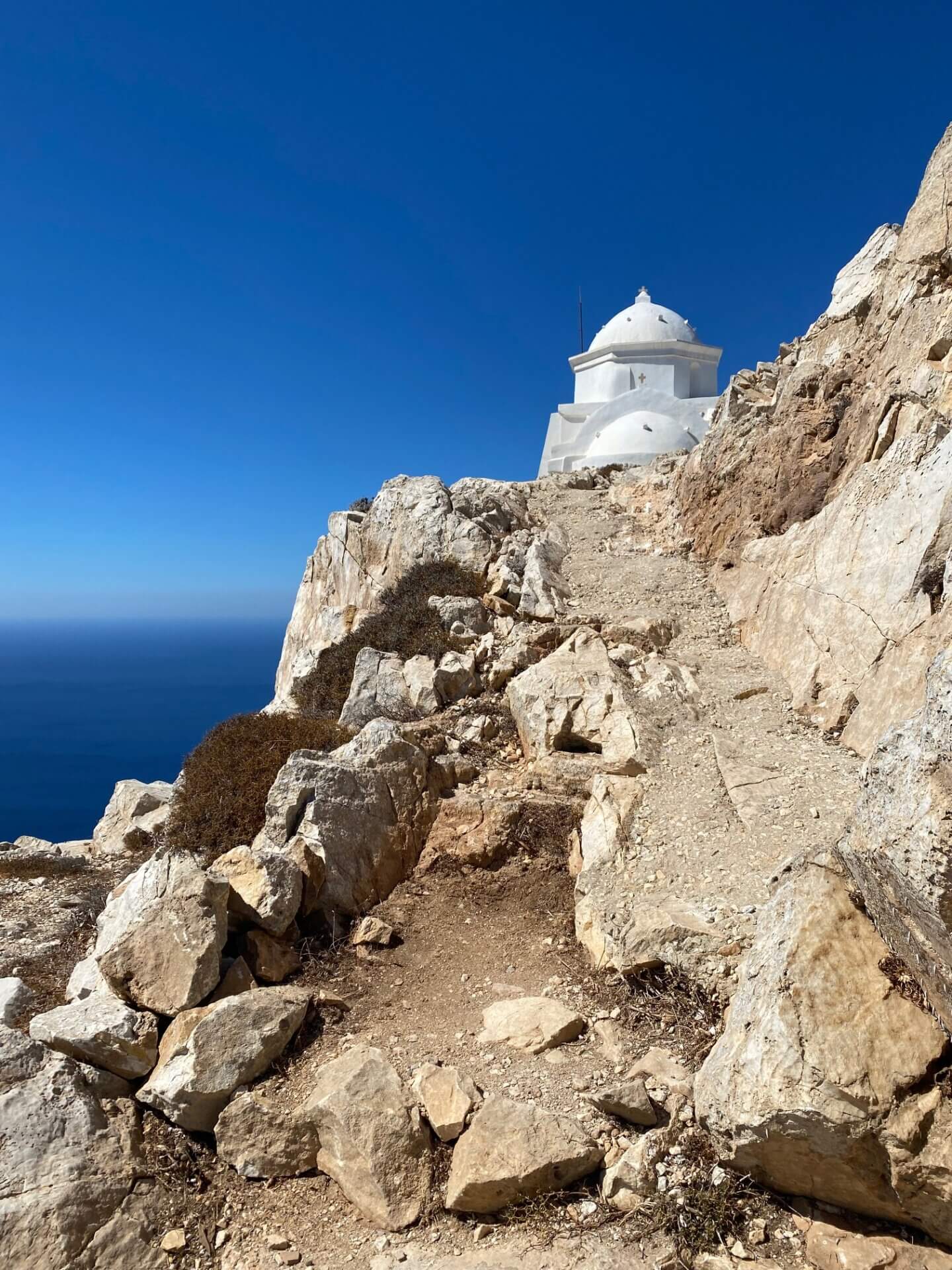
What to expect in High Season
July and August are the peak months when you can expect summer crowds. In the first three weeks of August, Greek people flee the summer heat of Athens and head for the islands too.
The main tourist areas can be overwhelmingly busy so consider some of the smaller islands. July and August will be much busier than normal for them too. But it’s also when you’ll find sea taxis running to take you to some of the most beautiful places
Many Greek beaches are only accessible by boat, so you’ll have a hard time getting to them outside of July and August.
How Do I Decide Where to Go?
Since there are a number of different island groups it can be hard to decide which is the best option, especially for your first trip.
What Are You Looking for?
My advice is to start with what are the most important things to you. For example, are you looking for amazing beaches?
Perhaps you want somewhere with good hiking trails, masses of history, a great nightlife, particularly delicious food or that’s perfect for families.
Maybe you’re looking for the perfect place to hide away and relax, far from other tourists. Once you know what you’re looking for from your trip you can start to narrow down the best places for those things.
Then you can look at how to travel between those places or find alternatives that are closer to each other.

How Long Do You Have?
Another big consideration is how much time you’ve got. If you’re really limited and are spending time in Athens then hopping about the Saronic Islands might make the most sense.
Alternatively, if you’re besotted with social media pictures and videos from the Ionian Islands then just go ahead and book there and cross it off your bucket list!
What Temperatures Do You Want?
Be aware that like other European countries, Greece in the summer season gets HOT. The Peloponnese is renowned for its scorching temperatures. One of the reasons some of the islands are so popular is because of the winds that help keep the temperatures down.
Less is More
My biggest piece of advice though is not to try and cram too much in. Less is more when it comes to deciding on how much of the mainland to explore or how many islands to visit.
Ferry travel can take up a lot of time. And although it’s a quintessential part of Greek travel, you don’t want to be spending more time on a ship than at your destinations.
Although you might be keen to see as much as possible, make time to just absorb the Greek culture, sample local food and watch the world go by. You can always add places to your list to visit next time.

Should I Avoid the Main Tourist Destinations?
People will tell you that Santorini and Mykonos are overrated, touristy and not the real Greece. I can’t deny they are touristy and that there are many other islands to discover (not to mention mainland Greece).
Greece is a beautiful country and there are many popular destinations to choose from as well as off-the-beaten-track options.
But I can’t say that Santorini is overrated. It’s about the most popular tourist destination in Greece for a reason. The view of the caldera is truly spectacular and it’s something I think is worth seeing once.

Similarly, Mykonos is a rather unique and diverse place. I used to think it was a really tacky destination for package holidays from the UK.
But having been, there’s something about seeing all the wealth and the way other people live that always makes me want to up my game.
I think it’s fun, glamorous and inclusive and it does have beautiful beaches. The Unesco World Heritage Site of Delos next door is really special too.
I think it’s nice to go to Mykonos for a short time but include some other islands in the mix. Tinos right next door is a great place to combine with.
Should I Fly to the Greek Islands or Take the Ferry?
The most common way of getting to the islands is via ferry. I recommend it although I know it’s not the easiest way for everyone. If you have children then flying might be easier than the sensory overload and organised chaos that comes with getting the ferry in high season.

For more information about flying see the Best Greek Airlines For Island Hopping .
Things to keep in mind about flying:
- some of the large islands do have national or international airports but lots of islands don’t
- if you’re going to smaller islands like the Small Cyclades you could fly to Naxos and then get the boat from there
- Athens is a hub and most island flights radiate out on “spokes” so you’ll have to fly in and out of Athens to get from island to island
- there can be a few exceptions in peak times like flights directly between Santorini and Corfu
- leave enough time between arriving on an international flight and your departure time for the islands (about 3 hours)
If you decide to fly then I recommend Skyscanner to book your plane ticket. They show you all the flights to a particular location on the date you specify, or across the whole month.
If you’re booking connecting flights then they also offer you options to buy tickets through travel agents.
That can be helpful if you’re booking connecting flights as you’ll have more support if you’re delayed on the first leg and miss your connection. Note that Delta has partnered with SKY Express to offer tickets all the way through to your final destination.
What is the best website for Greek island hopping?
If you’re heading to the Greek islands then get on FerryHopper.com , I love it. It’s the easiest site I’ve found to search for dates and several “hops” at once.
Plus they send you an email with all your booking details filled out so it’s super easy to check in online with just a single click.
Once you check in they’ll send you e-tickets so you don’t have to go and collect paper copies. (There are a few exceptions to this but you can see when booking if e-tickets aren’t available.)
When Should I Book my Ferry Tickets?
If the ferry schedules are out, then the best time to book your tickets is probably as soon as you’ve booked your hotel. If the schedules for the month of your visit aren’t yet published then just keep checking back.
See: Greek Ferries Guide for People Who Don’t Know Where to Start
People will tell you it’s fine to get your tickets on the day of travel. And while I am a last-minute person I wouldn’t advise leaving this too late.
One, if you do need to collect paper tickets it’s better not to be rushing about trying to get them. And two, tickets do sell out. It doesn’t happen all the time, but in the summer season, I have seen sold-out trips.
Plus there are finite numbers of economy seats, cabins and pet cabins, so if you want any of those you need to book when they’re available.
What do I need to hire a car in Greece?
I’ve answered all your Greece car hire questions here and tell you everything you need to know about driving in Greece here. Depending on where you’re coming from you probably won’t need an International Drivers Permit now but do check.
For many islands, it can be good to hire a car to really explore. But it depends on how long you’re staying and how comfortable you are about driving in Greece whether it’s worth it.
People can find driving on the islands a unique experience and sometimes one that’s more stressful than it’s worth.
Think twice (or three times) before hiring an ATV /quad bike. They’re really not safe and there are tons of accidents each year (many fatal).
See Do I Need a Car in Naxos?
Using buses on the islands
Bus facilities on the islands vary greatly. Places like Paros and Syros have good frequent buses around their islands. Mykonos has good transport to the various popular beaches there.
Where I stayed in Tinos there were only buses on Mondays. But the more popular parts for tourists had pretty regular routes. I’ve included bus information as part of many of the island guides.
During July and August, there are usually a lot more buses serving popular routes. Outwith these months buses can be cut right down or entire routes stopped altogether. If there are a few of you travelling together it can often work out cheaper to get a taxi.
Often there’s a small bus stop/shelter on one side of the road where you can wait for the bus. If you need to travel in the other direction just wait opposite it if there’s no obvious sign of a stop on the other side.
Luggage on Buses
In Greece, you put your luggage or any big or bulky items in the storage areas under the bus. If there are handles on the doors just open them up and put your suitcase in yourself. If there are no handles then the driver will open them up from the dashboard.
Keep valuables with you but I’ve always felt comfortable leaving the rest of my stuff under the bus. It was the same in Spain when I lived there.
Don’t try and take your stuff onto the bus with you. You can’t take up a seat for your bags and there’s not much space to put them anywhere else.
Paying your fare
On some buses, you pay the driver directly. On others, you take a seat and a conductor comes round and takes your money. I’ve seen both options on the same route too, sometimes. It’s usually ok to pay with notes if you don’t have change.
All About the Money
How can i exchange dollars or access euros in greece, euro only in greece.
Just to clarify, Greece uses the Euro. I’ve seen a surprising number of people ask if it’s possible to pay in US dollars when you get here. The answer is no.
However, if you’ve been travelling in Turkey, I can understand why you might think you can use alternative currency.
Exchanging money at the airports
You can exchange money at Athens airport. If you fly directly to an island then this is also possible in some places like Rhodes, Crete and Mykonos.
However, it’s always likely to be more expensive than if you were to exchange money with your bank at home before travelling.
Withdrawing foreign currency from the cashpoint/ATM
As I fly by the seat of my pants a bit, I tend to withdraw money from the cashpoint when I arrive. You get charged a fee each time but I don’t think it’s more than what you would pay to an exchange place.
Because of the fee, make sure that during your stay you pull money out in chunks rather than frequent, small withdrawals. The ATM will usually ask if you want the conversion to be in Euros or your home currency converted.
My bank won’t let me do this, but if you can choose the Euros option for calculating the amount.
(Side note: same when you’re paying by card. Sometimes the card terminal will ask if you want to be charged in Euros or your home currency like Dollars or Sterling. Choose the Euro option as it’s pretty much guaranteed to be cheaper for you.)
Have Cash When You Arrive
It’s probably sensible to have at least a bit of cash on you when you arrive in Greece. Many taxis won’t take cards. So at least if you have some physical money on you, you can get to your hotel. (Assuming you haven’t already organised some kind of transfer.)
The airports have ATMs but from time to time these things don’t work and the smaller airports won’t have a lot of options.
Having said that, I’ve asked taxi drivers to stop at ATMs on the way to where we’re going plenty of times (because I’m highly disorganised at times). Although, perhaps it’s not ideal for a female traveller, especially if you’re travelling at night in an unfamiliar area.
Avoid Euronet ATMs
Look for a normal bank ATM rather than these yellow and blue convenience ATMs. They’re installed in smaller, touristy areas, often next to tourist supermarkets. Usually, they’re seasonal too and only operate from April to October.
The exchange rates aren’t good and they charge a much bigger one-off fee to use them. They’re ok if you’re stuck – hence paying more for convenience – but I’d advise against using them regularly.
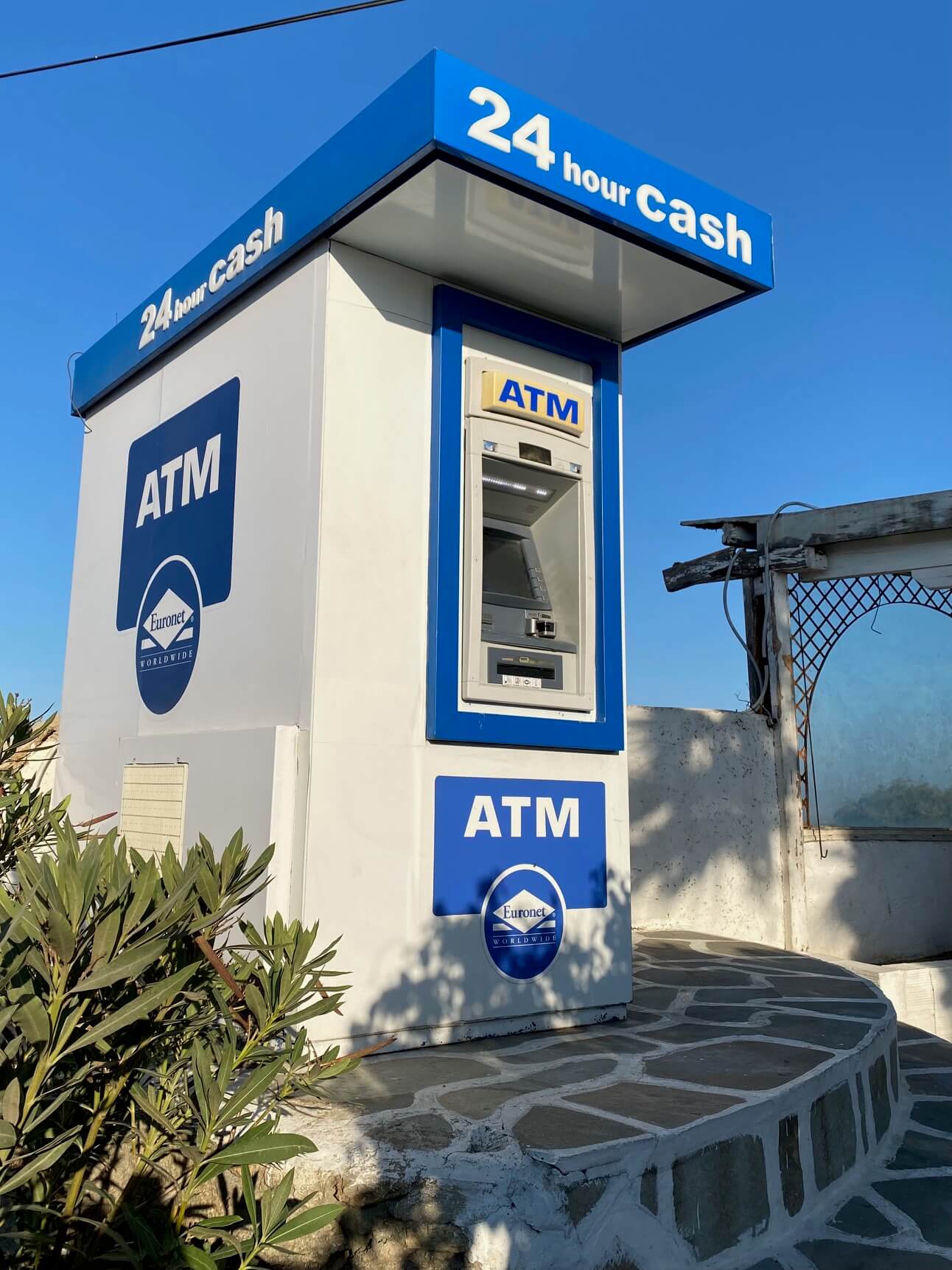
Paying by card in Greece
I use my contactless bank card for most things in Greece. However, I heard that a lot of US credit cards don’t have this facility. You can still use chip and pin or you may be asked to sign the receipt.
A lot of taxi drivers won’t accept cards and some smaller shops and restaurants may not either. Of those that do, American Express and Diners Club are probably less widely accepted than others.
As I mentioned above, if you get the option on the PDQ machine, it’s usually the most cost-effective to pay in local currency. I.e. choose the option to pay in euros rather than in dollars or pounds or whatever you’re home currency is.
How Does Tipping Work?
Tipping is different to what you’re used to if you’re from the USA. It’s normally just to round up your bill after a meal and just leave the change. Otherwise leaving 1 or 2 euros in the dish when you leave the table is normal.
For tour guides and private drivers, you can leave more but all of it is up to you and the type of service you received. People won’t be expecting the type of tips you might leave in the US but they will appreciate anything you do give them.
What to Pack and Wear
My first piece of advice here is to pack light. If you’re going in the winter months that’s a bit easier said than done. And if you’re hiring a car and exploring only on the mainland then it’s less of a worry how much you take. You can chuck everything in the car and off you go.
But if you’re going to the islands in the summer months then I’d really aim to only take hand luggage. It’s the best way to do things since you’ll encounter lots of steps, uneven pavements, dirt roads and the like.
Having said that, if you’re arranging transfers everywhere to your hotels and someone else is taking care of your luggage, it’s less of a concern.
Just tip well if someone’s traipsing up and down the caldera steps in Santorini with loads of heavy luggage. And don’t make the donkeys do that work either.
Pack things that:
- will help keep you cool
- are suitable options on particularly windy days
- can be washed and dried easily
- that work well together so you can make a number of outfits from the same pieces
See What To Wear In Santorini Greece For A Happy Trip, and if you’re travelling in the summer the Ultimate Summer Greece Packing List: What to Pack for the Greek Islands
You’ll also want:
- some cooling shorts to stop your thighs chaffing
- comfortable flat shoes/sandals – you’ll walk miles round ancient ruins and archaeological sites not to mention village steps
- skirt/sarong that covers the knees or that you can use for your shoulders to enter monasteries and churches
- light jumper or jacket for the evening in the shoulder season
On The Beach
Are you imagining yourself on a beautiful golden sand beach by the Ionian Sea, or maybe the Aegean Sea? If so, here are a couple of things you might want to know about Greek beaches.
See also: 11 Top Black Sand Beaches In Santorini for a relaxing day read up on the 10 Best Beach Clubs In Santorini For A Luxurious Day and for golden beaches near Santorini Anafi Island: Beautiful Beaches A Hop From Santorini
Organised and unorganised beaches
These are the categories that Greeks split their beaches into. Unorganised means it’s a normal beach with no beds/umbrellas etc. There may or not be facilities nearby to get drinks or snacks.
An organised beach is one where you’ll find sunbeds and umbrellas and often a beach bar of some kind. Sometimes that’s a little hut and sometimes it’s a full-on restaurant or beach club .
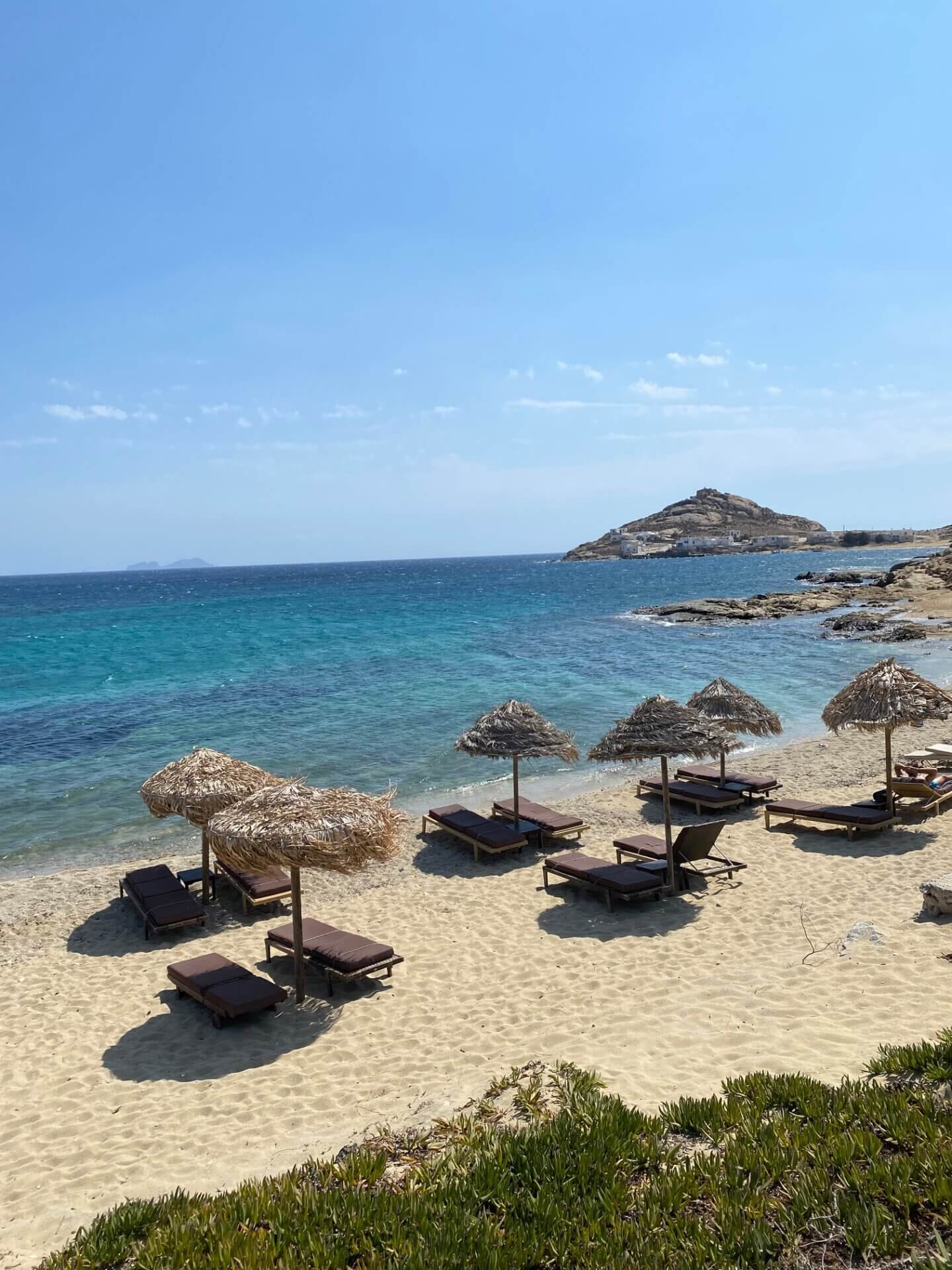
They’re normally a cost involved in taking a bed. It’s either a set charge for a bed and umbrella and prices can be set differently for each row, i.e. you’ll pay more for a front-row spot next to the sea.
Or, you can use the sunbeds if you buy food or drink from the bar. Prices can vary wildly depending on the island.
Usually, there’s some space on the organised beaches where you can lay down a towel so you can go without having to pay for a bed.
Nudist Beaches
Technically these don’t exist in Greece although you might find some on Google Maps. People go topless or fully nude on some of the tucked-away beaches or at the far end of some more popular ones.
Solo Travellers at the Beach
As a solo traveller , I always leave my belongings unguarded on the beach. There are waterproof pouches you can get to take things with you while you’re swimming, but I worry more that I’ll lose everything in the sea.
Make up your own mind about what you’re comfortable doing but know that it’s common for people to do this without a thought. You can always leave your valuables in your hotel room safe.
Dogs on the Beach
Unless it’s a Blue Flag Beach, dogs are allowed on Greek beaches so be aware of that.
Getting Around
There is an Uber app in Athens but it will just call you a normal yellow taxi. I haven’t used it but have used the Free Now app many times which is the same sort of thing.
See also the 15 Best Apps For Greece Travel In Athens & The Islands If you’re heading to Santorini this is a must-read Santorini: How To Get Around By Car, Quad, Bus & Taxi As is this if Mykonos is on the agenda Get Around Mykonos Easily: Travel the Famous Island |
Public transportation in Athens is good with an easy-to-use Metro system , train travel, a tram network and many buses. On the islands, the quality of public transport really varies, particularly on the small islands. Check my island guides for getting around before you go.
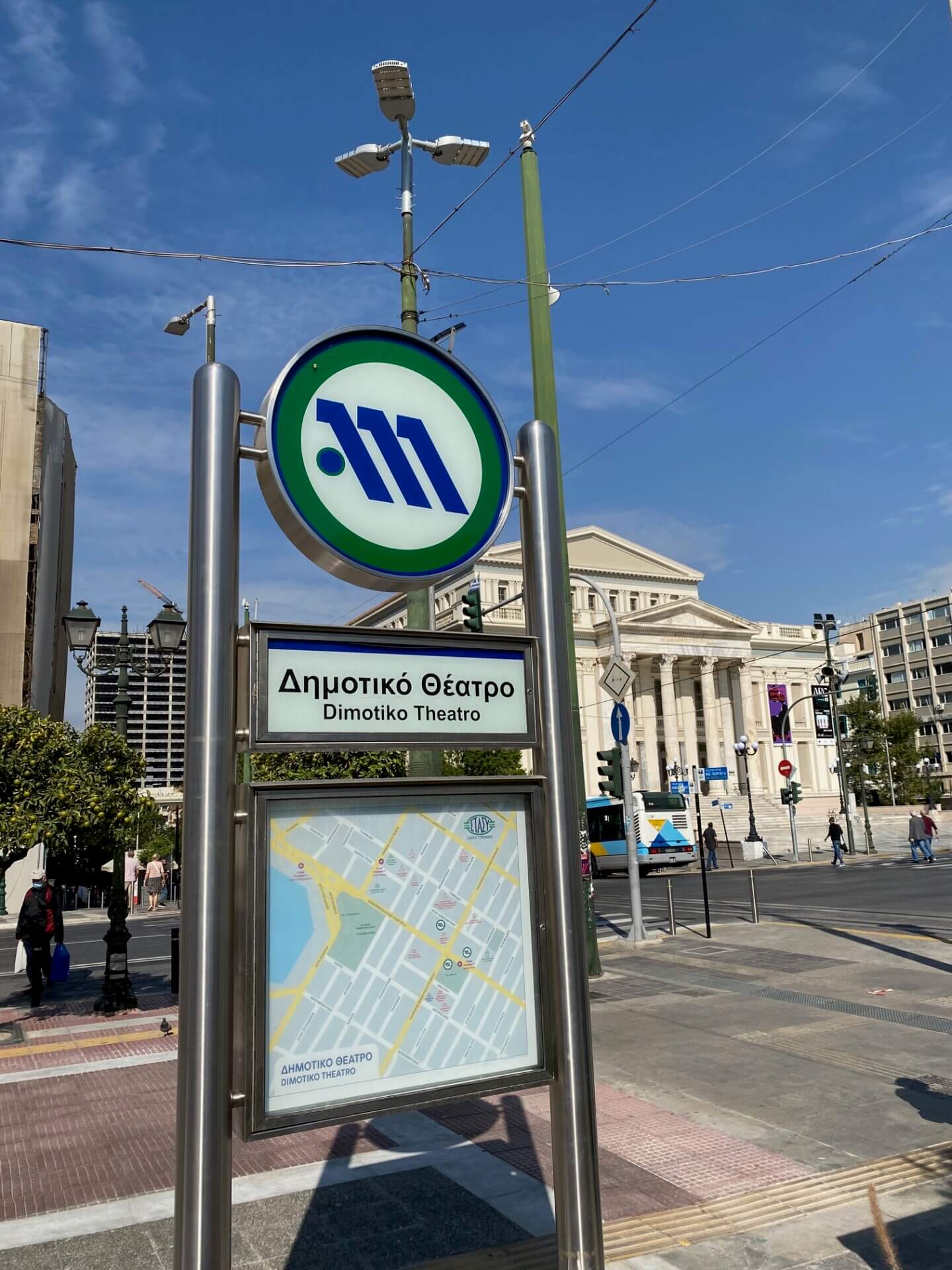
Do I Need to Be Concerned About Petty Crime?
Like all big cities, Athens does see some petty and opportunistic crime, particularly in touristy areas. When you’re in the city centre wherever you’re visiting be sensible with your belongings.
I’ve heard of a lot of tourists from the United States who like to use a money belt under their clothes. I haven’t done that, but I do tend to keep my valuables zipped away in an internal pocket in my bag.
Keep your bag close if you’re enjoying a meal at a Greek restaurant in tourist area or when you’re around tourist sites. Don’t make it easy for someone to grab your stuff.

Also, keep your wits about you on the Metro and around the city in general. Some groups have scams where they’ll divert attention and then pickpocket.
In rural areas like on the islands, things are very laid back. It can be one of the best things about them! You might be asked to leave the keys under the mat in your rental car when you go.
Or if you arrive at your hotel late at night, they’ll just leave the key in the door for you.
Accommodation FAQs
Why am i being asked for my passport number.
It’s quite common in Greece to give your passport number for things so don’t be alarmed. It’s not about recording you, it’s about the recipient allocating payment for tax purposes.
Hotels will normally take a copy of your passport when you check-in. That’s normal in many countries.
Every Airbnb needs to take your name and passport number to be recorded for tax. I’ve also had to give my passport or Greek ID when I’ve booked a car through an app (using iMove in Mykonos, for example) or other private transfer.
What is the city tax I’m being charged?
City tax is a compulsory charge that you often have to pay in cash at your accommodation even if you’ve paid for your room online. Sometimes, it’s included if you’ve paid upfront on booking.com or similar.
The listing will tell you when you book whether the city tax is included or not.
If you need to pay it when you leave, it’s usually around 50 cents per night, although I think Santorini’s is a bit higher. You need to pay your city tax in cash.

Why am I being asked to pay by wire transfer?
In the UK and Europe, it’s not at all unusual to pay friends or sometimes businesses by bank transfer. That might be different to what you’re used to if you’re from the US. But don’t immediately think you’re being scammed.
Even established hotels might ask for you to pay this way. I’ve noticed that a lot of businesses in Greece use a Facebook page as their website. So many simply don’t have the facilities set up to take payments online.
If you feel uneasy about any transaction, then go with your gut. But just be aware it’s not necessarily an unusual request. I saw a thread in a travel group on Facebook where someone asked about this and all the advice was that it must be dodgy and to stay well clear.
People were saying this particularly because the accompanying email was written in less-than-perfect English. Understand that the culture is different in different countries.
Also, be aware that if someone is responding to you in a second or third language, their English is unlikely to be perfect. It doesn’t mean there’s an issue.
Day-to-Day Practicalities
When are greek public holidays.
You can see upcoming Greek public holiday dates here. Shops and businesses are normally closed although tavernas remain open. During the summer season, touristy places will run on.
Orthodox Easter is usually end of April/beginning of May and can be a busy time for accommodation and ferries.
15th August Holiday (called the Fifteenth of August!) is also a huge day in Greece. The islands can be ferry crowded as Greeks are usually on holiday with their families at that time anyway. Tinos is mobbed on this holiday.
Do shops/Stores close on Sundays?
Sundays are also public holidays, but touristy places during the summer season will open all week. In the off-season, you might find some mini-markets / small stores that are also open on Sundays.
Chemists/pharmacies on the islands are usually closed at the weekend, although it varies. When I lived on Paros, they were open on Saturdays, but that wasn’t the case when I lived on Naxos. There are phone numbers on the door for each weekend though, that will tell you which pharmacy is on call for emergencies.
Main supermarkets are usually closed on Sundays.
Are the opening hours on Google Maps accurate?
Be aware that many businesses are seasonal. Often they put in their opening hours for summer and then leave them year-round. Probably they don’t expect people to be looking in the off-season.
If you’re travelling in the winter, you can see if the business has updated its hours recently. (You can see if there’s a message from Google saying the hours have been updated X number of days or weeks ago by the business).
If there’s no message and you’re making a special trip, then call before you go. Other restaurants and tavernas are really helpful and mark themselves as temporarily closed.
What are afternoon quiet hours?
Quiet hours are like Spanish siesta times. They change with the season but are usually around 3/3:30pm – 5-6pm.
Because it gets so hot in summer Greeks stay up late to take advantage of the cooler air and then sleep in the hottest part of the day. You’ll see whole families, including toddlers, going for a walk or a meal at 10pm.
Business hours for shops are usually along the lines of Monday and Wednesday 9am – 3pm and Tuesday/Thursday/Saturday 9 – 2pm and 5:30pm – 9pm . It can vary a bit and some places don’t open again on Saturday evenings. Department stores and supermarkets tend to stay open all the way through.
The quiet hours between 2/3pm and 5:30pm are taken seriously. You aren’t allowed to blare music from your car radio, talk loudly outside etc and builders can’t usually work through quiet hours. It’s like breach of the peace after 11pm in the UK would be.
Please be respectful of quiet hours. In island villages, holiday accommodation is often mixed in with residential accommodation and in very close proximity.
Be aware that people in the apartments around you might be sleeping in the afternoon. They usually have to get up early after being up late so they need the extra nap time.
Power Sockets, Plugs and Voltage
The plugs, sockets and voltage in Greece are different to many areas of the world. Unless you’re coming from somewhere with European appliances you’ll need a travel adapter for your device plugs. You might also need a converter so that your items work on the Greek voltage and electrical frequency.
See also: Power In Greece
Where can I do laundry/washing?
If you just want to do a little bit of handwashing during your stay, don’t bother bringing travel wash. Pick up a small box of powder from the shop. It’s really cheap, I think it’s more effective, and many places will provide a small washing bowl in your room

Chuck everything in overnight, rinse it and hang it out to dry in the morning.
For a mid-stay load make sure you book at least a night or two in an apartment with a washing machine. Or head to the local laundry/laundrette.
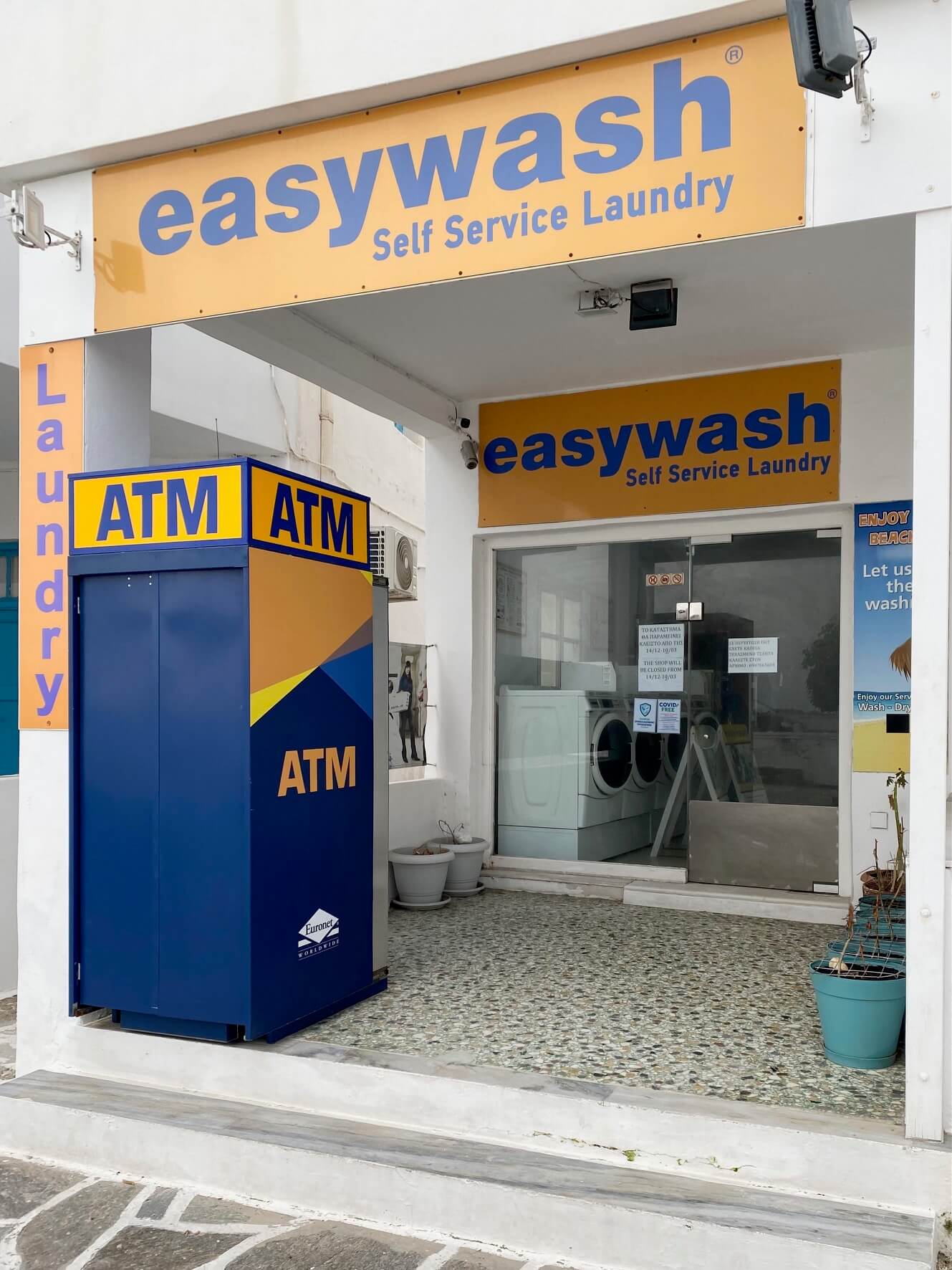
Note that not every island will have a laundry, and many that do literally are laundries, not self-service laundrettes. I’ve used a few in different places, and the turnaround time has been about 2 hours.
On average, I’ve paid between 5 euro for wash up to 15 euro (Santorini) for wash and dry. Although I think one place in Mykonos was something ridiculous, like 18 euro. If you don’t want them to use fabric softener you need to really insist that they don’t.
I usually just get my stuff washed and I dry it where I’m staying as I think that’s much nicer to dry it outside. However, it will depend on the size and facilities of your accommodation plus the time of year you visit.
Easywash is a brand of self-service laundrettes and you can see all their locations here . You can also use Google Maps to find laundries in the area you’re visiting. This post on 15 Best Apps For Greece Travel might be helpful.
How do I open the windows/doors?
Ok, this sounds like a random one. But I know from my experience in the hospitality industry, and now in Greece, that windows and doors can flummox visitors in different countries!
The type of window below is quite common in Greece (and Europe), and the same design is used for doors too.
If you’re playing around with the handle to see how it works, you can get a fright when the door angles back from the top. The first time I encountered a door like this in the UK, I thought the whole thing was falling on me!
Close the window with the handle down
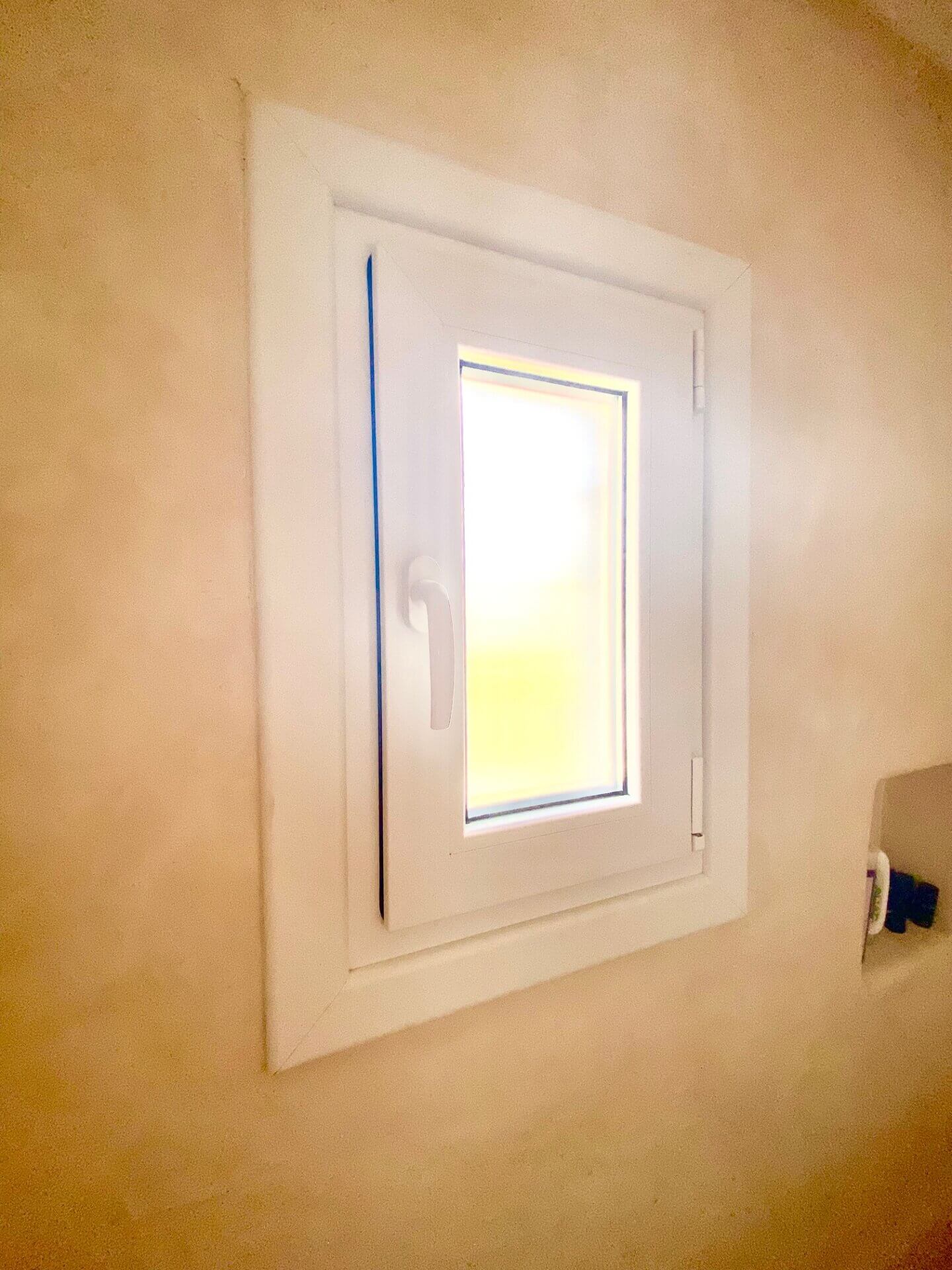
Turn it 180 degrees, and it opens at the top only (secure but lets air in)

Turn it 90 degrees, and it opens normally

How do I get hot water?
Solar-heated water is common in Greece. You’ll have water when the sun has had a chance to heat the tank. In that case, you might not have water first thing.
Once the water’s heated, it could cool down in the evening if it’s not hot enough outside to keep it warm. So, you may need to be strategic about when you have a shower.
Some water tanks are heated electrically, like an immersion heater. More than likely, the switch on the fuse board will be kept off until you need it.
If you’re staying in an apartment or villa, this might be the case. If so, you’ll need to flip the switch for about 20 minutes to let the tank heat up.
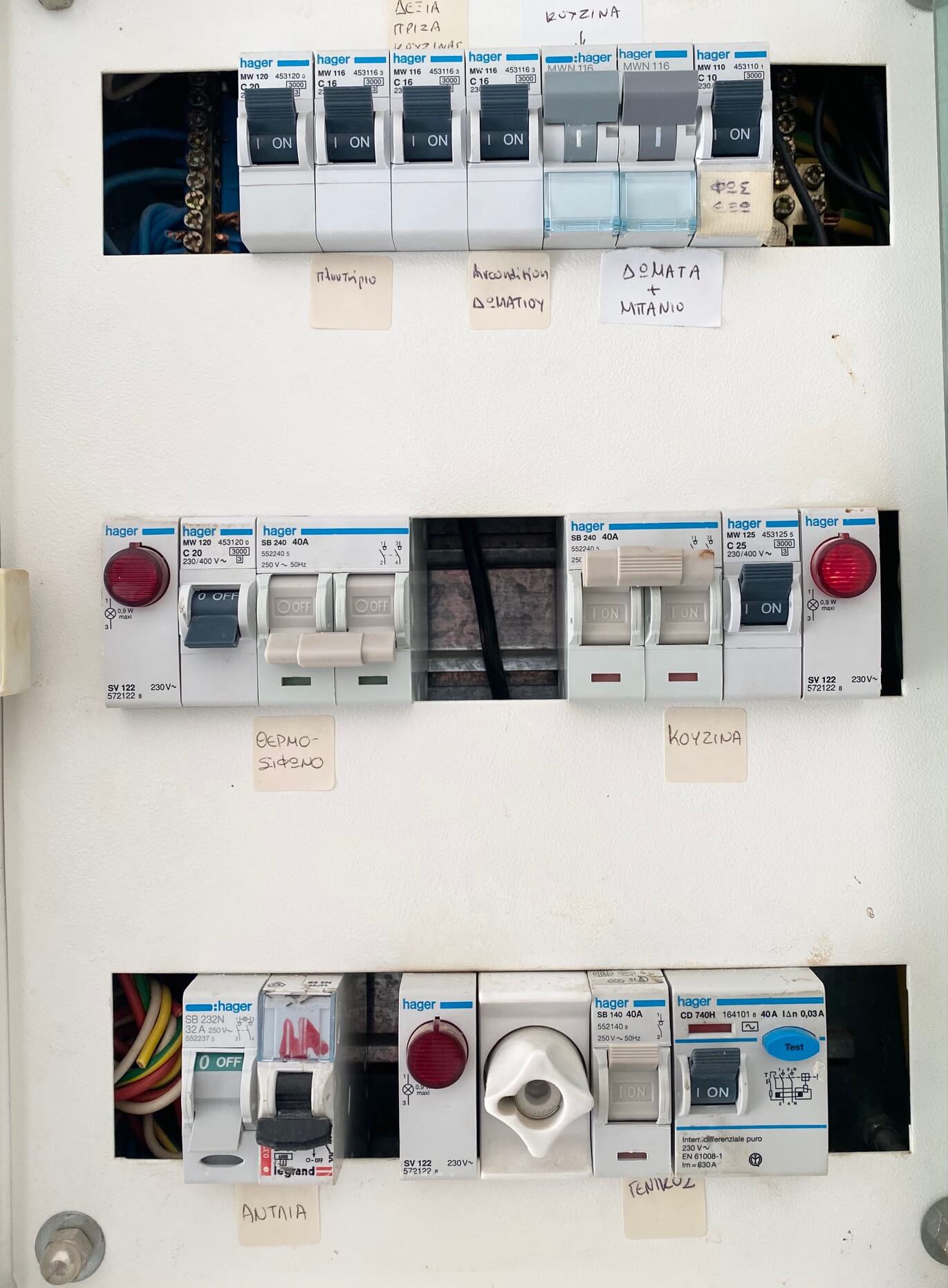
Make sure you turn off the switch before you get in the shower. Water and electricity don’t mix, and standards of installation might not be as high as you’re used to.
Can I drink the tap water?
The general answer you’ll find on the islands is no, however, there are exceptions. Like on Paros . But don’t worry, you don’t necessarily need to buy single-use plastic bottles for your whole stay.
The Greek water supply is subject to the same levels of cleanliness as the rest of the EU. Unless you’re somewhere remote you’re getting water from the mains.
So cleanliness isn’t really the issue. It’s more that seawater can mix with the mains water. Many islands don’t have desalination plants and don’t remove any of the excess minerals/salts that the water contains.
@bucketlistmylife Don’t drink the tap water here! Walk with me… #greekislandlife #bucketlisters #over40andloveit #housesitter #naxos ♬ From Now On – Hugh Jackman & The Greatest Showman Ensemble
If you’re in cities like Athens, it’s ok to drink the water from the kitchen tap. However, on most islands, you’ll be told not to do that. The villages have public taps in the street but check locally whether this is good to drink.
In some places, I understand they’re supplied by a spring, and it’s fine to drink. In other places I’ve stayed, the public taps in the village were the same as the kitchen tap water, and I was told it was not a good idea to drink from.
10 litres of water for 10 – 20c in Syros and Paros, Free in Andros
In the supermarket, a 1.5l bottle of water will cost about 30c. Although there’s a big awareness campaign on Paros to show people the water is safe to drink, you might still prefer filtered. In which case you’re in luck.
Syros and Paros both have big units in several points across the islands where you can get 10l of water for 10c (Paros) or 20c (Syros). You’ll obviously need a few bottles to fill, or ideally a 10l container. Find out more about the locations in Paros here .
In Syros, I’ve seen them on the road to Vari (just before the village, travelling from town) and on the big roundabout along from the Lidl and the bus station, where the taxis stop. Ask about them at your accommodation.
In Andros , these machines are free to use.
Is it true I can’t flush the toilet paper ?
Yes, it is. Greece was ahead of its time and invited toilets before toilet paper was a thing. Therefore, the pipes used were really narrow. As things changed, it didn’t make sense to overall the entire country’s plumbing system so the same tiny pipes are still used today.
You’ll find a small bin in the toilets where you throw your toilet paper (and anything else you need to dispose of).
The bin bags get thrown out with the normal rubbish when they’re full. If you’re staying in a hotel or serviced apartment, housekeeping will come in regularly to remove and replace your bin bags.
I hate it, and as a rule, I take the bin bag out myself. What a horrible job for someone else to have to do for me. If that’s not practical, I always tie the top to try and make it marginally less unpleasant.
Are public toilets easy to find?
It’s generally quite acceptable to pop into the nearest taverna and ask to use their loo. I always think it’s polite to buy a drink to take away, but I’m not sure it’s expected.
You will find public toilets on the more popular islands, but the state of them can’t be guaranteed. I’d recommend always having some tissues in your bag. Oh, and they’ll likely be holes in the ground with a porcelain plate to stand on.
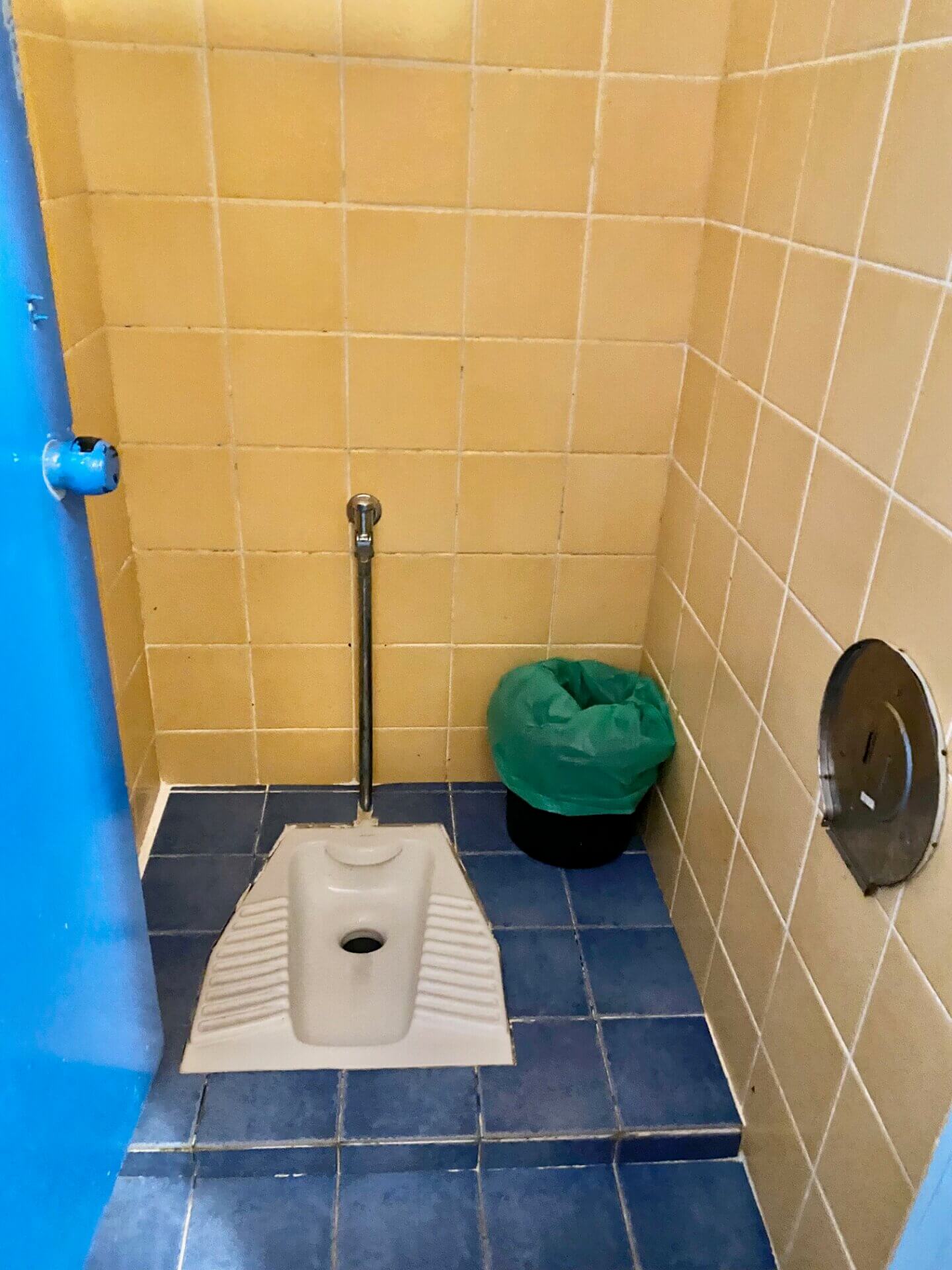
There’s often a toilet at the port of the larger islands. In my experience, they’re generally not awful during the peak season.
Alternatively, petrol stations usually have public toilets. The larger chains like BP mostly keep them in good condition. Local ones might ask you to wait a moment while they clean it for you!
Supermarkets are another option you can ask in. AB Supermarkets always seem to have a decent customer toilet.
Travel Insurance
All I have to say about this is make sure you get some for Greece travel adventure. Get something that repatriates you to your home country if you have an accident or get ill with something like COVID.
Historically I’ve been really rubbish with this because a lot of my travel was within the EU while the UK was part of it. But I’ve heard a lot of horror stories recently about people travelling without insurance. (Globally, that is, not necessarily in Greece.)
Insurance will cover you if there’s an issue with your flights or baggage (check the terms carefully) as well as medical issues. So it can really save your vacation if things go awry.
Animal Welfare
It’s really common to see stray cats all over Greece . They’re supposed to be cared for by the local Municipality (council) who should provide water and dry food.
But often, the responsibility is, wrongly left to animal welfare associations. These are usually set up by foreigners.
You can help by taking a cat to the vet to get neutered; perhaps talk to the welfare association first. A clip in the ear means that a cat has already been sterilised.

If you’re self-catering for any part of your trip and are eating anything from a tin can, please crush it before binning it. Many cats live in and around the bins, and they will scavenge anything.
If there is the tiniest bit of food in a can, they’ll get their head in to eat it. The problem is, they can’t always get their head back out again. So please crush your cans .
Although there used to be an issue with packs of stray dogs, over the last 10 years, that’s really changed. At least on the islands. On the mainland, particularly in the north, I’m aware that you might still encounter packs of dogs.
However, you will still see stray dogs on the road. Sometimes it’s hard to know whether they really are stray. Many Greek owners let their dogs run about on the road. If a dog has a collar on then that usually means it belongs to someone.
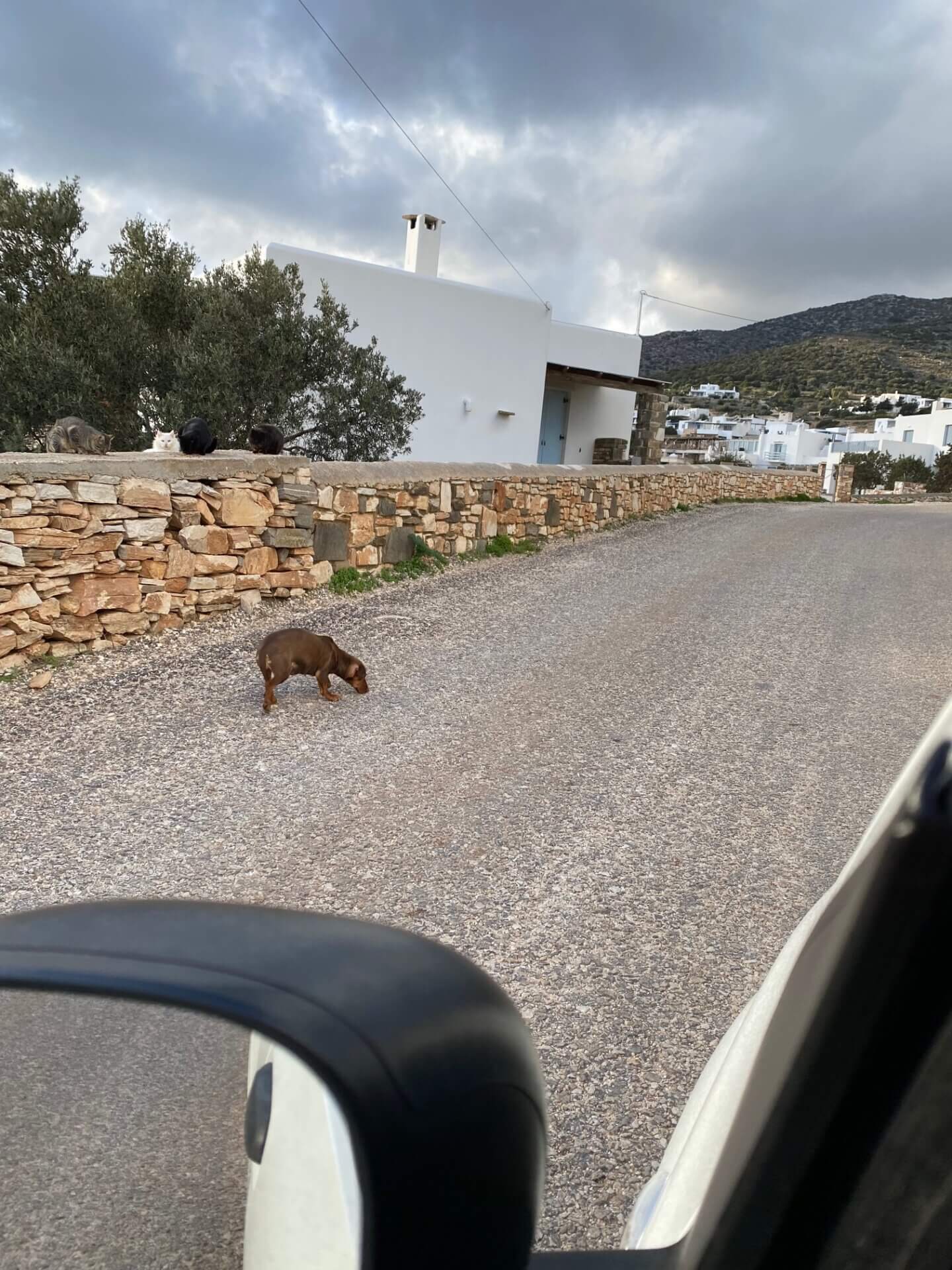
If you see a dog in a bad way, regardless of whether it has a collar, report it to the island’s animal welfare association.

Farm animals
Many Greek farmers are using modern farming techniques and treat their productive animals well. But something you might see is hobbling, where horses, goats, sheep and cows have their front and back legs tied together with rope or wire.
This is illegal and you can report it to the local police. You need to take pictures but there are guidelines you can read here
Visiting Greece in Winter
A lot of the travel tips I’ve given above hold true whatever time of year you visit the Greek isles. But if you’re thinking of visiting Greece in winter, there are things to know.

Greek Islands in Winter – Do they Close?
This is such a common question. The answer is that no Greek island “closes” in winter . People live on the islands all year round.
But, in terms of what’s available from a tourist point of view, many of the restaurants, shops, services, hotels and tours provided for them do close down over the winter.
If you want to visit the islands between October/November and April, then be aware you’re going to have a different experience than in the summer.
Here’s what it’s like in Santorini in October and November and Paros in October .
You can still enjoy Greek culture and indulge in Greek cuisine. The incredible beaches are still there. But unless you’re a hardened cold-water swimmer, you’re not going to be doing anything other than going for a bracing walk along the sand.
If you want to visit Greece in the winter, you’re best doing a city break in Athens or exploring the mainland.
Here’s what to expect from Greece in November , and Christmas time in Athens .
Island-hopping is still possible if you stick to a particular ferry route. For example, Paros, Naxos, Ios, Santorini. But you’ll be going for the views, hiking and food and not beaches, boat trips and partying.

Important Greece Travel Tips for Winter
- staying in island accommodation that’s designed for the summer isn’t fun in winter. A lot of homes are drafty, damp, have no heating and only have hot water if the sun shines for long enough.
- most touristy tours and trips don’t run in winter. For example, if you visit Mykonos after October/November there’s no way to get over to Delos to see the ancient ruins
- local public transport routes can reduce after the peak season
- ferry routes and flight options vastly reduce after October and sea journey times can be much longer than in summer
- generally, it doesn’t snow on the islands although it can. Mostly, it’s rainy and windy, although it can vary between the island groups
- If you’re particularly looking for snow and cosy cabins, then head to the mainland for ski resorts and mountainous destinations
Do I Need a Visa?
Currently, citizens from the UK, USA, Australia and the EU do not need a visa to enter Greece for a period of up to 90 days within a rolling 180-day period.
From 2025, you still won’t need a visa, but third-party nationals from countries like the US, UK and Australia will need an ETIAS. This is a visa waiver and is required before travel. You apply online and once approved, the ETIAS is valid for three years.

Suzie Young
Suzie writes informative posts for solo, nervous or first-time travellers to Greece, Turkey and other countries on her 50-before-50 bucket list. She became a Greek resident in 2020 and intends to visit every inhabited island (13 down!).
Leave a Reply Cancel reply
Your email address will not be published. Required fields are marked *
Save my name, email, and website in this browser for the next time I comment.
This site uses Akismet to reduce spam. Learn how your comment data is processed .
Taking Money in and out of Greece

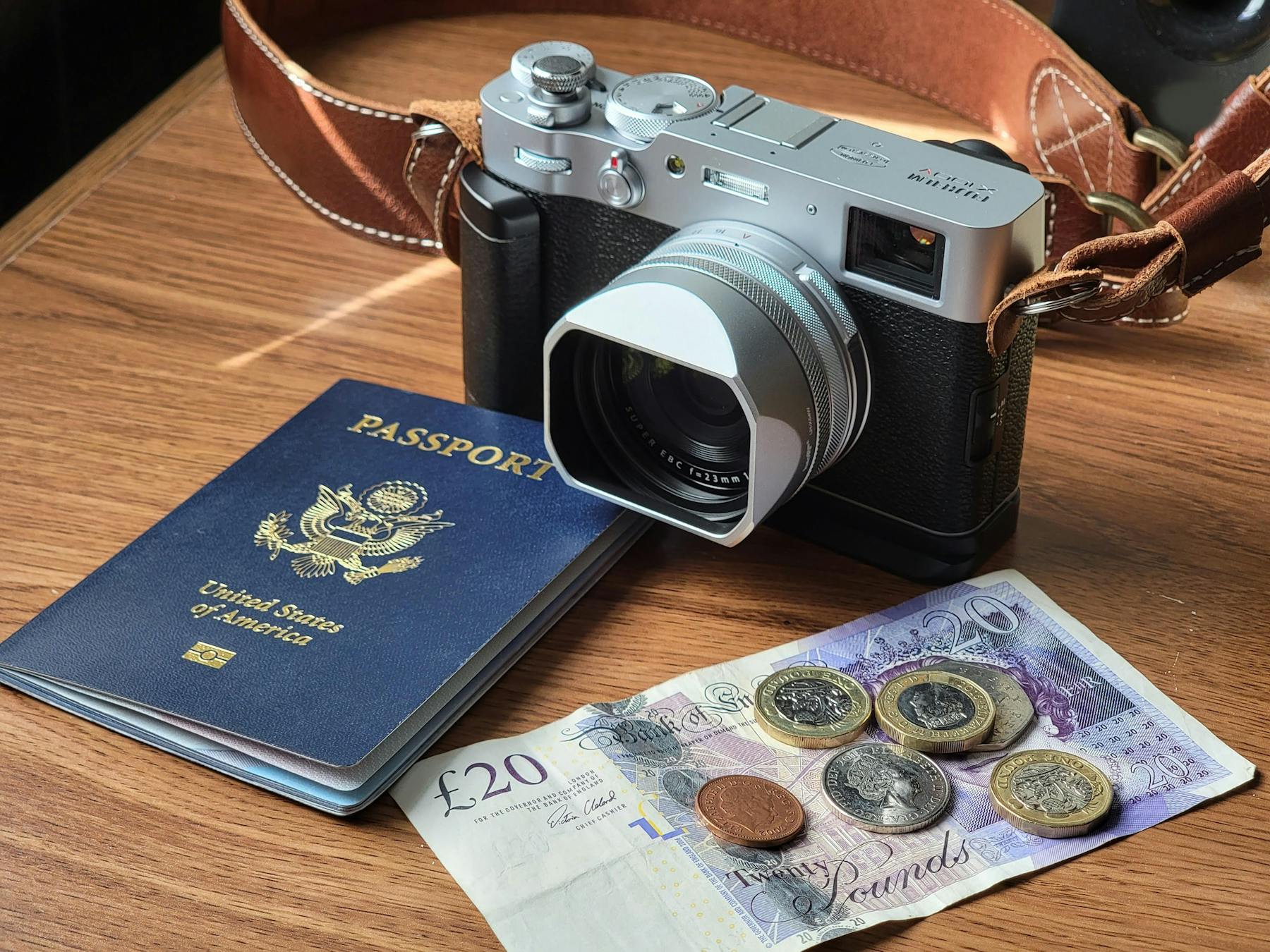
Local Currency in Greece: Can You Use US Dollars in Greece?

Jarrod Suda
A writer and editor at Monito, Jarrod is passionate about helping people apply today’s powerful finance technologies to their lives. He brings his background in international affairs and his experiences living in Japan to provide readers with comprehensive information that also acknowledges the local context.
Links on this page, including products and brands featured on ‘Sponsored’ content, may earn us an affiliate commission. This does not affect the opinions and recommendations of our editors.
If you're visiting Greece for the first time, you may be curious about the accepted currency and what currency you should bring along on your travels. In Greece, the official currency is the Euro (EUR), which we recommend obtaining by using Wise 's travel debit card to withdraw cash from local ATMs.
Using the local currency for your transactions is best when paying for goods and services. At the same time, some establishments in Greece (like hotels) may accept US dollars, be aware that they will set their own exchange rates between the Euro and the US dollar. This will result in unfavorable prices for you as a US patron.
In this guide, we walk through using US dollars in Greece, how to get Euros cheaply with Wise, and why it's more beneficial for you to use the local currency for your transactions to ensure fair and accurate pricing. Let's get started!
Exchange and hold over 50 currencies, including US dollars, with Wise 's multi-currency account. Wise's exchange rate is an industry low compared to the real exchange rate, with only extremely small fees being charged for each currency conversion. | Read our Wise review .
Travel Money Tips For Using US Dollars in Greece
- 01. Can I use US dollars in Greece? scroll down
- 02. What currency does Greece use? scroll down
- 03. How to exchange currency in Greece scroll down
- 04. ATMs and local payment methods in Greece scroll down
- 05. Frequently asked questions about Greece accepting US dollars scroll down
Does Greece Accept U.S. Dollars?
Establishments in Greece do not accept U.S. dollars as a form of payment. You will need Greek currency for cash transactions in Greece. In places that do accept physical U.S. dollars, such as hotels, using them may result in very unfavorable exchange rates or additional fees.
Which Currency Is Best to Take to Greece?
If you have a debit or credit card that does not charge international card transaction fees , then your best option is to simply pay by card throughout your trip. Credit card processors (such as Mastercard, VISA, and American Express) use their own exchange rates, but they are typically very close to the mid-market exchange rate (usually around 0.5% to 0.9% weaker). You can check Mastercard's exchange rates here and check VISA here .
If you want to avoid losing out to those small exchange rate margins , then the best currency to take to Greece is Euros (EUR), as it is the official currency and fully accepted throughout the country. Having Greek currency ensures smooth transactions and eliminates the need for frequent currency conversions.
What Currency Does Greece Use?
Greece uses the Euro as its official currency. It is the primary medium of exchange in Greece, accepted for all types of transactions. The European Central Bank is the central bank that issues the local currency.
What Is the Greek Currency Symbol?
The Greek currency symbol is the sign, €. It is used to represent the Euro (EUR).
Some write the symbol (EUR), with the symbol and value written as follows: 10.99 EUR.
Using and Exchanging Currency in Greece
The most expensive currency exchange services occur at banks, currency exchange kiosks, and some hotels or airports. We have seen exchange rate margins as high as 10% at airports and with PayPal.
This is why we recommend travel cards like Wise , which give you access to multi-currency accounts. Exchange USD to EUR at or near the real mid-market exchange rate , and get access to those Euros in your digital wallet instantly. Then, use your debit card to withdraw from a Greek ATM. Best of all, Wise is completely free to sign up.
Where Can I Buy Greek Currency?
With Wise , you can exchange foreign currency, including USD to EUR with currency conversion costs of 0.5% or lower.

- Trust & Credibility 9.3
- Service & Quality 8.9
- Fees & Exchange Rates 7.6
- Customer Satisfaction 9.6
Wise's multi-currency account makes converting your US dollar balances to Euro balances instantaneous — and at industry-low rates. The free ATM withdrawal allowance with Wise is 200 EUR.
Read our full Wise review to learn more.
Potential Bank Fees
You may experience expensive and un-transparent Greek currency exchange at banks, currency exchange kiosks, and other foreign exchange dealers in touristic or downtown areas. We highly discourage you from using these options, if possible.
Banks and currency exchange services often charge higher fees than Wise. Furthermore, these companies often apply very weak exchange rates on your conversions and pocket the difference as profit. Some providers may advertise their services as "fee-free," but very often fail to disclose the hidden exchange rate margin fee (which averages at 4% to 7+%).
Is It Better to Exchange Money in Greece?
Rates at brick-and-mortar establishments will often be high, regardless of whether you're in Greece or the US. To minimize costs, consider ordering currency from your US bank days in advance and compare their rates to the mid-market exchange rate (You can find the real mid-market exchange rate on Google, XE.com , or Monito ). Pay attention to the margin they charge, aiming for a rate that is well below 4%.
On the other hand, using a digital platform like Wise gives you the flexibility to exchange currency at any time, benefiting from transparent and industry-low rates that are consistently displayed before the transaction. This allows you to make informed decisions based on the current exchange rate.
ATMs and Local Payment Methods in Greece
Using ATMs abroad is often the most cost-effective way to obtain cash while traveling, especially when utilising cards like Wise. One of the reasons is that the withdrawal fees associated with ATMs are typically minimal, around $1 or $2, or even waived entirely if you choose the right ATM or bank.
Additionally, ATMs treat you like a local if you use a travel card like Wise (they don't apply currency exchange altogether). Otherwise, ATMs will use the exchange rate used by your card issuer (MasterCard, Visa, etc). In contrast, airport kiosks tend to have significantly weaker exchange rates, sometimes up to 10% weaker .
Are the ATMs in Greece Safe to Use?
ATMs in Greece are generally safe to use. However, it's best to use ATMs that are attached to a bank rather than a machine standing on its own. Some stand-alone ATMs, especially those in touristic areas, have been known to apply weak exchange rates on your US dollars before withdrawing. This is called a dynamic currency conversion .
Dynamic currency conversion is a process where you're given the option to pay for a purchase or transaction in your home currency instead of the local currency. It may sound convenient, but it often comes with additional fees and unfavorable exchange rates. It's like a middleman converting the currency for you, but they charge you more for the service.
The Bottom Line: Always decline dynamic currency conversions and pay in the local currency to avoid unnecessary costs (i.e. USD in the US, EUR in Greece, etc).
We go in-depth into dynamic currency conversions and how they work in this article .
Where Are the Best Places to Find ATMs in Greece?
Here is a list of the best places to find reliable ATMs in Greece:
- Local bank ATMs: Go for ATMs operated by local banks for lower fees and better exchange rates compared to standalone or third-party ATMs.
- Global ATM Alliance: Deutsche Bank, one of the major German banks, is a member of the Global ATM Alliance. If you hold an account with an Alliance member, you can access Deutsche Bank's ATMs without incurring any ATM fees.
- Avoid airport and tourist areas: ATMs in airports or popular tourist spots often have higher fees and unfavorable rates.
Places You'll Need Greek Currency
While credit and debit cards are widely accepted, you may be in need of cash at small businesses, markets, street vendors, public transportation fares, and some rural areas in Greece.
Do the Restaurants in Greece Accept Debit or Credit Cards?
Most restaurants in Greece accept debit and credit cards for payment. It's common for establishments to display logos indicating the types of cards they accept, such as Visa and Mastercard. However, it's always a good idea to carry some cash, as smaller or independent establishments may have cash-only policies.
As a travel tip, know that tipping in Greece is appreciated, but not as expected as it is in the United States.
Frequently Asked Questions About Using US Dollars in Greece
No, establishments in Greece do not accept U.S. dollars as a form of payment.
You will need Euros, which you may instantly and digitally exchange for by using Revolut's multi-currency account.
The Euro (EUR) is the official currency of Greece.
The Euro is often denoted with the following symbol: €.
Exchange currency instantly with Revolut . You may also withdraw cash from ATMs. Bank currency exchange and airport kiosks will be the most expensive method to exchange currency in Greece.
We recommend that you exchange currency instantly with Revolut or get Euros in cash at local ATMs.
Expect exchange rate margins of between 4% to 7% for foreign exchange at traditional Greek banks.
Brick-and-mortar money exchange will be expensive regardless of if you exchange in the United States or in Greece. We recommend Revolut to help you avoid fees and inconvenient brick-and-mortar exchange.
ATMs in Greece are generally safe to use. However, it's best to consider using ATMs that are attached to a bank rather than a machine standing on its own.
Yes, most restaurants in Greece accept debit and credit cards for payment.
Other Guides On Travel Money, US Dollars, and Euros
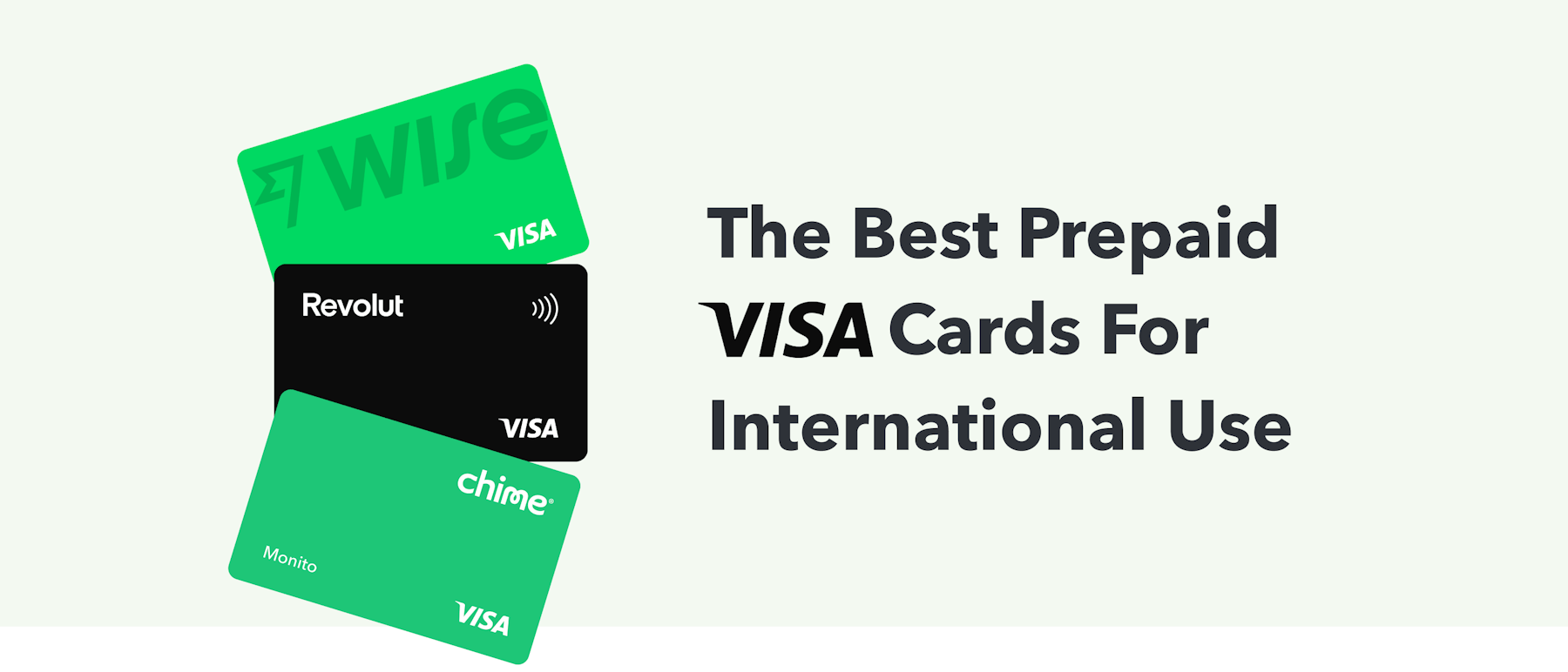
Why Trust Monito?
You’re probably all too familiar with the often outrageous cost of sending money abroad. After facing this frustration themselves back in 2013, co-founders François, Laurent, and Pascal launched a real-time comparison engine to compare the best money transfer services across the globe. Today, Monito’s award-winning comparisons, reviews, and guides are trusted by around 8 million people each year and our recommendations are backed by millions of pricing data points and dozens of expert tests — all allowing you to make the savviest decisions with confidence.
Monito is trusted by 15+ million users across the globe.
Monito's experts spend hours researching and testing services so that you don't have to.
Our recommendations are always unbiased and independent.

Kinda Frugal
12 Ways to Save Money When Traveling to Greece
Posted: July 5, 2023 | Last updated: July 5, 2023

Book Well in Advance
Strategic planning is the key to affordable travel, and Greece is no exception. Booking your flights, accommodations, and tours several months in advance can help you snag early-bird deals and save a considerable amount. Keep an eye on various booking platforms and airline websites to compare prices and get the best deals. This simple yet effective strategy allows you to optimize your budget without compromising your Greek adventure.

Choose Off-Peak Travel
Traveling to Greece during the peak summer season can be expensive due to the surge in tourism. But Greece’s pleasant weather and rich culture can be enjoyed throughout the year. Opt for off-peak travel during the shoulder seasons – spring (April to mid-June) and autumn (September and October) – when the crowds dwindle and prices drop. By choosing off-peak travel, you can experience Greece’s beauty more peacefully and economically.

Use Public Transport
Utilizing public transport in Greece is a practical and budget-friendly way to explore the country’s myriad attractions. In Athens , the efficient and inexpensive metro system connects to most tourist hotspots, while buses and trams supplement routes to less accessible areas. For example, you can visit the Temple of Poseidon at Cape Sounion by bus instead of a tour. Understanding and using these public transportation options not only saves you significant money compared to taxis or car rentals but also offers an authentic glimpse into everyday Greek life.

Savor Local Cuisine
Immerse yourself in the flavorful Greek cuisine to save money while enjoying an authentic culinary experience. Bypass tourist-trap restaurants and head to local tavernas or street food vendors for affordable yet delicious meals. Try classic Greek dishes like souvlaki or spinach pie. If your accommodation has a kitchen, consider buying fresh produce from local markets and preparing some meals yourself. Embracing local cuisine not only allows you to experience Greece’s rich food culture first-hand but also helps to keep your food budget in check during your trip.

Stay in Budget Accommodations
Accommodation is one of the major costs when traveling, but Greece offers a variety of budget-friendly lodging options. Consider staying in guesthouses, family-owned hotels, budget hotels, hostels, or holiday apartments, especially in tourist hotspots. These accommodations often offer excellent facilities at a fraction of the cost of luxury hotels. By choosing budget accommodations, you get to experience a comfortable stay without draining your wallet.

Choose Which Islands to Visit
Greece’s archipelago offers over 200 inhabited islands, each radiating a unique allure. However, it’s crucial to remember that not all islands suit a budget traveler’s pocket. Famed destinations like Santorini and Mykonos, while undeniably beautiful, can be significantly more expensive due to their high tourist demand. Luckily, Greece has countless other islands that are equally captivating but far less costly. For instance, Sifnos and Naxos offer a rich blend of natural beauty, history, and culture without the hefty price tag. By carefully selecting which islands to visit, you can experience the enchanting Greek island life without stretching your budget.

Focus on Fewer Locations for Deeper Exploration
While Greece’s multitude of attractions can tempt you to explore far and wide, limiting your destinations can significantly reduce your travel costs. Rather than attempting to cover the entire country, focus on a few locations that truly interest you. For example, dedicate your trip to the historic city of Athens and an island, such as Corfu or Zakynthos. This concentrated approach not only reduces transportation costs but also allows for a deeper exploration of each destination. By prioritizing quality over quantity, you’ll have a richer, more relaxed travel experience without exceeding your budget.

Check All Options for Traveling in Greece
When navigating the Greek islands, it’s crucial to check all transportation options to secure the best deals. Contrary to popular belief, a domestic flight can sometimes be cheaper than a long-haul ferry ride, especially when booked well in advance. For shorter inter-island journeys, traditional ferries are often a more cost-effective option than high-speed boats. Besides, they offer a more laid-back and scenic travel experience. Regularly monitoring various booking platforms can help you compare prices and timings across different modes of transport, enabling you to choose the most budget-friendly and convenient options for your itinerary.

Enjoy Free Activities
Greece offers a wide range of free activities that can enrich your travel experience without impacting your budget. Spend a day soaking up the sun on pristine beaches, as most of them are free to the public. Take leisurely walks in historic neighborhoods like Plaka in Athens, where you can immerse yourself in the city’s ancient charm at no cost. Exploring local markets, watching sunsets, and hiking scenic trails are other cost-free pleasures.

Shop at Local Markets
Shopping at local markets is a fantastic way to save money and engage with Greek culture at the same time. These markets offer a variety of goods from fresh local produce to homemade delicacies, often at lower prices than supermarkets or tourist-centric shops. Whether you’re buying ingredients for a self-catered meal or hunting for unique souvenirs, markets like the flea market at Monastiraki in Athens offer authentic, affordable shopping experiences. By supporting local vendors, you’re not only saving money but also contributing to the local economy.

Drink Tap Water
Hydration is essential during travel, but buying bottled water throughout your trip can surprisingly add up. In most parts of Greece, including major cities like Athens and popular islands, tap water is perfectly safe to drink. Consider carrying a refillable water bottle and refilling it from the tap at your accommodation or public places. This not only saves you a fair amount of money over your trip but also contributes to reducing plastic waste, making your Greek vacation more environmentally friendly. Always remember to verify the local water quality before drinking from the tap.

Cash is King
In Greece, cash is often preferred, especially in smaller establishments or remote regions of islands like Zakynthos and Corfu. Carrying cash not only prepares you for places where card payment isn’t available, but it can also give you a bargaining edge. In markets and local shops, don’t shy away from haggling – a common practice in Greece – to land better deals. Sometimes, vendors may offer “cash discounts” for transactions not involving credit cards. Therefore, having cash on hand can contribute to significant savings during your trip, reaffirming the adage that cash is indeed king.
When you integrate these twelve comprehensive tips into your travel planning, your Greek vacation – whether marveling at the ancient ruins of Athens, relaxing on sun-kissed beaches, or exploring ancient ruins – becomes not only more affordable but also more enjoyable. By smart budgeting, you can savor the richness of Greece’s experiences without the financial stress, making your trip a treasure trove of cherished memories.

He Unapologetically Crushes His Daughter's Efforts, Withholding Payment for Babysitting? Is He Malicious?
An online forum user posted a scenario to an online forum asking for advice in dealing with his 20-year-old daughter.
He Unapologetically Crushes His Daughter's Efforts, Withholding Payment for Babysitting? Is He Malicious?

Was She Unquestionably at Fault?
This woman found herself in some uncomfortable situations at work where she needed to use the bathroom. While she found it embarrassing, she had developed a method that seemed to work well. First, she would try to find an empty bathroom if possible, then flush the toilet simultaneously, masking any sounds and/or smells.
Her Audacious Transgression: Woman Faces HR Wrath for Overstepping Boundaries during Bathroom Break. Was She Unquestionably at Fault?
His Employer Terminated Him for Incompetence, But Now He's Unleashing Fury: Exposing His Ex-Boss for Blatant Fraud! Righteous Hero or Vengeful Avenger?
In a recent post, a man shared his account of a distressing experience involving an incompetent former employee who unjustly accused him of fraud. After the employee was terminated, he sought revenge against the man. Here is his story.

His Employer Terminated Him for Incompetence, But Now He's Unleashing Fury: Exposing His Ex-Boss for Blatant Fraud! Righteous Hero or Vengeful Avenger?

Betrayal or Acceptance of Choice?
An online forum user recently shared a heartfelt story about their decision to purchase a spacious house for their son and his fiance as a wedding gift. However, an unexpected twist has left the parents grappling with a dilemma.
He Shatters Their Dreams: Parents Grapple with Selling Son's House as He Rejects Parenthood. Betrayal or Acceptance of Choice?

Is She Misunderstood?
Besides bullying, Priscilla has been the only constant in his life. She was there for him when his girlfriend cheated on him with his cousin. She was there when his family disowned him for not forgiving his cousin. He would've thought that after seeing him through all of that heartache, he could've trusted her not to hurt him. But he was wrong.
She a Heartless Backstabber, Finding Comfort in the Arms of Her Best Friend's Tormentor. Is She Misunderstood?
More for You
I was fired from a new job in less than a week after I started. It taught me not every opportunity is a good opportunity.
Jason Kelce reveals the 1 person he 'wouldn't allow' on stage if he was roasted
Harvard psychologist shares 5 toxic things 'highly narcissistic' people always do in relationships
Television Network Makes Historic Decision Regarding Caitlin Clark's WNBA Games
Average US annual salary by age revealed – see how you compare
Putin Ally Makes Surprise Nuclear Move
Mountain Dew has been banned in nearly 30 countries. Here's why, plus more American favorites that are illegal elsewhere.
Comedian Nikki Glaser shares Tom Brady roast joke she ‘pulled at the last minute’
17 Phrases Confident People Use to Stand Up For Themselves
‘NCIS' Tony & Ziva Spinoff Series Gets Official Title
‘They did not inherit money’: Dave Ramsey says all Americans have ‘a shot’ at being millionaires — but people in these 5 professions stand the best chance
The Best Potluck Desserts No One Thinks to Bring
I Asked 4 Chefs What Their Favorite Fast Food Cheeseburger Was and Their Pick Was Unanimous
25 Facts You Learned in School That Are No Longer True
Here are the ultraprocessed foods you most need to avoid, according to a 30-year study
Here's How Fast A 250cc Motorcycle Can Actually Go
Kate Beckinsale dresses as an old man to silence online haters after shutting down plastic surgery rumors
5 people explain what it actually feels like to die
We Ordered 7 Fast-Food Breakfast Sandwiches to Find the Best One
Biden's student loan forgiveness plan gets a record number of public comments. Here's what people are saying
- Transferencia de dinero
- Alertas de tipos
- Send money to Greece
Send money to Greece faster ⚡️
Get access to our great exchange rates on all transfers through xe, 75+ cash pickup locations throughout greece.

Best ways to receive money in Greece
There are multiple ways to receive money in . You can use Xe's cash pickup or bank deposits.

Cash Pickup
Collect money from 75+ cash pick-up locations throughout . Available exclusively in the Xe app. Pickup instantly.
Bank Deposits
Send money directly to bank accounts throughout .
Deposited in minutes.
Why use Xe to send money to Greece?
✅ Competitive rates without any hidden fees
✅ Fast and safe alternative to the high cost of banks
✅ 120,000+ people trust Xe to send money each month

In four simple steps, you can send money to
It's quick and easy to send money to with Xe. Simply sign in to your Xe account or sign up for a free account. Then, enter the currency you'd like to transfer and the amount. Next, add your recipient's payment information. Finally, confirm and fund your transfer, and leave it to us!

1. Sign up for free
It takes just a few minutes. All we need is your email address and some additional information.

2. Start your transfer
Let us know the currency you'd like to transfer, how much you want to send and the destination.

3. Get the best rates
We offer great exchange rates, and we are transparent about any additional fees we may charge.

4. Send your money
We’ll inform you of the delivery times before you confirm your transfer. Send your funds to Xe, and we’ll keep you informed along the way.
Recommended by 50,000 verified customers
With over 30 years of experience, Xe provides simple, fast and secure international money transfers. Find out what our customers love most about using Xe to send money abroad!
How long does it take to send money to Greece?
Sending money to () from () can take between just minutes up to 3 business days, depending on your payment method. On many popular routes, Xe can send your money as a same day transfer or even an instant money transfer once we receive your funds.

How much does it cost to send money to Greece?
Take advantage of the current Xe sending rate of per for a transfer of today and the recipient gets . You may be able to pay by bank transfer for in additional transfer fees.

Download the Xe App to start sending money to
The Xe Currency app has everything you need for international money transfers. It's easy, secure, and there are no hidden fees. Download the Xe App for iOS or Android and start sending money to today!
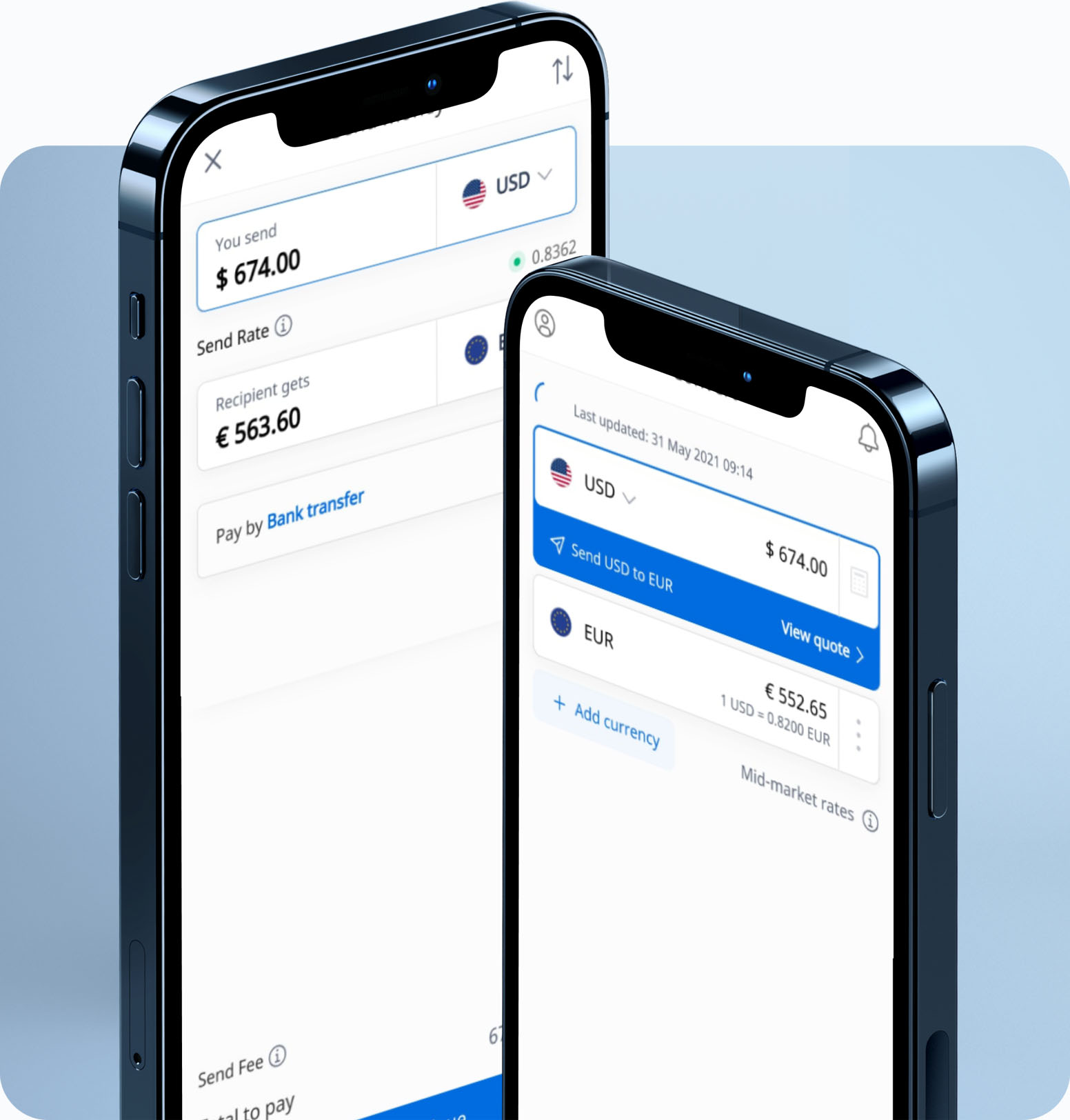
Multiple payment methods to
There are multiple ways to send money to . Depending on your currency selection, you can use your debit card, credit card, a direct debit (ACH) or bank transfer.
Paying for your transfer with a debit card is easy and fast. It’s also usually cheaper than credit card, as credit cards are more expensive to process.
Credit Card
Paying for your transfer with a credit card is easy and fast. Xe accepts Visa and Mastercard. Send money to with a credit card today!

Direct Debit (ACH)
When you use bank debit (ACH) to fund your transfer you are authorising a one-time debit from your bank account to ours. It takes a little more time for your money to reach Xe, and as a result, can delay the speed of transfer.
Learn how to pay with direct debit (ACH)
Bank Transfer
A bank transfer or wire transfer is an electronic payment which sends money directly from one bank account to another. Bank transfers can be slower than debit or credit cards, but they usually give you the best value for your money.
Learn how to pay with a bank transfer
Send money from + countries
Popular destinations.
Send money from Emiratos Árabes Unidos to
Send money from Australia to
Send money from Bahréin to
Send money from Canadá to
Send money from Suiza to
Send money from República Checa to
Send money from Dinamarca to
Send money from Reino Unido to
Send money from Hong Kong to
Are you interested in sending money to ? It's fast, simple and easy.
As part of the Euronet Worldwide family, our customers trusted us last year to securely process over $115 billion worth of international money transfers. With transparent rates and a simple platform, we make it easy to send money abroad.
Money Transfer Frequently Asked Questions (FAQs)
Do you have questions about sending money to ? Read our FAQs to learn more.
It's quick and easy to send money to with Xe.
Sign in to your Xe account or sign up for a free account.
Initiate a transfer to the , and enter the currency you’d like to transfer and the amount.
Enter your recipient’s bank information.
Provide your payment information. We accept direct debit, bank transfers, and card payments.
Confirm your transfer, and leave the rest to us.
Some of our transfers to come with a small fee, depending on the amount you’d like to send and your payment method. We'll let you know about this fee before you confirm your transfer.
You should allow 1-4 working days for your money to arrive in , though many transfers arrive more quickly. Before you confirm your transfer, you’ll see a more exact estimate of when your money will arrive after we receive your funds.
You can send up to $535,000 USD (or the currency equivalent) to online. If you’d like to send more than that, you can contact our dedicated team to arrange a larger transfer.
The best way to for you to send money to will depend on what you’re looking for in a money transfer. The payment method you choose can impact the speed of your transfer, as well as whether you’ll need to pay any extra fees. You can read more about our payment methods here.
Send money directly to friends and family's mobile devices in 35+ countries with Xe.
Mobile wallets provide a fast, secure way to send, store, and receive money. Once we receive payment, the transfer is available in the recipient's wallet app within minutes.
Available to UK, Europe, Canada, New Zealand, and USA customers from app version 7.14.0 and online. Update your app for the latest features.
To send money to a mobile wallet:
Log in to your Xe account online or in the app.
Click 'Send' in the app, or 'Send money' online.
Choose the 'Destination country'.
Complete 'You send' or 'Recipient gets' field.
Select a payment method. For urgent transfers, use debit or credit card.
Choose 'Mobile wallet' as the delivery option.
Provide the transfer reason.
Pay for your transfer.
We'll send the money to the recipient's mobile wallet upon receiving your payment.
Royal Couple Announces Divorce: "Thank You Very Much for Your Respect and Discretion."
Prince Nikolaos and Princess Tatiana of Greece shared news of their separation this week.

"Prince Nikolaos and Princess Tatiana, after fourteen years of living together, have decided to dissolve their marriage," the statement reads. "Both express the difficulty of this decision, the deep appreciation and respect they have for each other, but also the love with which they have walked all these years. The same values of respect and understanding will form the basis of their relationship in the future, a relationship of deep and sincere friendship."
They do not have any children together and plan to "continue to live and be active in Greece, the place they both feel at home."
The statement ended with: "Thank you very much for your respect and discretion."
The news comes just a few weeks after Nikolaos and Tatiana appeared together in the UK for a memorial event honoring Nikolaos's father, King Constantine, the last king of Greece, who passed away at the age of 82 in January 2023 after treatment in an intensive care unit.

Notably, Prince William unexpectedly missed a planned appearance at the service of thanksgiving for his godfather, with the Palace citing a personal matter as the reason. Even though a Palace aide added that Kate “ continues to be doing well ” following her abdominal surgery, William's absence only spurred on rumors regarding Kate's health, speculation which was only put to rest after she announced her cancer diagnosis in a personal video message.

As the digital director for Town & Country, Caroline Hallemann covers culture, entertainment, and a range of other subjects
@media(min-width: 40.625rem){.css-1jdielu:before{margin:0.625rem 0.625rem 0;width:3.5rem;-webkit-filter:invert(17%) sepia(72%) saturate(710%) hue-rotate(181deg) brightness(97%) contrast(97%);filter:invert(17%) sepia(72%) saturate(710%) hue-rotate(181deg) brightness(97%) contrast(97%);height:1.5rem;content:'';display:inline-block;-webkit-transform:scale(-1, 1);-moz-transform:scale(-1, 1);-ms-transform:scale(-1, 1);transform:scale(-1, 1);background-repeat:no-repeat;}.loaded .css-1jdielu:before{background-image:url(/_assets/design-tokens/townandcountrymag/static/images/diamond-header-design-element.80fb60e.svg);}}@media(min-width: 64rem){.css-1jdielu:before{margin:0 0.625rem 0.25rem;}} Royal Family News @media(min-width: 40.625rem){.css-128xfoy:before{margin:0.625rem 0.625rem 0;width:3.5rem;-webkit-filter:invert(17%) sepia(72%) saturate(710%) hue-rotate(181deg) brightness(97%) contrast(97%);filter:invert(17%) sepia(72%) saturate(710%) hue-rotate(181deg) brightness(97%) contrast(97%);height:1.5rem;content:'';display:inline-block;background-repeat:no-repeat;}.loaded .css-128xfoy:before{background-image:url(/_assets/design-tokens/townandcountrymag/static/images/diamond-header-design-element.80fb60e.svg);}}@media(min-width: 64rem){.css-128xfoy:before{margin:0 0.625rem 0.25rem;}}

Princess Diana's Siblings Support Prince Harry

King Charles Attends First Garden Party of 2024

Beatrice Shares a Health Update on Fergie

Meet The Duke of Westminster

The Swedish and Danish Royals Wore Tiaras

Princess Elisabeth of Belgium Is Going to Harvard

Will Harry See Will & Kate This Week?

Prince Harry Won't See King Charles On His Visit

Meghan Markle and Prince Harry Skip the Met Gala

32 Stunning Photos of Royals at the Met Gala

Kate & William "Are Going Through Hell"

IMAGES
VIDEO
COMMENTS
The Euro is the only legal currency used in Greece. It is available in note denominations of €500, €100, €50, €20, €10, and €5. Euro coins come in various denominations. You will find €2 and €1 coins as well as smaller value coins in denominations of 50 cents, 20 cents, 10 cents, 5 cents, 2 cents, and 1 cent. €500 and.
Despite problems in the Greek economy, it's still on the expensive side to travel to Greece. Budget travelers should plan on $50 a day, while mid-range to luxury travelers can expect to pay between $150 to $350 a day, or higher if you plan to visit more than one of its 200 islands. All prices are in US dollars.
Use Wise.com: Wise is a money transfer company based in London that allows you to easily make international transfers and transactions at the international mid-market rate. No more financial surprises when you travel to Greece. Wise.com offers transparency and savings, making your trip a smooth and economical experience.
Official Currency: Greece uses the Euro, which is also the official currency of 19 of the 27 member states of the European Union. The euro system consists of eight coin denominations: 1 and 2 euros, as well as 1, 2, 5, 10, 20, and 50 euro cents. There are also six different notes: €5, €10 , €20, €50, €100, and €200.
Money in Greece. Greek currency: euros. Symbol: €. Currency code: EUR. Greece used to be one of the most affordable destinations in Europe, but its popularity has seen prices rise in recent years. Tourist areas are now more comparable to countries like Italy or France than neighbouring Albania.
Wherever you travel, you need money. When planning a trip to explore multiple islands and archaeological treasures or soak up the sun on a Mediterranean beach, you need to think about how you'll manage your money in Greece.. Our practical guide provides everything you need to know about money in Greece, so you can enjoy Greek culture without worrying about finances and focus on the many ...
The official currency in Greece is the Euro, which is issued and overseen by the Bank of Greece. If you're buying your travel money online you may also see the official code being shown - EUR. In stores and restaurants, Euro prices are likely to use the currency symbol €. Once you're in Greece you'll see costs of items shown in EUR and ...
How Much I Spent During Five Weeks in Greece. Over the course of 35 days in Greece, I spent 4843.34 EUR, or 138 EUR per day. It breaks down like this (prices are in EUR; currently 1 EUR = $1.07 USD): Accommodation: 1531.14, or 43.74 per day. Transportation: 894.68, or 25.56 per day.
Here are my favorite ways to save money when you travel to Greece: Use the Greek salad/bread rule - If the bread cover is .50 EUR or a Greek salad is less than 7 EUR, the restaurant is cheap. If the cover is around 1 EUR and a salad is 7-8.50 EUR, the prices are average. Anything more than that and the place is expensive. use this rule to ...
How much money do I need for a trip to Greece? The average Greece trip cost is broken down by category here for independent travelers. All of these Greece travel prices are calculated from the budgets of real travelers. Category Cost Alcohol 2 € 10 - 29 ($ 10 - 31 ...
Three Warnings about Debit & Credit Cards-- As part of banks' and credit card companies' increasing concern about fraud, it is our experience that they are apt to deny your cards if you go to use them too far out of your normal circuit of use.It's a wise idea to contact your cards' customer service department by phone and inform them of your travel plans.
Here's a detailed breakdown of some of the costs you're likely to encounter while travelling around Greece: Athens: Acropolis and 6 Archaeological Sites Combo Ticket: €35. Athens: Full-Day Meteora Trip by Train: €98. Athens: Delphi Guided Day Trip with Pickup & Optional Lunch: €87.
Using a prepaid travel card. Travel cards allow you to load British pounds, and then transfer them to euros to spend in Greece. You can avoid currency conversion fees for purchases and ATM withdrawals, just watch out for reload fees and ATM fees (some travel cards waive these fees). Travel money cards make sense in a place like Europe.
Generally, 5-15% is considered a fair amount. Another aspect to be aware of is the 'mandatory' tip for tour guides (even free ones). A couple of Euros per hour is about right but again it really depends on how satisfied/rich you feel at the time. Tipping for anything in Greece is not legally necessary.
The plugs, sockets and voltage in Greece are different to many areas of the world. Unless you're coming from somewhere with European appliances you'll need a travel adapter for your device plugs. You might also need a converter so that your items work on the Greek voltage and electrical frequency.
2. There is a limit of how much US cash $ you can take back out with you when you leave. That limit is $500. Therefore if you carry $1,000 with you and spend at least $500 you will be fine. This limit though can be voided if you want to go to the trouble of declaring how much cash you have with you when you arrive at Athens airport.
The currency in Greece is the Euro (EUR). Changing your currency before you jet off couldn't be easier! Don't have time to exchange your cash beforehand? You will find bureaus in most resorts and airports. Cards are accepted in the country's larger resorts, while you may find that small local businesses prefer cash payments.
Top 5 exchange rate need-to-knows. 1. The RIGHT cards consistently beat travel cash rates. 2. Beware charges for using credit cards to buy your travel money. 3. Avoid the debit cards from HELL - some fine you for spending abroad. 4. Don't let bureaux hold your cash for long - you've little protection.
If you're visiting Greece for the first time, you may be curious about the accepted currency and what currency you should bring along on your travels. In Greece, the official currency is the Euro (EUR), which we recommend obtaining by using Revolut's travel debit card to withdraw cash from local ATMs.
12 Ways to Save Money When Traveling to Greece. Greece, the land of history, culture, and breathtaking beauty, is an alluring destination for travelers worldwide. ... By choosing off-peak travel ...
The best way to send money to Greece. Get the most Euro for your currency exchange with fast, secure Greece money transfer by Xe.
With summer fast approaching, there are recently opened hotels and resorts in Greece to consider. From popular escapes such as Mykonos and Santorini to the lesser-known islands across the Aegean ...
The news comes just a few weeks after Nikolaos and Tatiana appeared together in the UK for a memorial event honoring Nikolaos's father, King Constantine, the last king of Greece, who passed away ...
Plus, sign up for CNBC Make It's newsletter to get tips and tricks for success at work, with money and in life. VIDEO 3:33 03:33 What a brain expert eats in a day to boost memory and stay sharp